- Vacation Packages
- Things to Do
- Trips for Me
- Travel Deals
- Vacation Rentals

5 bucket list animal experiences worth traveling for
6 family-friendly fishing destinations to check out now
6 top destinations for a family ski vacation
Things to do with kids in Los Cabos
7 reasons to visit Antalya on your next trip to Turkey
7 essential things to do in Cape Cod
6 useful tips for volunteering while traveling
8 packing tips for your next Disney vacation
8 hotels that are perfect for Thanksgiving
10 must-visit spots along the San Antonio River Walk
The Roaming Gnome’s favorite sweet treats across the U.S.
The perfect Charleston to Savannah Lowcountry road trip
7 resorts that are ideal for an adults-only vacation
8 kid-friendly things to do in Turks and Caicos
11 reasons to make this Punta Cana resort your next family vacation
5 romantic getaways in New England
8 epic trips to make up for your lost year
Best small-town day trips from 7 major cities
Stay in these actually-cool suburbs on your next city escape
Why a cruise is actually the best solo vacation
Best hotels for your next Florida cruise
5 common Caribbean cruise myths—debunked
Posts in category
How to Explore a City You’re Considering Moving To
by Joe Miragliotta | Jan 23, 2019 | 1 comment
Thinking about moving to a new city? Joe Miragliotta of Joe’s Daily shares his best tips on how to make sure you’ll love your new home before you make it permanent.
The reasons behind why people choose to move to a new city are as varied as the types of individuals themselves. Some are following their career path, some fall in love with the place on vacation, and others are just looking for a little variation in their lives. No matter what the cause might be, unless you’re after a very particular kind of adventure, it’s probably a good idea to get a proper feel for what your life would be like in this unfamiliar place before acting. Below you’ll find 7 ways to help you explore a city you’re considering moving to. You can try out a few over a weekend trip or check them all off if you have a little more time to spare. However many you can get to, they’re sure to be helpful in granting some insight into what might just be your new home.
1. Stay where you might be living
As with just about any other kind of trip, a little specific research is going to go a long way. In this case, try to figure out where you might end up living using criteria you would in any other situation. Start with a real estate site to see what you’d be able to afford. After that, factor in things such as where you’ll be working (if you already know, that is), crime, what you like to do in your spare time, where your friends are if you already have some that live there, and anything else that might be important to you. Once you have a few neighborhoods narrowed down, look for a house or apartment there that you can rent for the duration of your trip. Of course, there won’t always be options for exactly where you’re hoping to wind up, but getting as close as you can will definitely be beneficial.
2. Use the same transportation
Keeping in theme with attempting to give yourself as close to an actual living experience as possible, do your best to use the same mode of transportation that you would expect to in everyday life there. Having lived in Los Angeles as long as I have now, I’m still kind of amazed at the number of people that come from places like Chicago and New York and expect to be able to use public transportation as their main means of getting around. Don’t get me wrong, it can be done. Unfortunately, unlike in these other cities, ‘efficient’ is typically not the word you hear used to describe it here. Yes, it can be tempting to just hop into a ride-share vehicle anytime you need to get from point A to point B when you’re on vacation. However, if this isn’t how you’ll actually be doing things, you’re really not doing yourself any favors. So, go ahead, get that transit pass or rent that car —even if it’s just for part of your stay.
3. Plan ‘normal’ activities
It may sound a little boring and maybe even counter to what one would think to do on a trip but, when it comes to the activities you plan on doing, try to keep things as normal as possible. While I wouldn’t suggest running errands or anything of that nature (aside from grocery shopping if you were able to score a place with a kitchen), stick to what you would probably do on an average weekend. Is there a brunch spot good enough to entice you out of bed on a Sunday morning? How about a hiking area or walking route close enough to keep you active? Perhaps a pizza place with great trivia nights or even an arcade bar with just the right amount of people around? The great thing about cities is that there’s always something interesting to do. The key here is to be honest with yourself about what exactly it is you would end up doing once routine sets in. Chances are you’re not going to have any issues finding things you like around, but it’s still important to gauge the environment when you’re looking to make such a big decision.
4. Do your favorite ‘big thing’
Don’t worry, I’m not going to tell you that your visit should be completely low-key. Regardless of how often you do it, most people have a few bigger or more indulgent activities they like to experience every so often. Whether it’s going to see a concert or symphony or renting out an ATV for a day, you want to make sure that the new place is going to at least meet your standards. Though, in the event that it does not, that doesn’t mean it should be immediately written off. As every place is unique there’s a good chance it will have something else available that can scratch that itch. In this case, be patient and see what else is out there before finishing up with this part of your reviewing.
5. Scout why you’re contemplating moving
This one is a little more specific to why you’re choosing to relocate than the others. As I mentioned above, the reasons an individual chooses to make a big move vary from person to person. Your motivation doesn’t need to be the main focus of checking out your potential new city, but it should definitely be worked in. If you were looking to shake things up, take it a step further from just scenery and see if it has new and exciting activities around for you to enjoy; though moving for work might be a little harder to incorporate, at least check out what your everyday commute would be like; and if you were moving because you fell in love on vacation , make sure there are things to do other than what initially grabbed your heart, as you’re sure to become at least a little bored with it after a certain amount of time.
6. Take note of social interactions
Even if you’re making a move that keeps you in the same state, the way people engage with each other can vary greatly from one place to another. There are cities known for being polite, some for being relaxed, others for being aloof, and even a couple known for being direct. It can be easy to overlook the differences from what you’re used to if you’re on a normal vacation. However, after a short time of moving somewhere, they’re difficult to ignore. Make a note to be aware of how people interact with you as well as how they interact with one another during your visit. While I would never tell you that you need to change the way you personally do things, be sure the general atmosphere is one you can abide in. A sensitive person coming from a “polite” area might have a rough time of it somewhere “direct”. That’s not to say that adaptation isn’t possible, but knowing what you’re getting into will usually make things much easier in the long run.
7. Do some wandering
While this admittedly might be more of an activity for once you actually move, if you find yourself with a little free time I would highly encourage you to do a little wandering. It could be in the area you’re staying, a different neighborhood you’re considering, or even just around the block of where you had lunch. As a creature of habit, I’ve been guilty of living somewhere for years without properly investigating what the neighborhood had to offer. Restaurants, shops, galleries, etc. that I would have loved were all at my disposal and I completely wasted the opportunity to enjoy them because I didn’t think to look around. So, even if you’re not going to end up in the place you’re exploring, best to get in the habit now to avoid the same mistakes that I made.
- Latest Posts
Joe Miragliotta
Latest posts by joe miragliotta ( see all ).
- 10 ways to guarantee a magical trip to New Orleans - February 7, 2020
- 7 ways to do a family staycation right - November 11, 2019
- 4 reasons why Banff should be on your bucket list - October 11, 2019
Travelocity compensates authors for their writings appearing on this site; such compensation may include travel and other costs.
Thank you for the appealing read, its not a subject I usually give much attention too but this caught my attention.
Submit a Comment Cancel reply
Your email address will not be published. Required fields are marked *
Book Your Trip
- Flight + Hotel
Get Inspired
Recent posts.
Why some airline refunds take so long
Related Posts
Holiday road trip tips when traveling with a baby or toddler, 15 tips for traveling while pregnant, 8 easy ways to make a last-minute vacation happen, pin it on pinterest.
- Editor’s Picks

- Decor & Styling
- Cleaning & Organizing
- Entertaining

- Self Improvement
- Dating & Relationships

- Advice Column

How to Try Out a City Before Moving There
posted on June 24, 2015 | by Amanda Holstein

I’ve always been someone who loves to travel. You could throw me in a new city without knowing a thing, and the thrill of adventure (along with my iPhone) is all I need. This is probably why moving around to different cities has been a big part of my twenties so far. I grew up outside of NYC, then went off to college in Atlanta, spent the next four years in San Francisco, and have now been in Manhattan for about a year. Well kids, the fun never stops. I’m moving again!
Trying out different regions of the country has confirmed exactly where I belong: California baby! That’s right, I’m heading back. San Francisco has my heart. But before moving back to SF, I’ve decided to try out a new city I’ve never visited: San Diego. My boyfriend and I have been told thousands of times how amazing the lifestyle is in this beautiful city, so we thought we’d give it a try before officially making the move back to the west coast. I don’t look at this as a vacation — I look at it as a sort of “city trial”. We’re going to spend two weeks in San Diego, exploring the city as if we live there, hoping to get an authentic feel for what life could be like. And here’s how we plan to do this:
1. Visit for at least a week
It’s difficult to get a true sense of a city in just a weekend, so I think it’s important to visit for at least a week. A month would be ideal if you’re seriously considering the city but feeling a bit nervous about it. We’ve decided on two weeks and that feels like just the right amount.
2. Talk to locals
Before you make any plans, it can be extremely helpful to talk to people who live (or have lived) in that city. Ask them about the different neighborhoods, what people do on the weekends, etc. Get recommendations for restaurants, coffee shops, markets, etc. — and ask for them as if you’re a resident, not a tourist.
3. Stay in an airbnb
I’m a huge airbnb fan (and no, they didn’t sponsor this post). I think staying in someone’s apartment is a brilliant way to get a true feel for a city. Just the simple act of walking up to your building and putting keys in the door makes you feel like you live there. But beyond that, it’s a great way to get a sense of what apartment living is like there as well. Plus, hotels are often located in very tourist areas, so choosing an airbnb can help give you a better feel for the neighborhoods you’d actually be spending time in.
4. Try out multiple neighborhoods
If you book your stay for at least a week, split your time between multiple neighborhoods. For our trip to San Diego, we’ll be spending the first week in Pacific Beach and the second in North Park. We’ve spoken to a few people who live there and those sound like neighborhoods we’d be interested in living in. Plus, they are pretty different from each other. One is right on the beach and sounds like more of a party area, while the other is inland and more of a trendy neighborhood. I can’t wait to see them both!
5. Create a daily routine
As I said, try your best not to view this trip as a vacation. If you can bring your work with you, that’s even better. I plan to work from San Diego and create a daily routine that mimics my current one. Of course we’ll spend time at the beach, but hopefully in the same way the locals do — after work or on the weekends. We’ll figure it out as we go :).
We’re pretty set on living in San Francisco now while we’re still in our twenties, but we think San Diego could be a great place to live at some point, so why not try it out! (Plus, it’s a great way to see if we’re ready to live together).
Share This Post
- Click to share on Twitter (Opens in new window)
- Click to share on Facebook (Opens in new window)
- Click to share on Pinterest (Opens in new window)

about the author
Amanda Holstein
Hi, friends! I'm Amanda, founder of Advice from a 20 Something. I'm from the east coast, but always felt like a Californian at heart, so I made my way to San Francisco after college and haven't looked back. I have an irregular obsession with dogs, an oversized sweet tooth, and am so not a morning person. Most importantly, I believe we all deserve true happiness and I strive to make this transition into adulthood as easy as possible by creating (hopefully) useful content right here :).
The Advice Column for the Modern Girl.
So you've realized just how difficult your 20s are. Well, you've come to the right place! Let's figure this whole life thing out together.
Never Miss a Post!
From our sister site, the virtual gym i trust for actually achieving my 2021 fitness goals, are you a morning routine person here’s what finally worked for me, advice from: arianna davis, searching for something, how to care for sunburned skin.
More Advice
How to wear leather leggings, last minute halloween costumes all from american apparel, 20 non-traditional graduation outfits, 3 tips for styling open shelving in your kitchen, leave a reply cancel reply.
Your email address will not be published. Required fields are marked *
11 Comments
Bree West Says
Such good tips! I think AirBNB is the absolute best way to get a realistic feel of living in a city!
xo Bree http://bree-west.com
Nicole @ Simply Nicole Says
That’s so exciting! I visited my cousin in San Diego twice in college and loved it both times. She lived in Pacific Beach. IT IS GORGEOUS.
Now she lives in Mission Valley (?) I think… someplace closer to the airport.
You’re going to love it there. I wish I could move there!
Great post! AirBNB would definitely give you a much more realistic idea of the city versus staying at a hotel!
Enjoy San Diego! It’s a great city. I recommend going to La Jolla for brunch and a walk along the beach. Brick and Bell is great for coffee and pastries and The Cottage is wonderful for an indulgent brunch.
Or dinner at Herringbone!

Amanda Says
Oooo thank you SO much for the tips! Can’t wait to try out those places!
Christina Says
I’ve been thinking about trying a new city lately – will definitely keep these tips in mind :)
Thanks for sharing,
Christina | http://www.cuddlepill.com
Barbora F. Says
This is such a unique, thoughtful and helpful article. It was never easy for me to decide moving to a new city just because someone recommended it as a good place to live. I’m pretty sure I will use your method for the next time I decide to relocate. Thanks for the amazing and helpful read. Sharing it on fb right away! I’m sure everyone will love it as I did.
Stacey Says
Do you recommend apartment hunting while visiting the new city?
This is an old post but I stumbled upon it because I’m seriously considering moving to San Diego! Going to rent an airbnb for 3 weeks….It’s a sign because I had no idea you were actually talking about SD! <3 Great advice!
Pingback: Moving House: Hacks to Help You Have a Smooth Move | Tilly Button
Henry Killingsworth Says
I like how you mentioned that it can be helpful to talk to people who live in the city before you move there. In addition to that, it could be a good idea to go on some kind of local tour. The local tour would help you learn more about the history of the city.
@Advicefroma20something on Instagram
Never miss a post, let's get social, the advice column for the modern woman..
- Privacy Policy
Branding By Spruce Rd. | Website By The Curio Co.
All content copyright 2024, Advice From a 20 Something.
College Info Geek
How to Move to a New City (From Start to Finish)
C.I.G. is supported in part by its readers. If you buy through our links, we may earn an affiliate commission. Read more here.
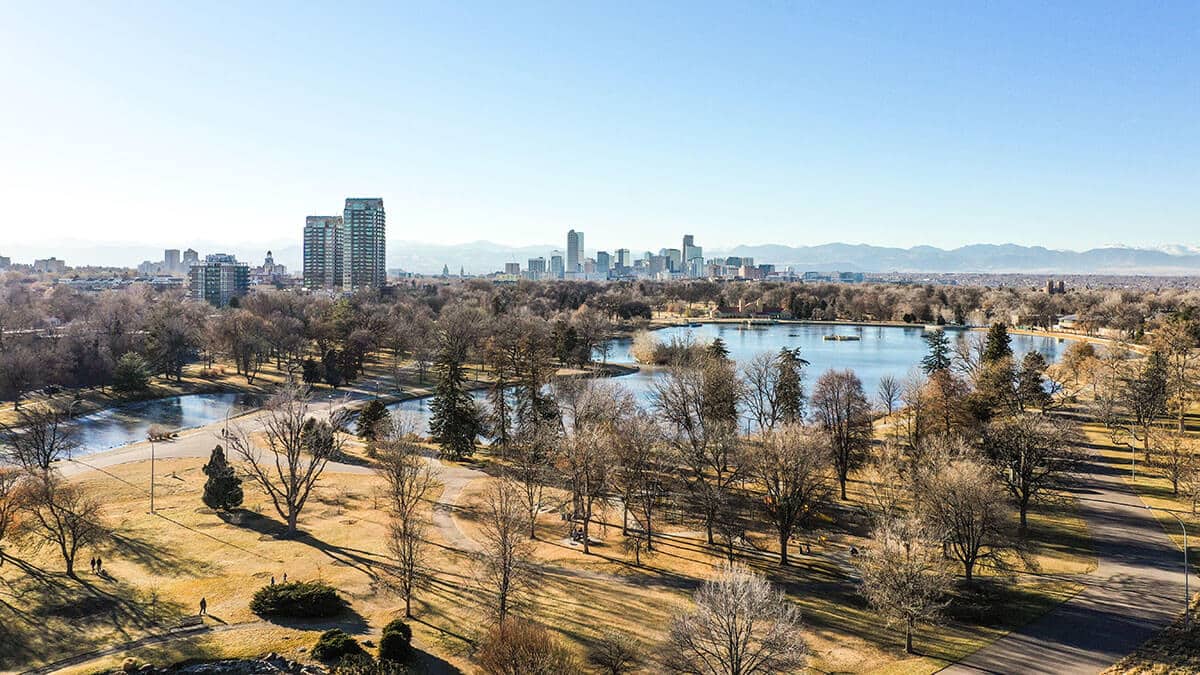
In February 2019, I moved from Nashville to Denver. I’d wanted to move here ever since I visited back in March 2017, and now it had finally happened.
It was the first major, permanent move I made after graduating college, and I learned a lot. This got me thinking about how there aren’t any detailed, step-by-step guides about how to move to a new city.
Sure, there are articles on certain topics, but there isn’t a one-stop guide that walks you through the entire process of moving.
So I decided to create one.
Below, I’ll walk you through how to move to a new city from start to finish. We’ll cover everything from choosing a city to finding an apartment to figuring out how to get all your stuff to your new place.
Note: Most of this guide assumes that you’re single and living in the United States. Much of the same advice will apply for moves in other countries and if you’re moving as a family, but I have less experience with these circumstances.
Where Should I Move?
Before you can move, you need a destination. In many cases, someone else will make this decision. The most common case is if you’re moving for a new job, but you could also move for family reasons.
If you’ve already decided where to move (or if someone else has decided for you), then you can skip to the next section . But if you know that you want to move and are trying to decide where to go, keep reading.
Let’s say you’re a recent college graduate, and you want a change of scene. You’re tired of your home town, and you want to experience something new. How do you decide where to go?
There are many factors to consider; here are some of the most important:
What size city do you like?
The size of a city will have a huge impact on how you experience it.
Some people find large cities stimulating and exciting. Others find them stressful and overwhelming. And the same goes for smaller cities: one person’s “quaint small town” is another’s “boring middle of nowhere.”
So be sure to look at the size of the city before you move there. This means looking at both the population numbers and the physical land area of the place.
The physical size of the city is especially important when considering what your commute will be like and how you’ll get around. In a dense city like New York, for instance, you can get almost anywhere with public transit. In a sprawling metropolis such as LA, on the other hand, owning a car is basically a necessity.
My favorite resource for finding out the size of a city is Wikipedia. Just type in the city name and then scroll down to the box on the right. Or just google “population of [name of city].”
What kind of climate do you like?
The climate was one of the main reasons I moved to Denver. The sun gives me lots of energy, and I dislike harsh, dark winters. I also wanted to get away from the oppressive humidity of my native Nashville. Therefore, Denver was a logical choice.
Many people don’t consider the local climate when choosing where to move, but it has a huge impact on your daily life. The climate affects what clothes you’ll need, what kinds of activities you can do in different seasons, and even your mood.
So be sure to consider both what kind of climate you prefer and what the climate is like in the cities you’re considering. If these two don’t align, the city might not be a good fit.
To learn more about the general climate of a place, I recommend doing a quick google search on “[name of city] climate.”
How’s the job market?
Unless you work remotely , you’ll need to find a job in your new city. Therefore, you should consider what the job market is like before you make a move.
But be sure you don’t just look at the “overall job market.” This is mostly meaningless. Instead, examine the job market for your particular skills and interests. For instance, if you have a background in publishing, a city like NYC is generally going to be a better fit than San Francisco.
To get a sense of a place’s job market, you can research the largest industries there. You can also take a look at job boards to see how many postings there are for jobs that interest you. And be sure to consider how competitive the job market is — you don’t want to end up competing for a few jobs with a large number of other recent transplants.
What’s the cost of living?
The cost of living massively affects how you live your daily life. It determines where you live, as well as what you do for fun. And it even has longer-term impacts, such as when you can retire and how many children you may decide to have.
So how can you find out the cost of living for a city? My favorite resource is the website Expatistan .
It’s meant to help digital nomads or other expats figure out how much money they’ll need to afford a particular city. But you can also use it to get a rough idea of a place’s cost of living, all based on real data from users.
For instance, here’s some of the cost of living data for Austin, TX :
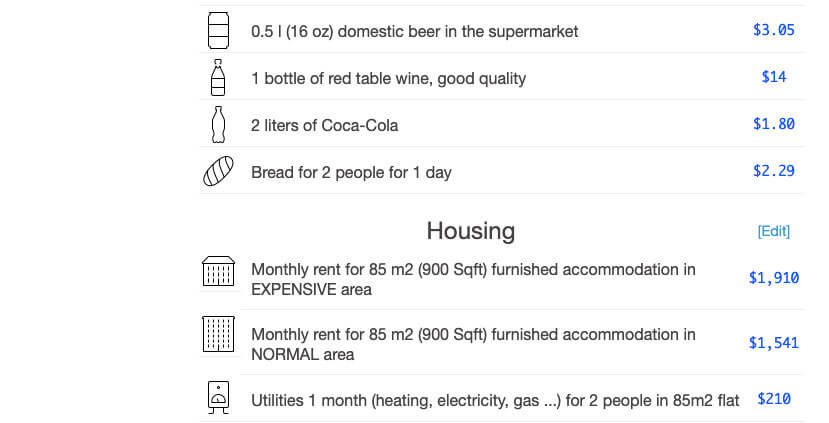
In addition to the cost of living for a specific city, Expatistan can show you how the cost of living compares between two cities (such as between where you currently live and where you want to move).
For instance, here’s a comparison of the cost of living between Denver (where I currently live) and Chicago (another city I love).
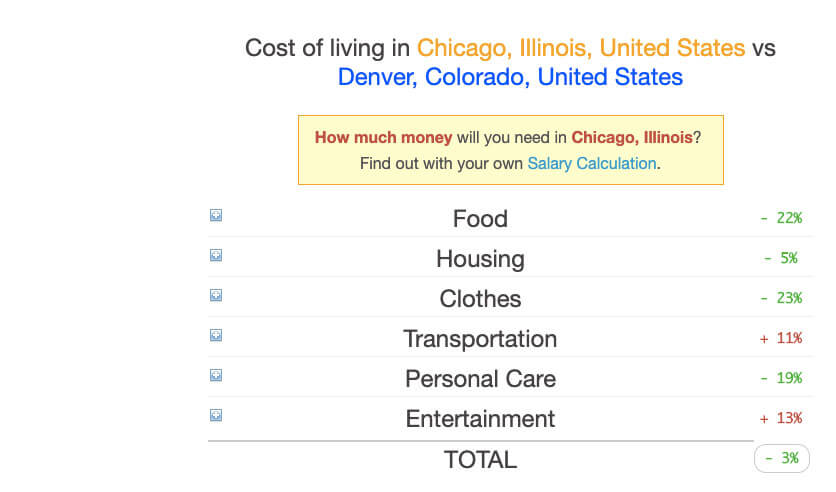
You can play with this tool to figure out if you can afford to live in the city you’re interested in. You can also use it to decide if you can live on the salary that a particular job is offering you.
What connections do you have in the city?
Moving to a new city where you know no one can be exciting, but it can also be frustrating and isolating. While it’s fine to move somewhere without knowing anyone, having a few connections on the ground can be helpful.
To start, knowing someone who lives in the city can make it easier to find housing and a job. Without these connections, it can take longer to find both. For instance, Thomas was able to help me choose a neighborhood in Denver that would suit my preferences (since I was unfamiliar with the neighborhoods of the city).
Beyond that, there are social benefits to already knowing people. They can introduce you to their friends, who can then end up becoming your friends. Without these initial connections, making friends can take longer (though you can still do it!).
If you don’t know anyone, don’t let that stop you from moving to a city. But just be aware that the process will be trickier.
What do you value in a city?
This last question may be the most important of all. The truth is that there’s no such thing as the “best city to live in.” The best city for you will be different than the best for another person, and it all comes down to what you value in a city.
For instance, I value living in a city (and neighborhood) where I can get around mostly via walking, biking, and public transit. So a sprawling city such as Los Angeles would be the last place I’d want to move.
But that’s just my preference. Someone else might value the huge variety of opportunities in LA and not mind having to drive everywhere. Therefore, LA would be a great choice for them.
Here are some qualities to consider when deciding what you value in a city:
- Networking opportunities
- Work/life balance
- Access to outdoor activities
- Activity/busyness
- Conservative/liberal
- Walkability vs. drivability
- Airport access/reach
But how can you evaluate these qualities in a city if you haven’t been there? Well, I would advise you to visit anywhere that you’re seriously considering moving to.
But before you visit (or if visiting isn’t practical), I recommend you look up the city on Nomad List . It’s a resource that exists to help digital nomads decide where they should go next. But you can also use it to get a sense of what a city is like (and if you’d like it).
For each city on their list, Nomad List displays several “scores” for different qualities such as cost, internet speed, nightlife, and more. For instance, here are (some of) the scores for San Francisco :
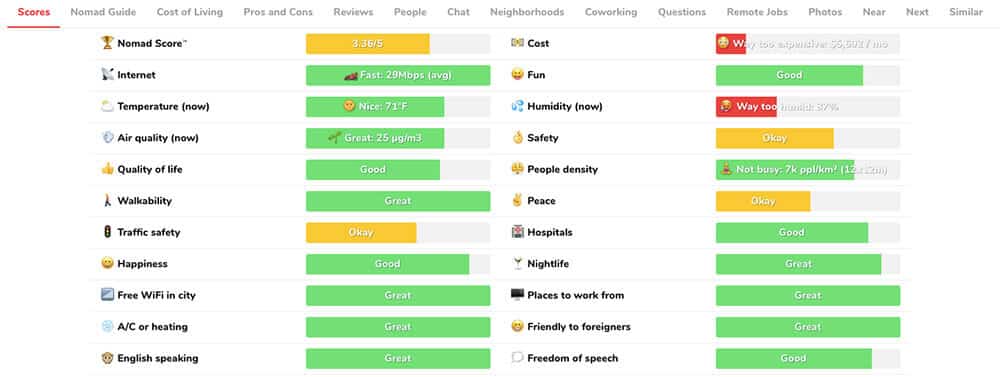
You can also view a “Pros and Cons” list for each city. Here are the pros and cons for San Francisco :
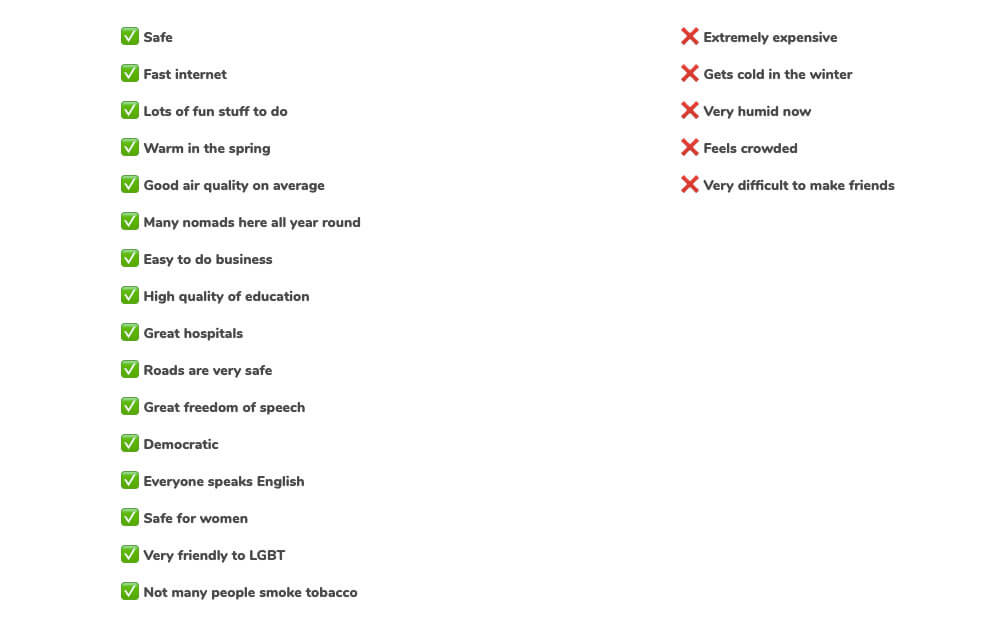
Finally, Nomad List will show you detailed data about a city’s cost of living :
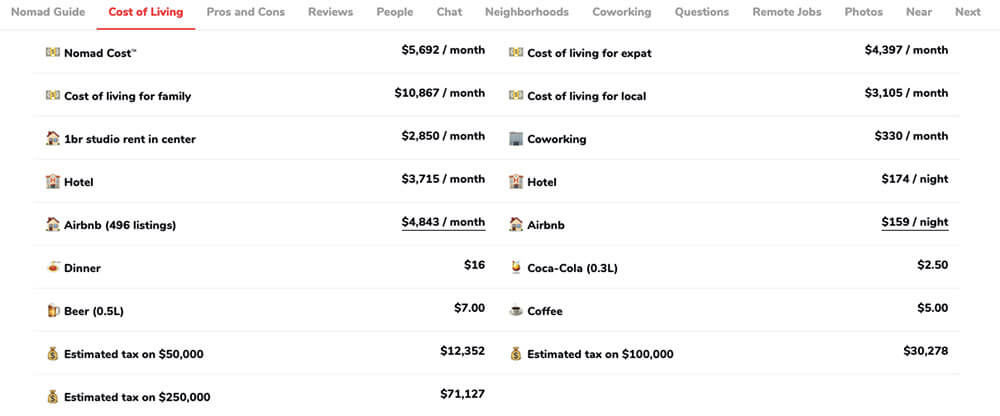
How to Move to a New City in 7 Steps
Now that you’ve decided what city you want to live in, let’s look at the process of getting yourself there. I’ll start with choosing a neighborhood, move on to finding an apartment, and then end with getting yourself set up in your new place.
1. Pick a Neighborhood
Your first task after you’ve decided where to move is to pick the neighborhood you want to live in. This will make it much easier to find an apartment; otherwise, you’ll have to sort through hundreds of options all over the city.
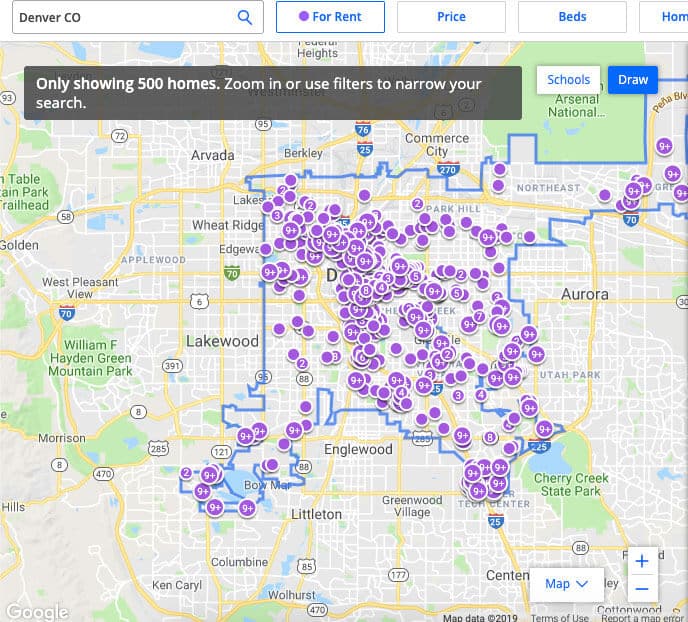
So how do you choose a neighborhood? Similar to picking a city, you need to decide what you value. Here are some things to consider when picking a neighborhood:
- Distance to your work (unless you work from home)
- Overall cost of living
- Walkability
- Proximity to public transit
- Ease of parking
- Activity level (busy vs. sleepy)
- Proximity to parks/green space
- Proximity to entertainment/recreation
- Type of housing available (houses vs. apartments)
- General neighborhood vibe/culture
So how can you learn about all of these things without visiting the neighborhood? Here’s the process I like to use:
- Google “best neighborhoods in [name of city].” From there, you can get a general sense of what the neighborhoods are like.
- Use Walk Score to evaluate the walkability and transit access of the neighborhood (this may not matter to you if you mostly drive, but it’s still worth knowing).
- Look at the neighborhood on Google Maps. Check both satellite and street view to see amenities such as parks, what the houses and apartments look like, and what sorts of businesses are nearby.
- In addition to these resources, I like to visit the subreddit for the city and look at the FAQ for people moving. This often includes information about the different neighborhoods. Here’s the one for Denver to give you an idea of what I mean.
When choosing a neighborhood, you also need to recognize that there’s no such thing as the “perfect” neighborhood. You’re going to have to compromise on at least one thing, and probably several.
For instance, I wanted to live in a neighborhood that was highly walkable and close to nightlife and shopping. I got this with my current place, but it did come with some tradeoffs.
To start, the apartment is small (470 sq ft) and costs more per square foot than a place out in the suburbs. Furthermore, the area around the apartment building can get quite loud due to the nearby construction during the day and people hanging out at nearby bars during the night.
In your own neighborhood search, you’ll have similar tradeoffs. The key is to keep your expectations realistic and prioritize the essential things. You can always move to a different neighborhood later if your priorities change.
2. Search for Apartments Online
Once you’ve picked a neighborhood (or a few that interest you), you can start looking at apartments. Thankfully, the internet has made this much easier than it used to be. You can now get a pretty good idea of what a place is like without even touring it.
To start your apartment search, use an apartment-hunting website. There are quite a few sites out there, but I’ve found that most of them list more or less the same apartments.
In general, therefore, I stick to Zillow and Apartments.com when looking for places to live. They don’t overlap too much, are easy to use, and allow you to filter based on things such as price, number of bedrooms, and amenities.
Speaking of which, before you go on any apartment hunting website, you need to come up with an apartment wish list. This will help you guide your search and ensure you don’t go over budget.
Here’s what to include on your list:
- Price (this should be no more than ⅓ of your monthly income)
- Size of apartment
- Layout of apartment
- Number of bedrooms
- Number of bathrooms
- Amenities (pool, gym, security, rooftop, balcony, etc.)
Once you have this information, you can plug it into an apartment-finding website and see what results you get.
For instance, let’s say I’m looking for a 1-bedroom, 1-bath apartment in the Capitol Hill neighborhood of Denver. I’d also like to have a pool and pay no more than $1,500 a month.
Here’s what I get when I plug all of this information into Zillow:
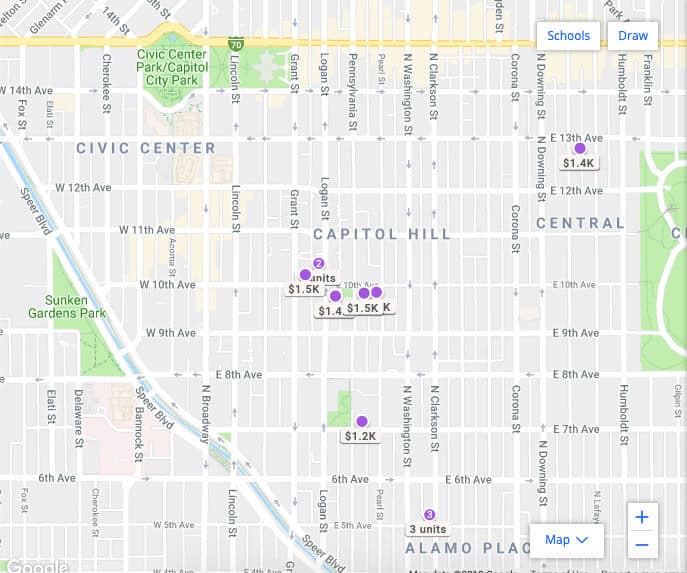
Looks like I have a few options, and now I can click on each to learn more.
3. Tour Some Apartments
Once you’ve found some places you like, the next step is to set up a tour. This is a crucial part of the process; do not skip it. While rental sites have gotten pretty good at catching scams, photos and descriptions can still be misleading.
To set up a tour, you can either contact the property through the apartment-finding website (they usually list contact details) or use the contact information on the apartment complex’s website. For quickest results, I recommend calling the place on the phone; emails tend to get buried.
During the tour, be sure to ask the leasing agent/property manager/landlord any questions you have. It’s their job to answer these questions, so don’t be afraid to come with a list.
Also, evaluate the property with a critical eye. Look for any damage, neglect, or other problems. If the listing isn’t the way it was described online, ask the person giving the tour why that is. There could be a legitimate reason, but it could also be a serious red flag that this isn’t the place for you.
4. Apply to Apartments
After you’ve toured a few places, the next step is to apply.
If you’ve never rented your own place before (or if your parents co-signed with you on the place you lived in college), this process can take some getting used to.
Here’s what you’ll generally need to include in an apartment application:
- Proof of your income — If you’re currently employed, you can use your paystub. If you aren’t, then you can use your bank statements (to prove you have sufficient savings). You can also use any offers of employment you have (which is useful if you’re moving for a new job but haven’t started it yet).
- Driver’s license number and social security number — The landlord will use these to do a credit and background check.
- References from previous landlords — If you haven’t rented before, then ask if you can use some kind of “character reference” (such as a family friend or former employer).
You should hear back about your application within a couple of days at the most. If you’re approved, then you can move on to the next step. If you aren’t, then you can go back to the apartment-hunting process I described above.
Note that it can take some time to find an apartment. Because of this, I recommend arranging somewhere else to stay while you look.
This could be an Airbnb, a hostel, or even a hotel. If you’re moving for work, your employer may be able to reimburse you for these costs (this is generally called “relocation assistance”). You can also stay with friends or family if you have any in the place you’re moving.
5. Figure Out How You’ll Move Your Belongings
So you’ve found your apartment, but now comes the task of moving all of your things to your new place. This can be intimidating, but it won’t be that bad as long as you plan.
As I see it, there are three basic options for moving your possessions:
- Drive them in your personal vehicle.
- Rent a moving truck or trailer.
- Ship your stuff in a container.
Each of these options has pros and cons:
- Using your personal vehicle is the cheapest option , but it requires you to have a car that’s big enough to hold all of your stuff. So if you have a Honda Civic, this may not be the best option unless you’re moving without much furniture.
- Renting a moving truck gives you more space, but it isn’t free. Plus, you have to pack and drive a large truck, which you may or may not feel safe doing.
- Shipping your stuff in a container is convenient, but also not free. Furthermore, your stuff could be stuck at a storage facility for a week or two before it can be delivered to your new place.
None of these options is better than the others. You just have to decide which is best for your situation.
In my case, putting my stuff in a container was the best option in terms of price and logistics. I don’t own a car, and I calculated that it would be cheaper to put my stuff in a container once I factored in gas.
However, I was also moving halfway across the country, which made basically every part of the process more expensive.
6. Get Your Apartment Set Up
Once you have your apartment and have moved yourself and all your stuff to it, it’s time to get your new place set up.
To start, you have the obvious steps of unpacking boxes and moving in your furniture. If you know some folks in town, there’s no shame in asking for their help (offer to buy them dinner or drinks as a thank you).
Otherwise, you may need to hire help. You can either contact a local moving company, or you can use an app such as TaskRabbit to hire someone for a couple of hours. If you’ve rented a moving container or truck, the company you rent from may also be able to set you up with help from a local moving company.
After you have everything moved in, you’ll need to figure out how you want to lay out your apartment. You may also realize that you need some additional things to make the place livable. This could be anything from a new bed to some decorations for the walls.
To find these things, I use a combination of Amazon , Wayfair , and IKEA . You can also check local thrift stores, Craigslist, and Facebook Marketplace for bargains.
Aside from the physical items in your apartment, there are also services you’ll need to set up, including:
- Internet — Be sure to compare the different companies in your area to find the best rate.
- Utilities — Depending on where you’re living, you may need to set these up with a separate company, or they may be billed along with your rent.
- Rent payment — Many landlords and apartment complexes now let you pay your rent online. If this is an option, I highly recommend you set your rent to auto-pay so that you’re never late. If you can’t pay your rent online, be sure to set a recurring calendar reminder to send your landlord the rent check each month.
- Renter’s insurance – Most landlords and apartment complexes require you to have this. And even if they don’t, you should still get it. Learn why you must get renter’s insurance .
7. Establish Yourself in the New City
Everything is now set up with your apartment, but there are still a few more things to do before you can settle into life in the new city.
Don’t forget to do these things:
- Bank account(s)
- Credit card(s)
- Online subscriptions
- File a change of address with the Post Office
- Notify the DMV in the state you moved from (if your state requires this)
- Get a new driver’s license in the state you moved to (many states require you to do this within 30, 60, or 90 days of moving)
- Register your car in the new state (again, many states require you to do this within 30, 60, or 90 days of moving)
- Register to vote in the state you moved to (you can generally do this when you get your new driver’s license)
It’s easy to overlook the items above, but you can get into legal trouble if you don’t do some of them promptly (particularly updating your vehicle registration). So be sure to make them a priority.
How to Budget for a Move
I hope reading this article has made you realize that moving can be expensive . Depending on where you’re moving and what you take with you, your move could cost anywhere from a few hundred to a few thousand dollars.
Instead of just saying, “I’ll worry about how much it will cost later,” I recommend budgeting your moving costs beforehand. This way, you’ll know how much money you need to save before you can move.
At minimum, I recommend you budget for the following moving expenses:
- Cost of moving your stuff (truck rental, container rental, or gas for your vehicle)
- Cost of hiring movers (if necessary)
- Apartment security deposit
- Apartment application fees
- New furniture and other things for your apartment (if applicable)
- Accommodation while you look for an apartment (if necessary)
To keep track of your costs, just put them in a spreadsheet. Here’s an example of the moving budget spreadsheet I created before I moved to Denver:
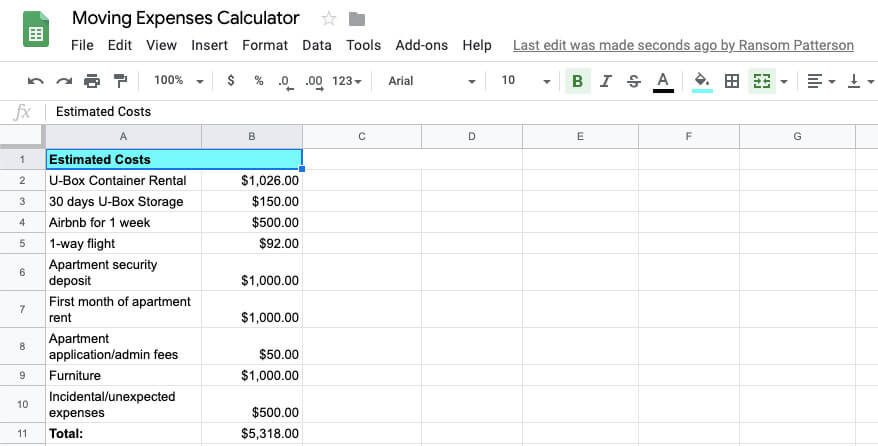
If you’d like to adapt this spreadsheet for your own move, you can access it here . Just go to File > Make a copy to get a version you can edit.
Note that in addition to my estimated costs, I also budgeted an extra $500 for “incidental/unexpected expenses.” If you can, I highly recommend this. Moving is full of surprise expenses, and it’s better to set some money aside to cover them than to end up in a tight financial spot later.
Finally, you may need to have a higher moving budget if you’re moving somewhere without a job already lined up. In this case, you’ll need to make sure you have enough savings to cover all of your basic expenses for a few weeks or months while you find a job .
Need some extra money to pay for your move or cover your expenses while you find a job? Check out our guide to making an extra $1,000 a month .
How to Quickly Make Friends in a New City
One of the biggest struggles many people face when moving to a new city is making new friends. Once you’re out of college, making friends definitely requires more deliberate effort. But you can still do it, as long as you know the right process.
Here are my top suggestions for making friends quickly in a new city:
Join a local sports league
I’ll admit I haven’t done this myself, but if you enjoy team sports, then this is a great way to meet lots of new people (and hang out with them regularly).
Go to events related to your interests
Use sites such as Meetup , Eventbrite , and Facebook to find local events related to what interests you. These are great places to make friends, as you already have something in common with other attendees.
Go to Reddit meetups
If you’re on Reddit, there’s likely a subreddit for the city you moved to. See if they have any meetups in your area. In Denver, for instance, there’s a group that meets every Wednesday to play boardgames .
Join a climbing gym
Climbing gyms continue to pop up all over the country, and they can be great places to meet people. Climbing is a social sport, and it’s easy to strike up a conversation with someone if you’re both working on the same route. Plus, many climbing gyms host events where you can meet even more people.
Hang out at breweries
I’ve made several friends in Denver just by consistently hanging out at the same neighborhood brewery. This is a time-honored way to meet people, and it still works today.
Hang out at coffee shops
In a similar vein to breweries, coffee shops can be a great place to hang out and meet people. Just be sure to pick a coffee shop that isn’t (completely) full of people wearing headphones and working on their laptops.
Many coffee shops also have bulletin boards where you can find out about more local events and meetups.
Make friends in your apartment complex
Sometimes, making new friends is as simple as saying hi to your neighbor or that person you always see in the laundry room. You can also go to those random events your apartment complex always sends you emails about.
Make friends at your office
You spend 8 or so hours a day with the people at your office, so it’s a pretty logical place to make friends. This is why it’s worth going to that work happy hour or company party, even if you’re tired.
Making friends is a process
I don’t recommend doing everything on the above list (at least not all at once). You’ll need to experiment with which techniques work best for you. If you’re shy, then I highly recommend starting with structured activities (sports leagues, meetups, and events).
How to Find a Roommate
In many cities, housing is just too expensive to live by yourself. Therefore, you’ll need to find a roommate.
I’ve left this until the end because finding a roommate presents many additional challenges beyond just finding an apartment.
If you do it correctly, though, it can save you a lot of money and help you make new friends.
Here’s how to find a roommate in a new city:
Join local roommate-finding Facebook groups
Many cities have Facebook groups to help people find roommates. The postings tend to be more legitimate and less sketchy than those on Craigslist, though you should always be cautious.
Check out roommate-finding subreddits
Big enough cities usually have a section of their subreddit where you can post (and respond to) “seeking roommate” ads. As with Facebook, be cautious of scams and sketchy people.
Use a roommate-finding website
In researching this article, I discovered a couple of services specifically for helping people find roommates:
- Roomie Match helps you find a roommate that fits your needs. They have a dedicated team who reviews all postings in order to kick out scammers and creepers.
- Roomi is an app for finding both roommates and sublets. You can even have your profile verified through a background check to increase your chances of finding a legit roommate.
Ask around your office
Your new co-workers may well know someone in need of a roommate (or need one themselves). Just avoid sounding creepy or desperate.
Inquire with your local alumni group
Many colleges and universities have alumni groups across the country (and world). Post in the group’s Facebook group, listserv, or other message board to see if you can find anyone else in search of a roommate. Just make sure this doesn’t violate the group’s rules.
Reach out to your network
Even if you don’t know someone in the city who needs a roommate, it’s very possible that friend of a friend or family member does. You can put out a general post on the subject on social media, and you can also reach out directly for more tailored assistance.
Prepare to be without a roommate
Even if you do all of the above, it’s still possible that you could end up without a roommate for a few weeks or months. Because of this, I recommend having enough savings before you move to afford a place to stay while you find roommates. Even if that just means staying in a hostel.
Moving Is a Great Adventure
With all of the planning and chaos of moving, it’s easy to forget to be excited. I hope this guide has helped make your move a bit smoother, but I want to remind you that moving to a new city is a massive opportunity.
There will be struggles, but there will also be new friends, new experiences, and lots of excitement. Don’t forget to stop for a moment and take it all in.
And remember: if things don’t work out, you can always move somewhere else.
Image Credits: City Park
10 Things You Should Do Before Moving to a New City
By anna green | feb 16, 2016.

Whether you’ve got your heart set on moving to the Windy City, the Big Apple is calling your name, or you’ve been offered your dream job a thousand miles from home, there are some pretty important things to think about before you relocate to a brand new city. You’ve made the decision to pack up and move, but you're not ready to step on the plane until you've checked these 10 things off your list.
1. RESEARCH THE COST OF LIVING...
It’s important to know how far a dollar stretches in your new city, so research housing, transportation, healthcare, and food prices in order to create a realistic budget. For starters, you can use a cost of living calculator like the Bankrate calculator , which lists the average prices of everything from housing to recreational activities and household supplies. But it’s also a good idea to do your own research by looking at online housing listings, gas prices, and even restaurant menus.
2. ... AND SEE HOW YOU STACK UP.
If you already have a job lined up, calculate how your new salary will affect your daily budget and your ability to save money. (If you're moving from Portland, Oregon, to New York City and your salary isn't increasing, for instance, you may need to tighten your purse strings .) If you don’t have a job yet, it’s crucial that you figure out how long your savings will last you and how long you can go before you find a job (experts recommend having a minimum of three months savings).
3. RESEARCH YOUR JOB OPPORTUNITIES...
Look into job opportunities in your new city and start applying before you move. Get a sense of the city’s major industries and what kinds of jobs are available. If you haven’t yet set a moving date, find out if there are normally more job openings during a certain time of year (since some industries hire seasonally), and make sure you have a concrete job hunt plan : What companies do you plan to target? What connections do you have? If you’re looking for retail or part-time work that’s difficult to apply for remotely, make a list of local business and pay attention to location. If all of the businesses you think sound promising seem to be in one area, look for housing in that area, too.
4. …OR LEARN MORE ABOUT YOUR FUTURE COMPANY.
If you’re moving for a new job, do a little research on the company. Do they offer relocation benefits ? Some companies will help with moving expenses or help you find housing. It’s also a good idea to learn more about corporate culture, job expectations, and work/life balance.
5. MAKE SOCIAL AND PROFESSIONAL CONNECTIONS.
Take stock of friends, acquaintances, and distant family in your new city. Use your alumni network and past or present work connections to find social or professional connections. Reaching out to friends of friends for a coffee or lunch date is a great way to start—and while it may sound cheesy, a simple Facebook post asking for introductions often gets the ball rolling.
6. EXPLORE THE CITY AND LEARN ABOUT ITS NEIGHBORHOODS.
If you can’t visit before you move, learn the lay of the land from afar. Before you choose a neighborhood to live in, find out what areas are residential and commercial, whether certain neighborhoods are considered dangerous, and which areas have the kinds of features you’re interested in. If you’re outdoorsy, get a sense of where the parks are; if you’re into music and nightlife, make sure you know where those venues are before you move. Websites like Yelp , City Data , and Crime Reports can help you get a sense of your new city before you move. If you are able to take a trip, try booking an Airbnb in your new location instead of staying in a hotel; you'll get a better sense of what it feels like to live there.
7. LEARN ABOUT TRANSPORTATION OPTIONS.
Decide whether you’ll be driving a car or using public transportation to get around. If you’re planning on keeping a car in the city, find out what your parking and storage options are. If you’ll be relying on public transportation, get a sense of the neighborhoods that have the best service. If possible, do a little research on which bus or train lines are considered the most reliable, and how frequently each one runs, so you don’t get stuck living somewhere with a single bus that comes once a day.
8. GET RID OF UNNECESSARY POSSESSIONS.
When we think about moving, we tend to focus on the place we’re going to more than the one we’re leaving. But there’s a ton of work to do before you leave. One way to make the move a little easier is to get rid of anything you don’t need. Have a yard sale, donate old clothes to charity, or sell things online. Symbolically, you’ll be getting rid of the old to make room for the new. But, more practically, you’ll have less stuff to schlep with you when you move.
9. MAKE A LIST OF GOALS.
Make sure you know exactly why you’re moving and what you’re hoping to achieve. It’s easy to lose focus in the chaos and excitement of setting up a new life once you actually move, so it’s a good idea to make a list of your personal and professional goals before you pack up and leave.
10. SAY GOODBYE.
Throw a goodbye party, have a get-together, or just make sure you say a proper goodbye to the important people in your life. Not only will it help you leave your old city on good terms, but it might unexpectedly reveal connections and opportunities in your new one.
Explore Jobs
- Jobs Near Me
- Remote Jobs
- Full Time Jobs
- Part Time Jobs
- Entry Level Jobs
- Work From Home Jobs
Find Specific Jobs
- $15 Per Hour Jobs
- $20 Per Hour Jobs
- Hiring Immediately Jobs
- High School Jobs
- H1b Visa Jobs
Explore Careers
- Business And Financial
- Architecture And Engineering
- Computer And Mathematical
Explore Professions
- What They Do
- Certifications
- Demographics
Best Companies
- Health Care
- Fortune 500
Explore Companies
- CEO And Executies
- Resume Builder
- Career Advice
- Explore Majors
- Questions And Answers
- Interview Questions
How To Move To A New City
- How Long Does It Take To Find A Job
- How To Find Internships
- How Many Internships Should I Apply To
- Networking Email
- Foreign Service Exam
- Working Abroad
- Organize Your Job Search
- How To Find A Second Job
- How To Get A Job In A New City
- Fun Facts About Me
- Job Search Burnout
- How Old Do You Have To Be To Work?
- Job Review Sites
- How To Become A Freelancer
- How To Ask For A Job
- Can I Pick Your Brain?
- Moving To A New City
- Getting a Headshot
- Professional Portfolio
- Professional Photo
- Career Choices
- Self Assessment
- Job Outlook Definition
- Careers With Animals
- Career Aptitude Test
- Career Test
- Personality Tests
- How To Find A Job You Love
- I Don't Know What Job I Want
- Career Change At 40
- What Is An Externship
- Lateral Career Move
- How To Get Into Voice Acting
- Small Business Ideas For Teens
- What Am I Good At?
- Linkedin Summary
- Best Linkedin Profiles
- Linkedin Headline
- Linkedin Easy Apply
- Free Linkedin Backgrounds
- Linkedin On Resume
- Linkedin Profile Tips
- How To Use LinkedIn For A Job Search
- How To Add Skills On LinkedIn
Find a Job You Really Want In
It can be freeing and exhilarating to pick up your life and move somewhere new. Unfortunately, it can also be one of the more expensive and stressful experiences of your life.
There’s a lot involved with moving to a new city , and if you want to avoid a nightmare situation, it’s going to take a lot of planning and being proactive on your part.
In this article, we will go over everything you need to know before your move, how to move, and what to do after you move. We will also go over how to find a new job in a new city to help you with your transition.
Key Takeaways:
Before moving to a new city it’s important to research the city you want to move to, visit before moving, and check out a few apartments before signing a lease.
Hiring a moving company can help easy any stress of moving.
After you move, you should find out about your new neighborhood and get out of your comfort zone and try new things.
When looking for a new job in a new city, you should do research on the position, remote your location from your resume , or get a seasonal job once you get there until you find what you want.
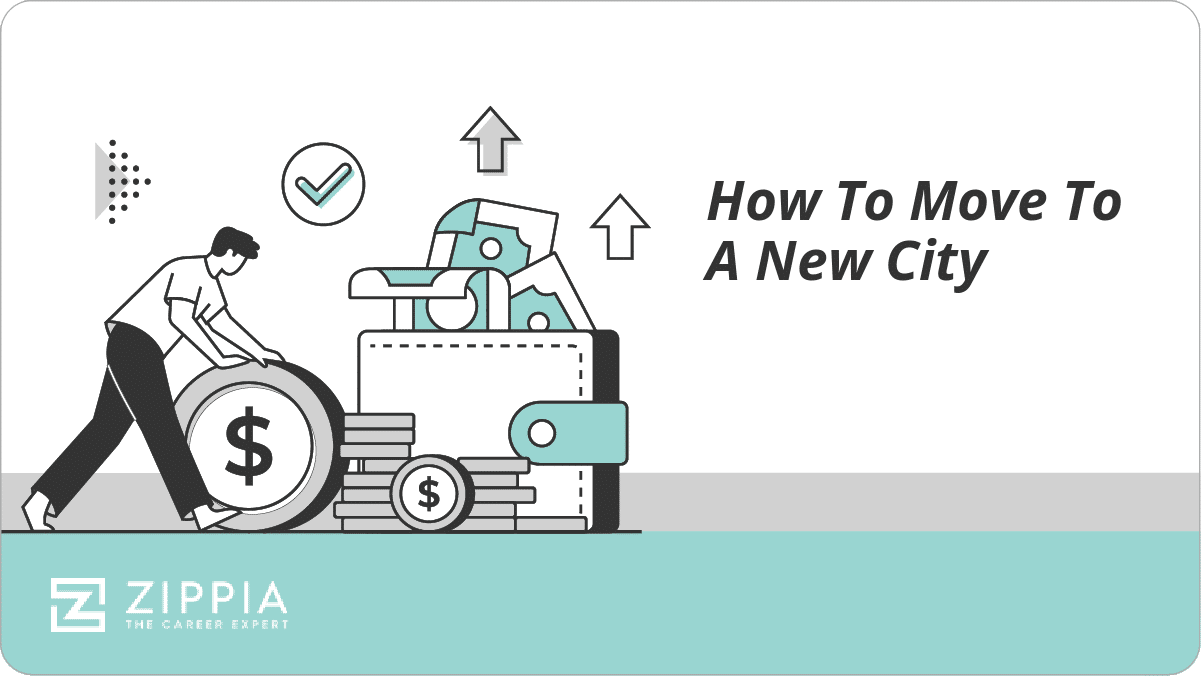
Things to Do Before Moving to a New City
How to move to a new city, things to do after moving to a new city, why get a job before moving to a new city, how to get a job in a new city, final thoughts.
- Sign Up For More Advice and Jobs
Moving to a new city isn’t as simple as romantic comedies and inspirational blog posts make it out to be. There’s a reason that plenty of people would like to move, but rarely are able to do so.
It takes money, time, and lots of resources to move yourself to somewhere new, and not doing the necessary prep work beforehand can lead to you having a bad time in your new digs.
Here are some things you should do to prepare yourself for your big move:
Research the area. It’s a good idea to do a little research on the area you plan on moving to. Check the safety of the neighborhoods and the crime rate to see if it will be safe to live alone. You should look up the cost of living and make a budget for your spending to know if you can afford to live there/
Visit the place you plan on moving to. If you’ve only spent a couple of hours or days in the city you’re planning to move to, it’s a good idea to spend a little more time there to make sure it’s a place you’re comfortable being.
Check out a few apartments before signing a lease. You may love the first apartment you see, but go visit a few more before you sign anything. This is especially important if you saw a show apartment instead of the actual apartment you will be living in. You may find something that is a better fit for your needs at a cheaper price when you look around.
Find a roommate. If you aren’t able to find something on your own, don’t be afraid to look for a roommate. This is a great way to make new friends in a new city, and they may be able to let you know more about the city that you are living in.
Get a job there first . If you don’t have a job lined up before you move to a new city, you’re living on the edge. At the very least, you should have sent out a few applications and have at least one good interview lined up, but even that is a bit of an unnecessary risk.
Make sure you understand how transportation will work for you. How’s public transportation in your new city? Is it the kind of place where you’ll need a car? If so, do you already have one that will work based on your new city’s weather?
Even if you do all the preparation work, that doesn’t mean things are going to be easy for you. There are a lot of moving parts to the moving process itself, and you need to have a good plan in place if you expect things to go smoothly.
Sure, you can just throw everything you own in a truck, start driving, and hope for the best. But the odds are you won’t have the best time.
Here are some things to do while you move that can help alleviate some of the worst parts of moving:
If you can afford it, get professional movers. It’ll save you plenty of headache during the moving process if you just foist all of your moving responsibilities onto someone else. Plus, then you can save asking your friends for help until you really need them, once all the boxes are already inside your house.
Label everything. You’re going to want to be able to move every box into the appropriate room before you open them and to do that, you’re going to need names on every single box.
Create a household inventory list. Make sure you make a list of anything you are moving. This is a good way to keep your items organized, and also you are able to account for anything that got lost during the move. This will also bring forward all the unnecessary items that you can either donate or sell.
Plan your layout before you dig in. To make unpacking as painless as possible, have a method to which boxes you open first and the order in which you move your furniture around. Unpack each discrete box one at a time to keep from becoming overwhelmed.
Pack like you’re going on vacation. It might take you some time to put everything away, and during that time you’re going to need a few essentials. The last thing you want is to have to dig through all of your crap just to find your toothbrush or a pair of socks.
Of course, the story’s not over yet. Even after you’ve already prepared to move and then made the move itself, there’s still more work to be done.
Unless you have extraordinarily few belongings, there’s just no way you’re going to all moved in after just one day. Getting totally moved into a new place is a long-term process.
Here are some things you should definitely do after you move to a new city:
First thing’s first: make your bed. This should really be the first thing you do once you move into a new place. That way even if the process of putting away all of your stuff ends up taking a lot of time, at least you’ve got a place to crash when you get tired.
Set up your utilities. It’s hard moving your furniture around in the dark, and having to go to sleep without Wifi might as well be illegal. Make sure you’ve got the utilities in your name as soon as possible.
Find out about your new neighborhood. Write down all the best takeout restaurants within a few miles of your place, either that are familiar or that you plan on checking out.
Locate all the places where you get your basic services from — grocery stores, DMVs, car repair persons, dentists, and all that other junk you don’t realize you need until you need it.
Get out of your comfort zone. When you move to a new city, chances are you won’t know anyone. The best way to meet people is to try new things and get out of your comfort zone. You may have some anxiety about meeting new people and feel it’s best to stay in your apartment, but joining new clubs or organizations is a great way to get out there.
Give yourself a year to acclimate. A week into moving you might think “this was a total mistake!” “Why did I move my entire life to a new city!” Take a deep breath. It’s normal to have these thoughts. It can be overwhelming to move to a new city. Give yourself some time to get used to your new surroundings and get into a new routine. In no time you will feel right at home.
If after a year you are still thinking it’s a mistake that you moved to a new city, then it’s the time to start thinking about moving home, or maybe somewhere new.
Keep in touch with people in your home town. After moving, keep in tough with your friends and family back home. They will be your biggest supporters during the first few weeks of moving. Just because you are on a new adventure, doesn’t mean you should cut off people from your old life.
We mentioned that getting a job before you move to a new city is paramount. The benefits of arriving in town with a job already arranged are numerous:
Peace of mind. Relocating to a new city is stressful, but having a job lined up can dispel some of that stress . You’ll have a purpose from day one and you’ll have one less thing to worry about as you explore this new and exciting chapter of your life.
Saves money. Moving is expensive, and getting set up somewhere new has a bunch of hidden costs that you have to deal with as they come. When you have a job ahead of time, you don’t have to worry about paying out the nose while simultaneously having no income coming in.
You might still have to dip into your savings, but at least you can feel secure that the money will soon be replenished.
Makes it easier to find a home. Many rental, housing, and condo associations won’t allow you to move in without proof of income. And, for the most part, they want to see that you’ll be able to continue earning an income once you move in (which means your current job won’t cut it).
Having a job offer and a company contact that can confirm your position will make securing accommodation much less painful.
Gives you a better plan. When you know where your workplace will be, you can plan your housing decisions much more strategically. For example, maybe you’ve always wanted to live near the hip downtown area of the new city, but your new employer is on the outskirts of the city.
If you had just gone with your first instinct for housing, you may have inadvertently locked yourself into an hour’s hellish commute each way. Getting a job before getting housing clears up this issue entirely.
You’re sold on the benefits of landing a job before moving, but just how do you do it? Follow the strategies below for landing a job in a new city:
Research. You’ve probably already got a city in mind, but you should start narrowing down your search even more. Think about what neighborhood you want to live in or near, where the business district is, and where your potential employers are centered.
Then, start looking into the various companies that are hiring and the positions they’re hiring for. The age of online applications has made it easier than ever to conduct a long-distance job search .
Remove your location from resumes. When you’re applying for jobs, remove your city and state from your resume. Many hiring managers and recruiters will see that information and immediately weed you out from the candidate pool because they’re worried about the logistical headache that hiring you will come with.
Explain relocation in your cover letter. Now, chances are that if an employer is reading your cover letter , they liked your resume enough to give you the time of day. This is a good time to explain your relocation in terms of how drawn you are to work for the company. It shouldn’t seem like the new city is your primary goal and the job a secondary one.
Still, it should be clear that you’re relocating no matter what, which will make the employer feel more comfortable giving you a chance.
Request a transfer. Perhaps you really love your company and role and you just need a change of scenery. If you work for a large enough company that has a location in the city you hope to move to, approach HR about a possible transfer.
Even if the company doesn’t have an office in your new city, they may be willing to allow you to continue working remotely full-time . If you can move to a new city while maintaining continuity with your current employer, your life will be a whole lot easier — you’ll just be coping with a new city rather than a new city and a new job at the same time.
Practice your remote interviewing skills. Unless you plan on hopping on a plane for an hour-long conversation with an interviewer , you can expect your interviews for jobs in a new city to be entirely done through video chat. Practice working with this technology and following best practice for video interviews .
Also, prepare a spiel about why you’re relocating. Make sure that this sounds confident and enthusiastic — interviewers may be a bit skittish if they think you’re moving to the new city without a long-term plan or 100% confidence.
Get a seasonal or temporary job. If you really just want to move first and figure out the long-term plan after, you can still set yourself up for some financial security by arranging a temporary or seasonal job for your arrival. That way, there will be far fewer hurdles to getting hired and you can start a low-stakes job from day one.
You’ll still have money coming in and a sense of purpose, but without having to stress about your career. Then, once you feel secure in the new city and you’ve built up some new connections for your network, you can try to land a satisfying, long-term gig.
Stay flexible. Just because most job applications are online these days, doesn’t mean it’s simple to land a job in a place halfway across the country. Be flexible throughout your job search process and be willing to take a job that you’re not 100% sure of.
Like a seasonal or temporary job, this will give you financial security and a place to start, without necessarily locking yourself into anything long-term.
That’s all for this one! Just keep in mind: When it comes to moving to a new place, the biggest thing to keep in mind is that it will take you a little bit to settle in.
So if you’re feeling miserable in your new place and don’t understand why you made the move in the first place, give it a few months. And make sure that during that time, you’re really giving it your all.
That means looking for clubs, taking community center classes, going to big events — if you plan on having a good time in a new place, you have to put yourself out there.
Otherwise, you’ll look around one day and realize all the people you hoped would be potential new friends are just more strangers for you to deal with.
How useful was this post?
Click on a star to rate it!
Average rating / 5. Vote count:
No votes so far! Be the first to rate this post.

Ryan Morris was a writer for the Zippia Advice blog who tried to make the job process a little more entertaining for all those involved. He obtained his BA and Masters from Appalachian State University.
Recent Job Searches
- Registered Nurse Jobs Resume Location
- Truck Driver Jobs Resume Location
- Call Center Representative Jobs Resume Location
- Customer Service Representative Jobs Resume
- Delivery Driver Jobs Resume Location
- Warehouse Worker Jobs Resume Location
- Account Executive Jobs Resume Location
- Sales Associate Jobs Resume Location
- Licensed Practical Nurse Jobs Resume Location
- Company Driver Jobs Resume
Related posts

Questions To Ask Before Accepting A Job Offer
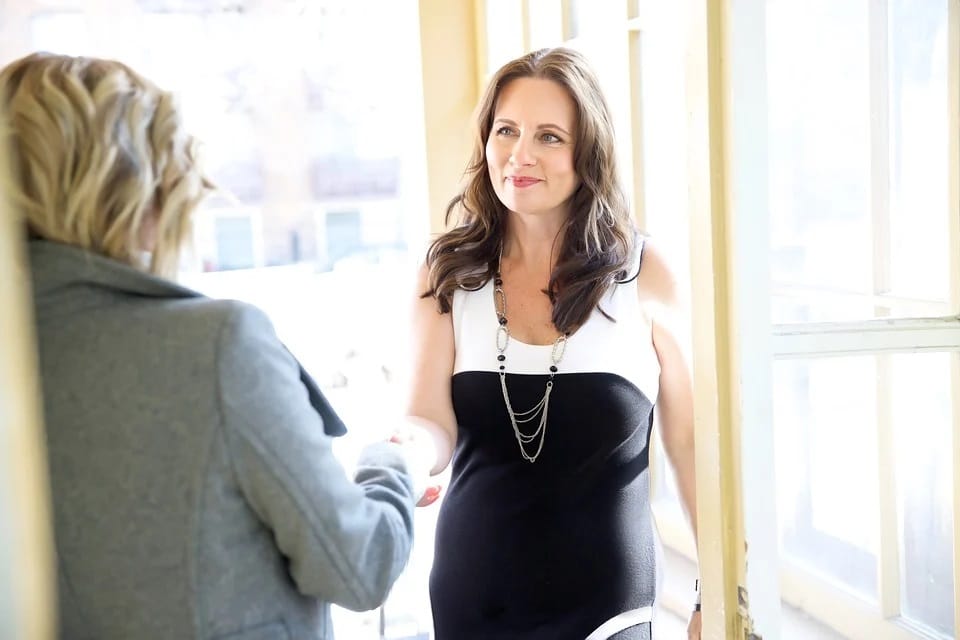
Job Hunter Toolkit: All The Resources You Need To Land Your Dream Job

How To Toot Your Own Horn Without Being Annoying

How To Make Your Cover Letter Stand Out In 12 Easy Steps
- Career Advice >
- Get The Job >
- Moving To New City
City Living Guide
- Mortgage – Finance
- Home Maintenance
15 Essential Steps for Moving to a New City
- Author: by The HOMEiA Team
Published: Oct 11, 2021
- Category: City Living Guide

Moving across town to a new home or apartment is hard enough. You’ll be packing, cleaning, lugging things back and forth, and running here and there to sign agreements or attend closings. If you’re moving to a new city, though, the process is even more complicated. Without the ability to make a quick trip here and there, you’ll need a detailed plan to keep everything running smoothly.
This guide to relocation will help you make a plan and check all the boxes so your move will be as painless as possible.
Table of Contents:
- 1. Find a new place to live.
- 2. Sell your home or end your lease.
- 3. Schedule movers.
- 4. Plan to switch schools.
- 5. Start sorting and packing.
- 6. Plan your healthcare.
- 7. Change your address with the post office.
- 8. Notify everyone of your new address.
- 9. Make arrangements for your utilities.
- 10. Get ready for moving day.
- 11. Clean up.
- 12. Make the trip.
- 13. Move in.
- 14. Get familiar with your new location.
- 15. Update your ID and registrations.

Once you’ve decided to move, you’ll need to do some research on your new city to find the right neighborhood for you and your family. City guides are a good place to start.
If you plan to buy a home , find a good real estate agent who can work with you from a distance. Tell your agent about your needs when it comes to your commute time, neighborhood preferences, and how much you can afford to spend on a house payment.
If possible, visit your new community in person to tour houses or apartments. If you have kids, this may also be a good opportunity to check out public or private schools in your target neighborhoods.
Once you’ve signed a lease or had your offer accepted, you can start to work out the timing for your move. You’ll get the keys to your new home at closing, which you’ll typically attend in person, so plan to be in the new city that day — either on a visit or moving in.
Related article
Home Selling Process: 12 Steps You Should Know
Whether you plan to sell your house on your own or hire a real estate agent , the home selling process is very similar throughout the United States. Only a few details vary among states. Here are 12 important steps to expect in the process…

If you’re renting now, talk to your landlord about ending your lease. Be prepared to pay a fee for breaking the lease; in most cases, it will cost you less than continuing to pay rent after you leave.
If you own your home, find a real estate agent who can help you sell it. Then start decluttering and getting the house ready to list . You may want to box up rarely used items and rent a storage unit to keep them out of the way.
When it comes to negotiating the closing date with your buyer, make sure you work out an appropriate timeline. In most cases, you’ll have to be moved out of the house when you close, and you’ll be expected to attend the closing in person.
The timing can get complicated when you’re selling one home and buying another, but you have options. One is called a lease-back, and it’s when you close on the house but pay rent to the new owners in order to continue living in the home for a set period of time. This arrangement could help you avoid the need for in-between accommodations.
Another possibility is to sign the closing documents ahead of time in front of a notary. If you’re able to do so, you can move before the closing without having to return to sign papers.
Recommended for you
10 Most Affordable Places to Live in Florida in 2024
The 10 most affordable places to live in california in 2024, 10 most affordable places to live in oregon, the 10 cheapest places to live in texas.
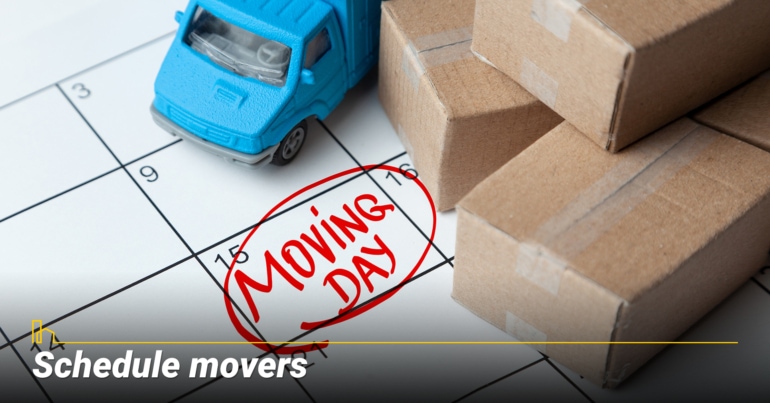
In most cases, a long-distance move will require professional movers . Call a few companies to get estimates and get your move date scheduled on or after the closing date or lease start for your new home. (If you get to town earlier, you’ll need temporary storage and a place to stay.)
Decide how to handle your vehicles. Will you drive to your new city? If your family has more than one car, will you have multiple drivers, or do you need to sell a vehicle or pay to have it transported?

If you have kids, call their schools – old and new – and arrange for their records to be transferred. Your new school can tell you how to enroll. Be sure to notify the schools of the children’s first and last days.
If you’ll need daycare or before- or after-school care, this is the time to arrange it.
5 Factors that Affect the Value of Your House
For many, selling their home, and especially pricing it for a sale, can be quite emotional. Besides the memories, there’re all types of investments that have invested into the home . However, if they can understand the factors that affect the market value of their homes, they’re often better equipped to deal with the reality. Let’s go over these 5…

Packing up a house is not a last-minute project. To make it manageable, do a little bit at a time. Donate items you don’t want to move, throw out anything that isn’t worth donating, and use up perishable items.
Keep your most valuable belongings separate; you may want to take them in your own vehicle. Make a list of the things you’ll need up to the last minute.
Acquire whatever supplies you’ll need for the move, such as boxes, tape and bubble wrap.
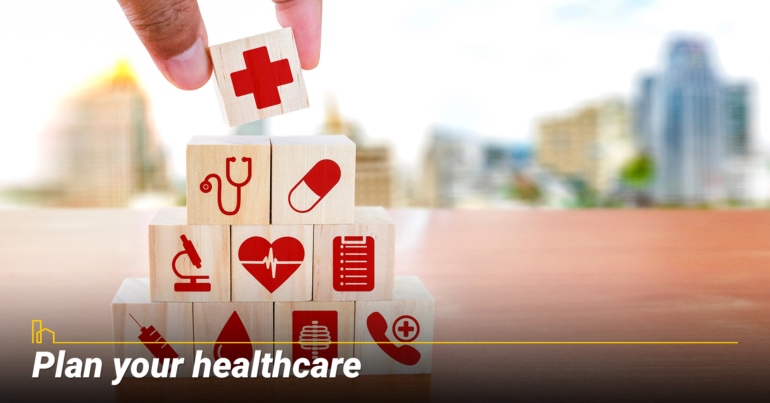
Figure out what providers are covered under your new plan, if you have one, and ask for referrals. Once you’ve found a new doctor, dentist, etc., contact your current provider to have your records transferred.
Make a plan to stock up on prescription medications before the move, in case there is a delay in your ability to get them filled.
The 10 Most Affordable Places to Live in Arizona
10 most affordable places to live in colorado, 10 most affordable places to live in tennessee, 10 most affordable places to live in michigan.
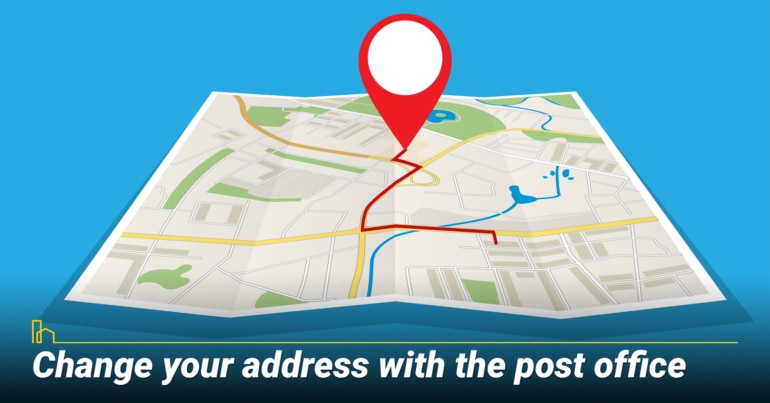
In the U.S., request a Moving Guide packet at your local post office and submit the change-of-address form – or, for a small fee, change your address online or at usps.gov. The postal service will forward mail to your new address for a limited time period.
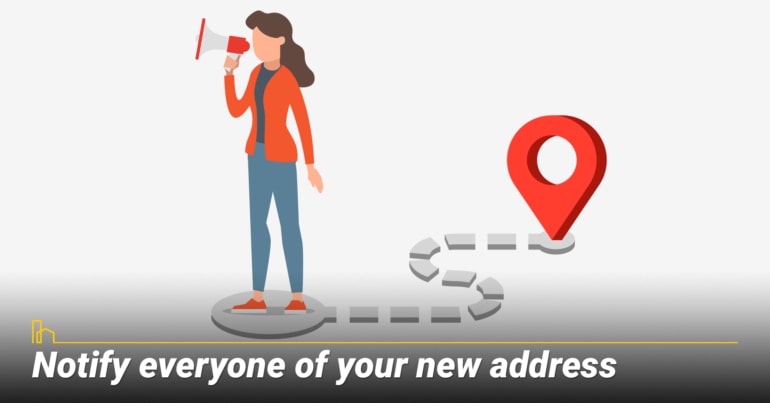
Update all of your contacts and your accounts with your new address. This includes banks and brokerages , lawyers and financial advisers, your current HR department, insurance companies , credit card companies, close friends, family, alma maters, and so on.
Update your mail subscriptions – not only magazines and newspapers, but any company that delivers to you regularly.
20 Clever Ways to Increase the Value of Your Home
If you’re thinking of selling your house , you’re undoubtedly also thinking about the value of your home and how the market will treat you in terms of a reasonable selling price. We’ll discuss here some ideas for minor to moderate…
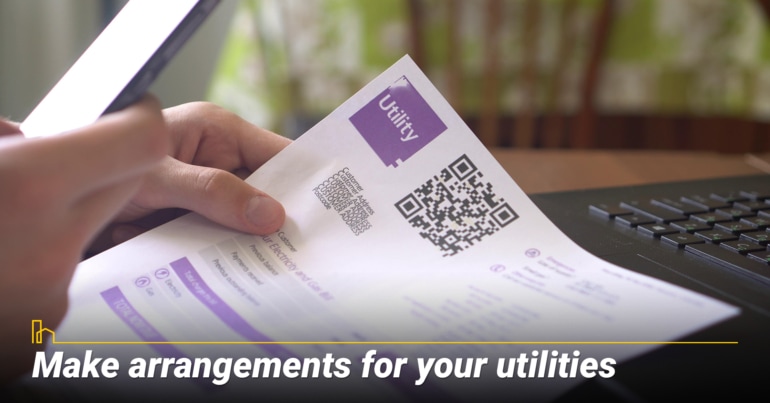
Call your utility companies – electric, gas, cable, etc. – and let them know the date you’ll be ending service or switching it to the new occupant.
Contact the utilities in your new place, too, so you can be sure everything is hooked up and running when you arrive.

Confirm the date with your moving company , and make sure they have your contact information and any special directions. Figure out how you will pay the movers, including a tip.
Gather your valuable items and make sure they don’t get lost in the shuffle. If you have a safe deposit box, retrieve your items so you can transport them.
Finish packing everything the movers will transport and get rid of anything left that isn’t coming with you. Will your furniture fit through the doors of your new home? No need to move a sofa across the country if it won’t fit through the door.
If you’re driving, make sure your vehicle is ready to go, tuned up and with properly inflated tires and a full tank of gas.
Pack suitcases for everyone in the family with the things you’ll need for the first few days.
10 Most Affordable Places to Live in Iowa
Pros and cons of living in florida, the 10 best places to live in southern california, 10 best places to live in wisconsin.

Once the movers have packed everything away and you’ve signed the paperwork, it’s time to clean.
If you’re renting, you’ll probably need to leave the place in broom-swept condition and follow any checklist provided by your landlord to make sure you won’t lose your security deposit.
If you’re selling your house , you’ll need to meet any requirements in the purchase agreement, plus complete a basic dust-and-vacuum out of respect for the new occupants.

Load up the car and say goodbye! If you’ve done your planning and there have been no unpleasant surprises, the trip itself should be simple. Just make sure you have all the necessities in the car with you, just as you would for a vacation, in case something goes wrong with the movers and you don’t get the rest of your belongings right away.
The Beginner’s Guide on How to Buy a House
In this article, we’ll discuss those key steps to confidently buying your first home . We’ll also look at several professionals who can help guide you on the journey, so all the details are handled correctly and professionally. Let’s get started on your next adventure…

Once you have the keys to your new place, you can move in. Make sure you’re around when the movers arrive so you can direct them where to put all of the furniture and boxes.
Take your time with unpacking; it doesn’t have to be done right away, and you may need some time to de-stress first. Expect to get takeout or go out to eat for the first few meals.
When you do start unpacking boxes, be thoughtful about where you put things; they tend to stay in the first place you put them.
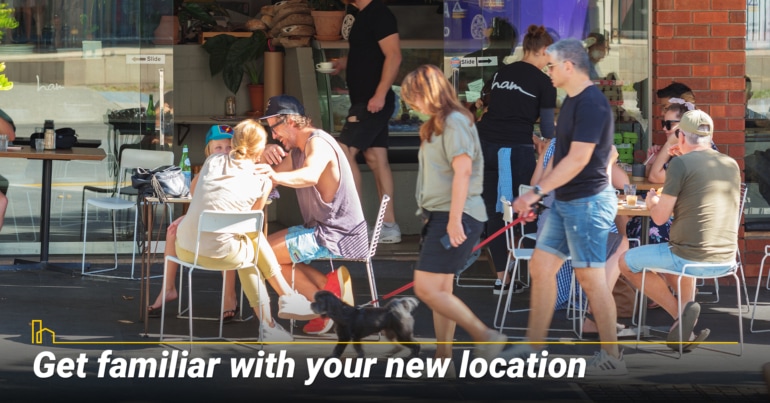
Figure out where all the necessities are located: the grocery store, 24-hour store, gas station, hospital, bus stop, etc.
Get familiar with your HOA , if you have one, and its policies. Plan your routes to work and school. Take walks and chat with your new neighbors.
If you’ve moved to a new region, familiarize yourself with potential natural disasters and establish safety plans.
Don’t forget to have fun! Find a new favorite coffee shop, library, restaurant, bar or park.
10 Important Features to Consider When Buying a House
In this article, we’ll discuss about things to consider when buying a new house . Each will rank differently in importance for individual buyers, but all points are worth examining. If you haven’t already thought seriously about these factors, now is your chance. Let’s check it out…

If you’re in a new state, you’ll need to make a trip to the DMV for a new driver’s license and vehicle registration.
You’ll also need to update your voter registration to make sure you can vote in your new district.
Moving to a new city is very stressful, but making a plan and sticking to it can help you minimize your anxiety and keep things from falling through the cracks. A big move can also be a big adventure!
Here is the PDF form where we make a list of these 15 things for you to print out and check off as you are preparing for your move. We wish you a all the bests and a safe trip to your new home.
Tips and Templates to Evaluate Single-Family Homes
In this article, we’ll discuss how to organize like a pro and weigh in on the good, the bad and the ugly for every house you are viewing. With strategy and organization, you’ll be able to actually enjoy the home buying process . After all, you want to find the best home for your situation…

HOMEiA is a city living guide site where visitors can find detailed information about communities of interest. HOMEiA’s City Living Guides, created in partnership with local writers, are curated lists of the best, safest, and most affordable places to live. The guides feature the HOMEiA Score, a proprietary index that rates communities on such factors as housing costs, education and employment.
HOMEiA.com aims to be the premier site for people planning to relocate, providing them with insightful content and connecting them with skilled real estate professionals.
We also empower real estate professionals to establish or strengthen their web presence by highlighting their experience, knowledge and achievements. If you’re selected to join our list of certified real estate professionals, you will distinguish yourself from your peers — and earn HOMEiA ’s support.
If you believe in HOMEiA’s mission, please share the site with others.
Related Content

10 Best Places to Live in Georgia in 2024

10 Best Places to Live in Virginia in 2024

Top 10 Best Places to Live in Wyoming for Families

An Ultimate Guide to Moving for Home Buyers and Sellers

The 10 Best Places to Live in South Carolina for Families

The Cost of Living in Florida vs. Texas

The 8 Largest Cities in Florida

The 8 Best Places to Live in Florida For Retirees in 2024

The 9 Cheapest and Safest Places to Live in Florida in 2024

7 Best Small Towns to Live in Texas

12 Best Places in Washington State to Raise a Family

5 Best Places to Live in Texas

15 Best Cities for Families in Texas

12 Best Cities to Live in Arizona for Families

15 Best Places to Raise a Family in the US in 2024

7 Key Factors You Should Know Before Living in Eagan, MN

The 10 Best Places to Live in Oregon

10 Most Affordable States to Buy a House in 2024

Minnesota Winter: Experiencing the Magic of Our Snow Season

The Cost of Living in California vs Texas in 2023

The 10 Best Places in the USA to Retire on the Water for Less

12 Key Factors to Know About Living in Washington, D.C.

The 10 Best and Most Affordable Places in the US to Retire on Social Security

8 Best Cities for Buying a House and Raising a Family in Minnesota

4 Best Places to Live in Minnesota for Families in 2024

The 15 Best Places to Live & Retire in Minnesota

7 Key Factors to Know About Living in Chicago, Illinois

7 Key Factors to Know About Living in Boston in 2024

7 Key Factors You Should Consider Living in St. Louis Park, Minnesota

7 Key Factors to Know About Living in Miami in 2024

7 Key Factors To Know About Living in Denver, Colorado

7 Key Factors to Know About Living in Milwaukee, Wisconsin

The Magic of a Minnesota Christmas

7 Key Factors to Consider Before Moving to Orono, Minnesota

7 Key Factors to Know About Living in Edina, MN

7 Factors Rank Minnetonka as one of the Best Cities in Minnesota

7 Key Factors to Know About Living in Wayzata, MN

7 Factors Rank Minneapolis as one of the Best Cities in Minnesota

7 Factors That Make North Mankato one of The Most Affordable Cities in Minnesota

Lake City, MN: Best Minnesota City for an Affordable Lifestyle

7 Factors Rank New Ulm as one of the Cheapest Cities to Live in Minnesota

7 Factors Rank St. Joseph as one of the Most Affordable Cities to Live in Minnesota

7 Factors Rank Little Falls as one of the Cheapest Cities for living in Minnesota

Alexandria: Best Minnesota City for Buying a House and Raising a Family

Maple Grove: Best Minnesota City for Buying a House and Raising a Family


Lakeville: Best Minnesota City for Buying a House and Raising a Family

7 Key Factors You Should Know Before Living in New Prague

Lino Lakes: Best Minnesota City for Buying a House and Raising a Family

What is It Like Living in Seattle, Washington?

12 Key Factors to Know About Living in Tampa, Florida

What is It Like Living in Dallas Texas?

12 Key Factors to Know About Living in Los Angeles

12 Key Factors to Know About Living in Houston

12 Key Factors You Should Know Before Living in Mankato

11 Key Factors to Know About Living in Bloomington, MN

11 Key Factors to Know About Living in Duluth, MN

12 Key Things to Know About Living in Rochester MN

12 Key Factors to Know About Living in St. Paul, MN

12 Key Factors to Know About Living in Minneapolis
Share this article.
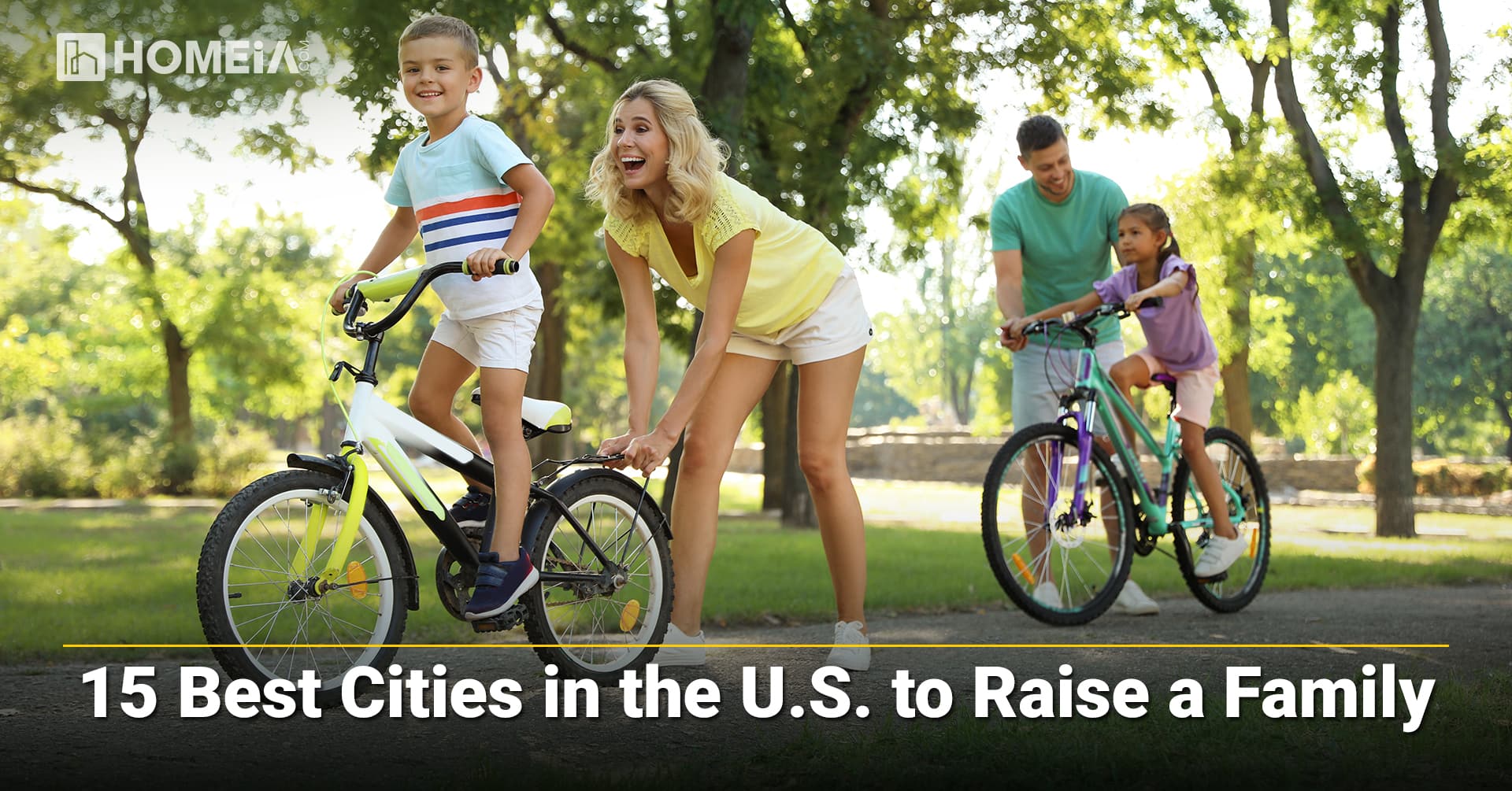
Share on Mastodon
11 Telltale signs it’s time to move to a new city

There are many sound reasons why people decide to move to a new city – a great job offer, a lower cost of living, milder weather, pursuit of love, educational opportunities, etc. Yet, sometimes, the only reason to move to a new place may be the need for a change of scenery or the desire for a fresh start – there may be nothing wrong with where you currently live or no specific reason to move to a certain city, but you may still be feeling out of place in your current area and wishing for a change; or feeling trapped and unable to progress; or feeling restless and constantly looking to the horizon. Either way, it may be time to move away.
But how to know if the time is right? How to know if the moment is ripe for such a life-changing step? Actually, there are a lot of signs that indicate so – you only need to know what to look for.
When uncertain, check for these telltale signs that it is time to move to a new city:
Your budget is tight
If you’re in a tight financial situation that doesn’t seem to be improving, your current city may not be the right place for you. Even if it’s a cool city that you like, there is no point living in it if you can’t afford to enjoy it – you will be better off moving to a place with a lower cost of living. Just make sure you find an affordable city with good job opportunities in your field.
See also: Should I move to a cheaper city?
Your career prospects are limited
Different cities offer different job prospects – you may have better employment opportunities (or better business opportunities) in another city or state.
So, if you can’t find a job in your current area, or you’re dissatisfied with your job (in terms of salary, employee benefits, working hours, work environment, work relationships, etc.), or you feel stagnating in your job and have no chance to improve your professional skills or expand your professional knowledge, or you don’t have the opportunity to advance in your career or establish a successful business of your own, you should consider moving to a new city.
See also: What to consider when relocating for a job
Your city doesn’t offer what you need
You may have moved to your current city for love, study, or work – you may have found exactly what you needed and been happy for a while. Yet, things change and now you may have different goals and different needs – or you may have already achieved what you wanted and may be now looking for new challenges.
If your city no longer offers what you need to grow as a person and follow your dreams, you should start looking for a new city that does.
You feel stuck in a rut
If you’ve reached a point where you’re living on auto-pilot and feeling trapped in your daily routine (you do the same thing day in and day out and the future holds nothing exciting for you), you need a CHANGE. And moving to a new place can provide that much needed change and help you reinvigorate your life and get a new perspective. You will face new challenges, get new opportunities, and meet new people – and you will have a chance to build a happier, more fulfilling, and more enjoyable life for yourself.
Related: Pros and cons of moving out of state
You’re haunted by bad memories
If you’ve been living in the same city for a long time, you’ll have accumulated plenty of memories in it – and if many of these memories are bad, it may be difficult to feel happy, confident, and relaxed in your current surroundings.
If every store, restaurant, and park in town reminds you of something or someone you don’t want to be reminded of and all you see when you look around are bad memories, then it may be time to move to a new place and start creating new memories.
You can’t stand the weather
Sometimes the climatic conditions in an area may result in too much troubles and cause people to consider moving to a different part of the country where the weather will be less of a concern.
Whether it’s too cold or too hot, too windy or too humid, if you hate the climate in your area, you won’t be happy living there. The weather can have a great impact on your health and psychological well-being – if you avoid going outside just to avoid the elements, if you suffer from allergies and fatigue in the sweltering heat or you’re sick and tired of blizzards, snowdrifts, and icy roads, if you’re dreaming of a white Christmas or longing for year-round sunshine, then it’s time to pack up and move to another city where the weather will agree with you.
Related: Benefits of moving to a warmer climate ; What to know when moving to a cold climate
You complain all the time
Constant complaining about your living situation, your surroundings, your neighbors, and just about everything is one of the clearest signs you need to move to a new city.
If you’re always dissatisfied with something and every little thing about where you live seems to be bothering you, if you can’t stand the weather, the traffic, and the people, if you disagree with the local authorities’ decisions, city ordinances, and typical points of view in your area, you should really start looking for a place that will be a better fit.
None of your entertainment options feel fun
In case you have free time and don’t know what to do with it, or you’re constantly bored and would rather stay at home than go out to local bars or clubs, or you’ve been to every restaurant and every entertainment locale in town and never really enjoyed any them, or you can’t pursue your passions in your current area, then your city simply doesn’t have the entertainment options you need. Why not see what other cities have to offer?
You’re lonely in your city – or you want to experience life on your own
Everyone needs a support system and like-minded company – if you don’t have family and friends in your current city and just can’t seem to make new friends regardless of your efforts, you’ll likely feel lonely and isolated. Having no one to count on and no one to hang out with will make you sad, frustrated, depressed, and miserable. You need to move away – find a place where you will fit in and won’t feel like an outsider or move closer to trusted friends and loved ones.
On the other hand, if you’re still living in your hometown, being close to your family may be stifling for your personal growth – you may need to venture out and face the world on your own, find your true self and learn to stand on your feet. And there is no better way to achieve this than to move to a new city alone .
See also: How to deal with moving away from family and friends
You can’t think of a reason to stay
When you have nothing tying you to where you are (a great job, meaningful relationships, significant commitments, etc.) and you’re not in love with the city, there is no reason to stay put – you can go looking for a place where you’ll be truly happy.
Furthermore, if you find yourself reluctant to make long-term commitments in your current area or just can’t picture yourself living in your current city in the future, it’s also a clear sign that you need to move on.
You long to be someplace else
If you’re jealous of friends who moved away and are constantly asking them what it’s like, if you escape out of town at every opportunity, if you’re looking for new horizons, if you visit a city and like it so much that you’re sad to leave, if you’re drawn to a place and feel like you belong there, you have nothing to wait for – it’s time to start packing and go chasing after your dreams.
So, how to know when it’s time to move to a new city? Just listen to your inner voice and follow your gut feeling – it won’t lead you astray. (And once the time comes to make your big move, be sure you research your options , choose the right place to move to , and organize a safe and smooth relocation .)
2 thoughts on “ 11 Telltale signs it’s time to move to a new city ”
This is perfect! Every single one resonates with me. It is time to leave boring upstate NY and move to Cali baby….Just need to finish college I’m a senior now almost done! There is nothing tying me to this place after graduation.
Girl yes I currently live in upstate ny time to move too for me I thought I was the only one
Leave a Reply Cancel reply
Your email address will not be published. Required fields are marked *
Save my name, email, and website in this browser for the next time I comment.
Read previous post:
Is moving in with friends a good idea?
At first, the idea of moving in with friends after college or high school may seem like a birthday wish...

- Mover Types
- Best Long Distance Moving Companies
- Best Interstate Moving Companies
- Best Cross-Country Moving Companies
- Best Out-of-State Moving Companies
- Best Cheap Moving Companies
- Moving Services
- Moving Quotes
- Moving Labor
- Local Movers
- Long Distance Movers
- International Movers
- Canadian Movers
- Office Movers
- Piano Movers
- Moving Company Reviews
- Allied Van Lines
- Mayflower Transit
- Colonial Van Lines
- National Van Lines
- North American Van Lines
- United Van Lines
- American Van Lines
- Bekins Moving
- Wheaton World Wide Moving
- Moving cost calculator
- Moving company directory
- Plan your move
- Should you tip?
- Moving insurance
- Move cross country
- Moving a mobile home
- Moving Container Reviews
- 1-800-PACK-RAT
- Zippy Shell
- What Is a Moving Container & How Does It Work?
- How to choose the right size moving container
- Professionals Movers or Moving Containers?
- What Not to Pack Inside Your Moving Container
- Truck Rental Reviews
- The Home Depot
- Enterprise Truck Rental
- Moving Labor Reviews
- Best Moving Labor Companies
- HireAHelper
- U-Haul Moving Help
- How to pack & load a moving truck
- What size truck should I get?
- Should you buy rental truck insurance?
- Should you hire moving help?
- Free moving boxes
- Storage Reviews
- Best Self-Storage Companies
- Public Storage
- Extra Space Storage
- LifeStorage
- Simply Self Storage
- Junk Removal Reviews
- Best Junk Removal Companies
- 1-800-GOT-JUNK?
- College HUNKS Hauling Junk
- Waste Management
- Guide to renting a storage unit
- Organizing a storage unit
- How much does it cost to rent a storage unit?
- Items that require climate controlled storage
- How does junk removal work
- Free donation pickup
- Car Shipping Reviews
- Best Car Shipping Companies
- AmeriFreight
- How Much Does It Cost to Ship a Car?
- How to Transport a Car to Another State
- Preparing Your Vehicle for Auto Transport
- Before You Rent a Car Trailer: Cost and Tips
- Moving Cost Calculator
- Packing Calculator
- Move Planner
- Mortgage Calculators
- Moving Announcements
- Guides & Advice
- Moving Articles
- School Ratings
- City Profile
- Compare Cities
- Daily Market Commentary
- Edit My Account
- How to Choose the Right City for You >
How to Choose the Right City for You
Share this:

Not sure where to move? If you’re having trouble choosing a city that fits your budget, lifestyle and professional needs, we’re here to help. From a city’s job prospects and income potential to its weather and crime rates, here are the top 10 things to consider when choosing a new city to call home.
10 Things to Consider When Choosing a City
Job prospects, demographics, cost of living, housing market, proximity to family & friends, crime rates, social and professional networks, city resources.
Fortunately, there are a number of websites that provide plenty of information about various American cities. Several of the best include:
- Moving.com’s Neighborhood Guides
- realtor.com
- GreatSchools
- NeighborhoodScout
- CrimeReports
Ready to move?
To learn more about a certain city, check out Moving.com’s City Profile Report feature. Our reports include city demographics, economics and other quality of life factors. Simply enter the zip code or the state and city of your potential move to get a free report at the click of a button. Looking for movers? Fortunately, Moving.com’s extensive network of reputable and reliable movers makes it easy to book the best moving company for the job. All relocation companies in our network are licensed and insured, so you can rest assured that your move will be in good hands. Best of luck and happy moving!
Related Articles:
- How Much Does It Cost to Live in Phoenix?
- 12 Tips for Buying a House in a New City
- These 10 States Enjoy the Shortest Work Commutes, According to U.S. News
- The 10 Best Places to Live in the U.S. in 2023-2024
- Top 300 Largest Cities in the United States by Population 2023
- 15 Benefits of Moving to Florida
- America’s Most Expensive Cities
- What is the Cost of Living in Kansas City?
- Where Should I Move? 5 Important Questions to Ask Before Moving
- What to Do When Moving to a New City Alone
Author: Marian White
If anyone knows how to move, it’s Marian White. The South Carolina native spent the last decade living and working in Washington, DC, New York City, Boston and Palm Beach. With every move, she mastered the art of folding bankers boxes, repurposing bubble wrap and unabashedly asking for directions. Before writing for Moving.com, Marian authored “Moving to Palm Beach County: The Un-Tourist Guide,” a relocation guide for moving to the Palm Beaches. Marian has an M.A. in Global Marketing Communications from Emerson College and a B.A. from Furman University. View all posts by Marian White
- Mudanzas (Spanish)
- Do not Sell My Information
- Join our Network
- Client Login
- Accessibility
- Privacy Notice
- Terms of Use
- Review Guidelines
Move, Inc. Sites
- realtor.com ®
- SeniorHousingNet.com
- Local & Interstate Costs
- International Move Costs
- Vehicle Shipping Costs
- Moving Tips & Costs
- Moving Checklists
- Packing Tips
- Car Shipping Tips
Select Page
Checklist for Moving to a New City: 20 Easy-to-Follow Steps

Moving to a new city can be quite an adventure.
Moving to a new city will always be a challenge.
The good news is that the readier you are to face that new city moving challenge, the greater your chance will be to overcome all move-related difficulties.
One thing is clear – you will need a good checklist for moving to a new city to steer your house move to a successful end.
Pay attention to the following 20 steps, for they will not only help you move to the new city trouble-free, but will also guide you through the tough post-move adaptation period.
How to move to a new city? Read on to find out.
1. READ the signs: are you ready?
Before moving to a new city, you have to be absolutely sure that you’ve made the right decision. While there may be many reasons to move to a different city, you should know perfectly well why you yourself are making that big and important step.
Are you moving for a job? Love? Education? Are you running away from something… or someone? Being fed up with the weather is another valid reason to start packing your boxes.
Read the signs, and once you’ve made up your mind, get down to work.
2. ORGANIZE your move like a master organizer
One of the things to consider when moving to a new city is that time management is extremely important for the overall success of your house move. And no matter whether you’re moving locally or across the country, the secret is to know what to do and when to do it before Moving day comes along.
Create a detailed to-do list that will contain all the essential tasks that you have to complete before you move out. And remember that all tasks in that MOVING CHECKLIST must be relevant to your case of new city moving.
3. SECURE a good moving company
Moving to a new city is not a joke and you must be pretty serious when deciding how you’re going to approach the upcoming relocation. If you’re only moving a short distance away and you’re not transporting any specialty items, then you may consider renting a moving truck and completing the move by yourself.
However, in most house-moving cases, you’ll just have to hire the services of a professional moving company simply because you’ll be moving to a new city that’s located far away – many, many miles across the country from where you are now.
How to Find a Reputable Moving Company
4. KNOW how the new city moving cost is formed
Once you understand how the cost of moving to a new city is calculated, you will be able to manipulate the price forming factors to a certain extent with the purpose of lowering the overall moving costs and expenses. Why pay more money than you absolutely have to?
When moving to a local town or city, local movers will charge you by the hour and the final cost will depend primarily on the duration of the house move.
When moving to a new city or town that’s in another state, then interstate movers will charge you a flat fee that will depend on the distance, shipment weight, and extra services requested.
How much does it cost to hire movers?
5. GET packing boxes for free

Free moving boxes can really cut your moving costs.
Moving house is an expensive affair, so you should use each and every opportunity to bring down the moving cost. And one effective way to do just that is to NOT pay for moving boxes.
Cardboard boxes are the major packing expense, so getting your hands on free moving boxes will help you keep more money into your own pocket. Ask friends, colleagues, and neighbors who have moved recently if they have cardboard containers they don’t need anymore.
Also, take a tour around the large grocery stores, shopping centers, home improvement stores, home electronics stores, and bookstores and ask their managers about free cardboard boxes.
Where to get free moving boxes
6. DECLUTTER your home before packing
Your checklist when moving to a new city should tell you that the next important task is to declutter your home before you start packing so that you don’t waste time and energy in boxing up unwanted items.
Go to each room and inventory all items found there. Then, group those things into 4 different categories: MOVE , SELL , GIVE AWAY , and THROW AWAY .
Remember: your aim is to take with you as few items as possible. Why? Moving only the things you really need and will use in the future will help you save transportation money, valuable packing time, and storage space in the new home.
How to get rid of stuff before moving
7. SELL unwanted stuff for cash
The cost of moving to a new city may be more than you can afford, especially when you’re moving on a budget. And that’s exactly why selling your unwanted items for additional money is an opportunity you shouldn’t miss.
If you have enough time until Moving day, you can try to sell some of your things online. Otherwise, you’ll be better off organizing a moving sale in order to get rid of whatever items you don’t need anymore but are still in good condition.
Organizing a profitable moving sale is key when moving on a tight budget.
How to organize a profitable moving sale
8. START packing up your things
If you happen to be wondering what to do before moving to a new city, then you should wonder no more – start packing.
Packing for a move is the most important task in your moving checklist. It’s also the most exhausting and time-consuming job you’ll have to do before Moving day too.
Initiate the packing project early, really early, and begin from the rooms that are the hardest ones to sort and pack (storage areas such as basement, attic, garage, spare rooms) due to the large number of items found in them.
Top 20 packing tips for moving
9. CHANGE your address
Changing your home means that your postal address is changing too. So, in order to continue to receive your important mail, you’re going to have to change your address with the USPS, preferably before you move out.
Luckily, before moving to a new city for a job, for education, for love, or for another good reason, you’ve got 4 options to change your address with the United States Postal Service: in person, online, by phone, or by mail.
How to do a change of address when moving
10. TRANSFER the house utilities

Remember to transfer your home utilities before moving out.
To transfer or change home utilities is a task that is often forgotten or neglected during the home moving process… until the move-in day when there’s no electricity and running water in the new place.
Don’t make the same mistake when moving to a different city – contact your current utility companies and arrange the disconnection of your home utilities roughly 1 day after you move out.
Also, arrange their disconnection at the new place about 1 day before you move in.
How to change utilities when moving
11. GET your children ready for the move
Your upcoming move to a new city may prove to be more complicated than you want when you’re moving with school-age children. The problem, of course, is that your kids will have to change schools – a fact that they might not be too thrilled about.
Sit down and speak with your children about their fears and expectations, and what life in the new city will be like. Concentrate on all the positive aspects of the upcoming move and be ready to make certain compromises.
10 Tips for moving with children
12. PREPARE your pet for the new city moving
You’ll also have to figure out how to move to a new city when you have a pet – a dog, a cat, a bird, fish, or another type of pet animal. Pets can easily get stressed out when they sense that a big change is about to occur, so you’ll have to find a way to keep your animal friend calm and safe during the house move.
The best way to move your pet to a new city is to take them with you in your own car. But before you do it, take your pet friend to see a vet for a full medical checkup.
Moving with pets across country
13. DECIDE what you’ll do with your plants
Remember that interstate moving companies are not allowed to transport plants due to their delicate and fragile nature. As a result, the responsibility of moving to a new city with plants will rest with you.
As a rule of thumb, you should consider moving only the house plants that you really, really love – leave behind or gift the rest of your beauties to friends or local organizations in order to spare them likely ill fate on the road.
How to move plants when moving house
14. KEEP moving expenses to a minimum
Our moving to a new city checklist continues with advice on how to pay less for your local or interstate move. Oftentimes, saving money comes down to following 5 major cost-saving rules:
- FIND an affordable mover by comparing 3-4 moving cost estimates;
- DECLUTTER your home and move only the things you must take with you no matter what;
- SELL some of the items you’re not moving for extra cash;
- GET free moving boxes to reduce your packing expenses;
- PACK your things by yourself, or at least the ones you can.
20 Simples ways to reduce moving costs
15. SAY good-bye to your good friends

Promise your good friends that you’ll keep in touch.
Even if you’re not moving to a new state, moving to a new city will mean that you’re leaving your good friends behind – often one of the hardest things to do when moving house.
No matter how busy you are with your moving preparations, do find time to meet your best pals one more time in order to say goodbye to them in a proper way.
It’s always a good idea to organize a farewell party, if possible, and invite your buddies over for an informal get-together before you move away.
How to say goodbye to your friends when moving
16. STAY safe and injury-free on Moving day
It’s extremely important to stay safe on the day of your move as moving days tend to be very unpredictable and rather dangerous at times.
Personal injuries of all sorts are never out of the question, especially when heavy furniture and big boxes are lifted and carried out of the house. Property damage is also possible, especially when no proper moving equipment is used.
The only true way to guarantee moving day safety for everyone is to hire professional movers to tackle all the heavy lifting for you.
What to do on moving day: Moving Day Checklist
17. CONTROL your post-move expenses
Moving to a new city will mean a number of post-move expenses that you may not have included in your budget. And while you should have planned for some immediate costs such as security deposits and rents when you’re a renter or down payments when you’re a homeowner, you may have not planned for extra expenses such as furniture, appliances, and other items for the new place.
Don’t be impulsive when purchasing new things for the new house or apartment – rather, wait a few months to see if you’ll really need to purchase those specific items or not.
18. MAKE new friends in the new city
Moving to a new city alone, without a family or any friends in that destination city, can be particularly tough from a mental point of view. The solution is never easy but it’s something you must make an effort to achieve: make new friends in the new city.
And here’s the question of all questions: how do you make new friends in a place where you know no one? Look around your workplace for co-workers with similar interests, say Hi to the folks next door, sign up for classes, and join clubs to meet new people.
10 Tips for moving to a new city alone
19. EXPLORE the new city to chase away the blues
There’s always a dose of anxiety when moving to a new city simply because that new place will be strange and unfamiliar, and even intimidating to a certain extent. Add in the fear of the unknown and you may not get the expected welcome after the move.
The best way to start your post-move adaptation period is to explore the new city and find out what it has to offer you. Start with your neighborhood and, little by little, expand the exploratory trip to the rest of the city.
20. FIGHT any signs of relocation depression

Exploring the new city and making new friends will help you overcome relocation depression.
Our checklist for moving to a new city ends with advice on how to handle a post-move phenomenon known as relocation depression.
Relocation depression (separation anxiety) is caused by a strong sense of nostalgia for the life you had to leave behind – a life where you had good friends and a set routine that provided you with comfort and security.
The important thing to understand in order to overcome relocation depression is that you still have those friends – just hold on to them until you make new friends and manage to establish a new routine for yourself.
How to overcome relocation depression
Posted by Anthony Bale | Aug 19, 2020 | Moving Checklists , Moving Guides | 0
About The Author
Anthony Bale
A moving industry professional, author and writer. See more info
As seen in:
Join the conversation
Your email address will not be published. Required fields are marked *
Save my name, email, and website in this browser for the next time I comment.
Call now for a cost estimate:

Related Posts

Moving Into an Apartment for the First Time: Checklist and Tips

Moving to Italy Guide – Info & Advice

Should You Move Your Furniture or Buy New After the Move?

10 Safety Tips for Moving Furniture: Safety Above All Else
All moving tips and tricks.
- Moving Companies
- Moving Guides
- Moving Tips and Costs
or simply get your quote now
- Moving Blog
- Moving Guides
- 10 Tips for Moving to a New City: New City Moving Guide
By Joshua Green
Updated: Jun 9, 2023
Fact-checked by Martin Panayotov
Reviewer & editor

- Moving to a new city is a serious step so you should treat the entire relocation very seriously.
- Knowing how to best prepare for your new city move will be the key to the success you’re looking for.
- Luckily, a problem-free residential move can be broken down into logical steps so you don’t feel overwhelmed from the very start.
- Use these hand-picked 10 tips for moving to a new city to write a successful end to your relocation story.
1. Decision Time
2. moving checklist, 3. city to city movers, 4. moving budget, 5. saving money, 6. packing for a move, 7. post-move expenses, 8. making new friends, 9. new city exploration, 10. relocation depression, frequently asked questions (faq).
Moving to a new city will always be a big step in a person’s life – an adventure of some sort with an open ending where each decision – good or bad – will have a direct impact on how the relocation story ends.
If you’re facing a new city moving adventure yourself, then it’s important to know that you alone are the driving force behind the upcoming undertaking and its success depends on what you do before and after the residential move.
This guide will show you how to move to a new city with the help of logical moving steps and sensible moving tips that have been proven to work like clockwork.
Follow these 10 moving tips for moving to a new city to guarantee the success of your city-to-city relocation operation that happens to be just around the corner.
Before anything else, it’s important to decide if moving to a new city is right for you.
It’s normal to have your pre-move doubts about whether you’re doing the right thing – what if the whole new city moving idea turned out to be a big mistake? And a big mistake is the last thing you’d want in your life right now.
So, before you start ticking off some of the essential tasks in your checklist for moving to a new city, you’d better ask yourself if that’s what you really want and need. The first question is, of course, how do you feel in your current home and your current town or city – happy or miserable?
Have you been craving a radical change for years now? There may be numerous signs it’s time to move to a new city but you may have not paid attention to any of them… until now.
Living in a poor or dangerous city, feeling stuck in a dead-end job, being sick and tired of the climate in your area, and of course – finding LOVE or getting a CHANCE to advance your professional career are all good reasons to do what you should have done a long time ago – MOVE!
Move to a new city in pursuit of personal happiness.
Pros and Cons of Moving to a New City
Cost Estimator
Enter route details for best prices
How Much do Movers Cost?
As Featured On:
Once you decide it’s time to move to a new city, there’s no going back. And there shouldn’t be one either. It’s like all the puzzle pieces have clicked together and you’re able to now see the whole picture. You just know what you have to do but you’re not entirely sure HOW to do it properly – or rather, how to prepare for the big change.
The answer is surprisingly simple: you’re going to need a detailed list of what things to do before moving to a new city. Good preparation is key to having a smooth move from Day 1 of your preparations all the way to the end of Moving day, and even beyond that.
And a great MOVING TO A NEW CITY checklist will help you get ready in the best possible way for what lies ahead of you.

All the tasks in your moving checklist should be 100% relevant to your new-city move and will tell you what to do before moving to a new city:
- take your pet for a medical checkup,
- gather medical and school records,
- cancel delivery services,
- change your postal address ,
- transfer the home utilities ,
and tons of other really important jobs you will have to take care of before moving to a new city, most likely in a new state as well.
The Greatest Moving Checklist for Moving to a New City
You’ve made up your mind to move to a different city. Now, what you’ll need to do next is to come up with a home moving strategy that will work under your unique set of relocation circumstances.
As you already know, following a good moving checklist will keep you organized but you’ll also need to select the right tactic in terms of relocation options: are you going to hire the services of a professional moving company?
Trust is crucial when moving house because it’s your valuable items that will be at risk throughout that transitional period – will you be able to find great city-to-city movers you can actually trust with your belongings?
A good way to find top-rated and affordable moving companies near you is to use our quote form . You will be contacted by pre-screened licensed and insured professional movers that will visit your home for a visual inspection of the items you’ve got for moving and the potential difficulties and risks on the day of the move.
After the in-home survey, you will be given accurate moving cost estimates in writing which you should compare carefully before choosing which mover to go with.
Moving to a new city in the country often means moving hundreds or thousands of miles away, so it’s time to give up on any illusions of organizing a successful self-move.
How to Choose a Good Moving Company in 31.5 Steps
One of the things to consider when moving to a new city is how your budget will be able to handle the relocation expenses, if at all. Moving between two homes is an expensive affair and a residential move almost always ends up being costlier than what you expected in the beginning. Extra costs for this, extra costs for that… and when you add it all up, the final bill often proves to be simply astronomical.
It’s very important to create a moving budget as early in your preparation as possible so that you can monitor closely your move-related expenses. As an added bonus, you should be able to respond adequately to a situation when a specific moving task requires more money than you originally allocated to it.
For starters, factor in the usual relocation expenses: the moving company cost, plus the additional services and extra charges and fees. Then, add the car transportation costs ( How to Ship a Car to Another State ) and the immediate post-relocation expenses such as covering the rent, mortgage payments, deposits, purchasing new furniture and home appliances, and paying for groceries and other essential items.
Be ready for a number of unexpected expenses as well!
Moving to a new city with no money sounds like an impossible task, and in many ways, it is. However, it’s still possible to move to another city on a tight budget by using a number of special cost-saving techniques along the way.
How to Move to a New City With No Money: A 5-Step Survival Guide
Your decision to move to another city may turn out to be very expensive. In theory, at least, the cost of your city to city move will depend on:

- the distance between the two homes (naturally, moving from Houston to Dallas will cost much less than moving from Houston to Chicago , for example),
- the total weight of the things you’re moving with you,
- the number of additional services you’ve requested (packing, unpacking, temporary storage, etc.), and
- the specific cross-country mover you’ve hired. It’s a fact that some moving companies are more expensive than others.
So, keeping in mind the major price-forming factors above, you must do whatever it takes to bring down the costs when moving to a new city. Unfortunately, you’ll most likely be burdened with heavy expenses right after the move as well.
SAVE GOOD MONEY by:
- DECLUTTERING your home and moving only the things you really like and will use in the future;
- SELLING, GIFTING, DONATING, OR RECYCLING all unwanted items you’re leaving behind;
- CHOOSING a low-cost professional mover after comparing the written estimates you’ve received;
- PACKING your things by yourself to avoid having to pay for professional packing services.
How to Cut Moving Costs and Expenses
All good tips for moving to a new city should include some pieces of advice on what’s the best way to pack for a move. Keeping in mind that packing just happens to be the most time-consuming task in any home mover’s agenda, you’ll need to approach that specific moving checklist item with the importance and urgency it holds.
Of course, the easiest way to pack when moving between two cities is to get in touch with a full-service mover and request PACKING as part of their professional services. It’s easy to do but it’s definitely not as cheap as packing by yourself.
So, in an attempt to reduce your moving costs, you may want to seriously consider packing most or almost all of your possessions on your own.
- Start packing up your things as early as possible to increase your chances of being done with packing before your move-out date;
- Inventory all your household items and choose to move only the things you love and will use in the near future;
- Prepare the necessary packing supplies: cardboard boxes, packing paper, bubble wrap, stretch wrap, packing tape, and markers for labeling. Save plenty of money by securing FREE MOVING BOXES for your packing needs;
- Follow a packing timeline to monitor your progress and use your pre-move time more efficiently;
- Start packing up from the most difficult rooms to pack (the storage areas such as the garage, basement, attic, walk-in closet, and spare rooms) and work your way toward the much easier rooms to pack up for moving;
- Ask your good friends to help you pack if you feel you’ve fallen behind schedule. A great way to do just that is to invite your pals to a fun-filled packing party.
Packing Timeline: What to Pack When for Moving
Moving to a new city will offer many new challenges with varying levels of difficulty, so the more prepared you are for that post-move period, the easier it will be for you to face and overcome those minor or major obstacles.
Once you go through the first day in your new home ( First-Day Survival Tips ), you should get ready to cover many post-relocation expenses – some planned, some totally unplanned.
If you’re a renter, then you’ll most likely be asked for a security deposit along with the regular rent. Sometimes you may be required to pre-pay the rent for several months in advance too. If you’re a homeowner, then the down payments on the house or apartment should be taken care of without delay.
Your new utility companies may also require a deposit, especially when you’re a new subscriber to their services. Purchasing possible furniture and household appliances can seriously burden your budget so you’re advised to take it slow in the beginning and wait to see how desperately you need a new item for the home before rushing to the store to get it.
Moving to a new city without a job can be really tough due to the numerous known and unknown expenses you’ll be forced to cover. Therefore, your top priority should be to secure a much-needed steady income as soon as possible.
How to Save Money After Moving to a New City
Moving to a new city without a job can be really tough for a number of obvious reasons. However, moving to a new city alone and with no friends can be a much tougher pill to swallow.

Interestingly enough, the solution to such a new-city scenario is both simple and complicated at the same time. Simple: Make new friends. Complicated: Ok, great, but how?
Luckily, there are many good ways to make friends when moving to a new city:
- Check if any of your old friends have friends in the new town or city, and if yes, then try to establish a connection with those people.
- Look around your workplace for co-workers who have the potential to become your friends in time.
- Say Hi to the folks next door and consider inviting some of them to a housewarming party shortly after you settle in the new place.
- Sign up for classes and join clubs where you can easily meet and befriend like-minded people.
- Attend local cultural events where, again, you’re likely to engage with people who have similar interests to yours.
Remember that while you should make a genuine effort to meet and befriend new people after the move, you definitely should not forget to keep in touch with your old friends.
20 Brilliant Ways to Make Friends in a New City
At first, the city you just moved to will be strange and unfamiliar, oftentimes unwelcoming and even intimidating, especially if you haven’t spent any time in it before the move. The strangeness and unfamiliarity of that new place will undoubtedly make you feel uneasy and anxious due to the fear of the unknown – you just don’t know what to expect from that new environment.
Note that the end of your new city move will mark the beginning of your adaptation period – a critical time when your top-priority mission will be to chase away that sense of strangeness caused by unfamiliar surroundings. And one excellent way to start your post-move acclimatization period is to explore your new city and discover its attractions and charms.
- Locate all essential places in the new city soon after the move: supermarkets and shopping centers, all important institutions that you’ll need, parks and recreational areas, entertainment and leisure locales, and city landmarks;
- Start by exploring your immediate neighborhood and slowly expand the perimeter of your new city exploration trips;
- Use every opportunity you get to take nice long walks in the city’s green areas, especially if you just moved with your family;
- Visit all historic city landmarks and tourist attractions to learn more about the history of the place you’ll soon be calling home and to take your mind off any stressful thoughts;
- Take advantage of these modern ways to explore your new city to uncover all the exciting secrets that the place has to offer.
How to Adapt to a New Environment When Moving
You’ll be quickly hurled into unfamiliar territory right after you cross the threshold of the new home – a strange place in an unknown city. Undoubtedly, one of the most powerful side effects of moving to a new city can be the so-called relocation depression – a highly undesirable psychological state where you feel strong pangs of nostalgia for the life you left hundreds or thousands of miles behind.

The depression after moving to a new city is also known as separation anxiety. It’s not only the comfort and familiarity of your old life that you will long for – more often, it’s the great friends you’ll no longer have around you that you’ll miss the most.
Moving to a new city alone is a strong prerequisite for falling victim to relocation depression. Nevertheless, it’s up to you to counter the negative effects of separation anxiety and stay away from its dangerous clutches.
- Stop hiding in your new home – instead, get out more often and explore your new city to chase away the sense of strangeness and alienation you may be struggling with;
- Make an effort to meet your people and even befriend some of them. That’ll probably be the hardest task in your post-move agenda but the reward will be worth it;
- Keep in touch with your old friends to get much-needed emotional support and encouragement;
- Don’t be too harsh on yourself if you’re not feeling quite like yourself after moving to a new city. The best piece of advice you can ever get is to just give yourself more time to acclimatize to the abrupt change – it could be months before you feel right again.
How to Overcome Relocation Depression After Moving to a New City
Why moving to a new city is good for you
Moving to a new city can be hugely beneficial to you for a variety of reasons. A better job and a more favorable climate are just some of the advantages of your informed decision to move to a new city, often in a different state altogether.
A new city in another part of the country can offer a better life for you and a much-needed change of scenery that will do you a world of good.
What to consider when moving to a new city
The most important thing you should keep in mind when moving to a new city is that things will be (a lot) different for you after the move. You’re about to leave behind some of your best friends and that fact alone is enough to make you rethink your decision to move out.
And yet, exciting adventures and new good friends await you at your destination city so there’s no turning back once you make up your mind to relocate. Arm yourself with patience and stay positive despite the challenges ahead of you.
What to do when moving to a new city
There are so many things to do when moving to a new city that you’re very likely to feel overwhelmed pretty early in the preparation period. So, do yourself a big favor and follow a good Moving Checklist – a detailed to-do list full of move-related tasks that will help you manage your pre-move time in the best possible way.
All in all, finding top-rated interstate movers, decluttering your possessions, and packing up your things safely are the three most critical things you should do when moving to a new city.

How to Unpack After Moving: Room by Room Unpacking Checklist
Highlights Unpacking your things after moving into a new home is supposed to be easier. Why? You can... Read More

How to Pack a Car When Moving: Just Pack More in Your Car
Highlights Moving some of your belongings in your car when moving to a new home is not only a great... Read More

77 Tips for Moving Out of State: Priceless Relocation Advice
Highlights Moving out of state is never a joke. In reality, interstate moving is a serious business that... Read More
Ready to get a free quote for your move?
Answer a few questions, compare quotes and receive competitive price estimates.
Cancel reply
Your email address will not be published. Required fields are marked *
Save my name, email, and website in this browser for the next time I comment.
*At MyMovingReviews we will connect you with a professional moving company. Please note that we may not be affiliated with and you may be speaking with another licensed provider.
Best movers nearby
How to Explore a City You’re Considering Moving To
By emma joyce.
It can be both exciting and intimidating to relocate to a new city. Before making the big move, whether you’re moving for a career, school, or a change of scenery, it’s imperative to investigate the city. You can decide if a city is the perfect place for you by taking the time to learn about it and its distinctive features. We’ll go over six key actions in this article to help you successfully investigate a place you’re thinking about moving to.
Research and Plan Ahead
It’s crucial to conduct an extensive study and develop a thorough plan before visiting a new city. Start by learning about the neighborhoods, cost of living , travel choices, and amenities of the city. To learn more about the personality, culture, and opportunities of the place, consult internet sources such as city guides, forums, and websites. Investigate the rental market thoroughly to learn about the availability and costs of apartments in the neighborhood. You can get a general overview of the housing market via online research, including information on average rental rates, the kinds of flats that are available, and the hottest locations. Your search will become more focused on regions that match your tastes and price range as a result of this research.
Visit the City as a Tourist
It’s beneficial to approach a potential new house with the same curiosity as a traveler. Visit well-known sites, attractions, and tourist destinations. This will offer you an understanding of the history, culture, and nearby attractions of the city. To fully experience the culture, visit the famous locations including marketplaces, historical sites, parks, and museums. Use audio guides or guided tours to enrich your experience and discover more about the city’s history. Additionally, make an effort to deviate from the norm and discover lesser-known areas or undiscovered gems that are not frequently visited by tourists. You can learn a lot about the city’s distinctive features and decide if it fits your interests and way of life by seeing its top attractions.
Start Searching
Once you have selected a smaller number of your ideal neighborhoods, it is time to start looking at properties. Look through the ads to find ones that fit your needs and budget. They can offer insightful advice on the current rental market, available apartments for rent , and any impending changes that could have an impact on home prices. In addition, you can seek the assistance of real estate brokers who are knowledgeable about neighborhood market trends and can direct you toward possibilities that suit your interests. They can offer information on the benefits and drawbacks of various communities, the cost of renting in particular locations, and the amenities offered. Working together will provide you access to more housing options and professional guidance, which will improve your chances of finding the ideal place to call home.
Explore Different Neighborhoods
Learning about the different neighborhoods in a new city is one of the most important steps. Every neighborhood has its own atmosphere, features, and advantages. Spend some time exploring various sites and keeping an eye out for things like cleanliness, accessibility, and safety. Explore the area on foot to take in the shops, restaurants, and architecture. Consider how close things like parks, grocery stores, and schools are because they will affect your daily life. To gain an understanding of the citizens’ thoughts on the area, talk to them and strike up talks with business owners or residents. You’ll gain a better understanding of the layout of the city and discover the neighborhood that feels like a good fit for you by exploring several neighborhoods.
Engage with the Local Community
Engaging with the local population is crucial if you want to gain a true sense of a new location. Attend community gatherings, festivals, or events to meet locals and learn about the social dynamics of the area. Find community centers or cultural institutions that offer activities and events that suit your interests. Engage in hobbies or cultural pursuits that can introduce you to the community and connect you with others who share your interests. Consider joining groups, organizations, or sports teams that can aid in the development of your social network. This will not only make it easier for you to meet new people, but it will also give you insightful information about the city’s social dynamics and chances for personal development.
Test Transportation Options
When thinking about relocating to a new place, transportation is a key consideration. Check the effectiveness and dependability of the city’s public transportation system, which includes buses, trains, and subways. This is especially important if you’re traveling alone . For your daily commuting requirements, consider the frequency of services, their geographic reach, and their general level of convenience. To have a thorough understanding of the city’s transportation system, try out various routes and forms of transportation at various times of the day. If you prefer to drive, become familiar with the city’s road system, traffic flow, and parking options. To truly experience city driving, think about hiring a car or using ride-sharing services. Pay attention to the state of the roads, the flow of traffic, and the accessibility of parking spaces across the city.
Making an educated decision requires researching the location you’re thinking about relocating to. You may gain a true understanding of the personality and way of life of the city by doing your homework, making your plans, and getting involved in local culture. To ensure a comprehensive investigation of your potential new house, keep in mind to visit several neighborhoods, interact with the neighborhood community, test out the local transit system, and get in touch with real estate brokers. You’ll be better equipped to decide if the city is the best fit for your future if you follow these steps.

6 Things to Consider When Moving to a New City
When a new city is calling, you have to do the right thing, which is to heed the call.
Every year, about 13% of households in America pack their bags and move. Some of these people move a few miles away to a new neighborhood, others move to the next town, and some head thousands of miles away to new cities.
Moving comes with excitement and the promise of a new beginning, but there are important things to consider when moving to a new city, especially one that’s in another state or country.
Drop those bags for a second and read on!
1. Proximity to Family
Even the most cynical person can agree that family and friends make life worthwhile. The backyard barbeques, movie nights, cross-country road trips, and of course, and the occasional fights, create memories that last a lifetime.
When you’re relocating to a new city, you have to assess how the move is going to affect your relationships, especially if you’re leaving them behind.
Yes, in today’s digital world, we can make video calls and connect from anywhere in the world, but it will never match the power of physical interactions. Life gets busy for everyone, and with distance, the frequency of those calls may reduce.
If you’re moving for work and as such have no control over the choice of the city, you have to be intentional about maintaining your relationships. However, if you’re in a position to choose the city, then you’d want to consider how it will affect your social life. For example, you may opt to move to a city that’s nearer to where most of your family is.
2. Cost of Living
Cost of living varies from city to city, and sometimes the difference between two cities can be tens of thousands of dollars. Living in New York City, for example, costs a lot more than living in any of America’s inner cities.
Crunch the numbers and get your financial ducks in a row before making the move. This is critical if the city you’re moving to has a significantly higher cost of living.
There are several online tools you can use to research the cost of living. However, don’t focus on the cost of housing, food, utilities, and other essential goods and services alone. Consider local taxes as well and determine how they’ll affect your finances.
Speaking of housing, if you’re a homeowner and you plan to buy a new house in your new city, what are you going to do with your current home? You can sell your house for cash , but keep the state of the real estate market in mind. If it’s a seller’s market, that’s the best time to sell.
3. Your Life Goals
Your physical and natural environment has a direct impact on some of your life goals. For example, if one of your goals is to advance your education, it helps to live in a city that has good colleges.
Cities have different environments, which is why you must be deliberate about city selection.
If you’re passionate about climate change and eco-friendly living, you’re going to be disappointed if you move to an industrial city like Detroit. Instead, look into this list of the greenest cities in the U.S. and your green thumb will be happy.
4. The Weather
Most people in the U.S. are used to a four-season year. You enjoy the bloom of spring of spring, love your summers, autumn prepares you for the for the cold of winter, and before you know it, a new year has come by and it’s spring again.
In some regions (Hey you, the Sunshine and Aloha States!), winter is a rare phenomenon. In other places like Alaska, winters are unrelenting.
Keeping the weather in mind before moving helps you prepare well. If you’re moving from a city that’s warm throughout the year to a cold one, you must be ready to equip your wardrobe with cardigans and other clothing to combat the chilly weather that awaits.
Weather can even influence your decision to move to a specific city. Cities that experience storms and other devastating natural disasters may not be attractive to a person who has lived in a city with calm weather all their life.
5. Employment Prospects
If you’re newly retired and are looking to move to a new city where you can enjoy your sunset years, this isn’t for you.
But if you’re still a working professional, you must focus on finding a city with a strong labor market. You don’t want to move and struggle to find a job because there aren’t enough job opportunities.
Oh, and if you’re retired but have children in college, it’s prudent to think about their long-term professional development. You might have hanged your spurs, but they need to live in a city where they can pursue a thriving career path.
6. Cost and Ease of Moving
Moving is one of life’s most stressful events. It costs time, money, and a lot of planning to have a hassle-free move.
Not all moves are equal, though. Moving to a distant city comes with unique challenges you won’t encounter when moving across the street. You can always hire professional movers to do the heavy lifting, but you’ll be left with a six-figure bill.
If you’re not ready to handle the rigors of a long-distance move, it’s in your best interest to choose a not-so-distant city, particularly if you have young children.
Important Things to Consider When Moving
Moving to a new city is always an exciting prospect. You can’t wait to experience the vibes and explore what it has to offer. Before you get there, though, you need to sit back and reflect on the move.
There are many key things to consider when moving. Is it a good location for you and your family? How’s the weather? What about the cost of living?
With this moving advice, you can now proceed with your plans! Don’t forget to keep checking out our website for more content.
This article is published by NYTech in collaboration with Syndication Cloud.

Where to Live Now
The ultimate guide to finding your best place to live.
More Like This
- 10 Reasons to Move to a Small City After College
- Moving Lessons: 11 Tips I’ve Learned from 5 Moves to 5 Different States
- 20 Jobs That Make Remote Working Easy

Top 25 Best Places to Live in the Southwest
Ready to move but aren’t sure where to go? These questions will help you figure out the best place to live for you.
By Jamie Birdwell-Branson on March 30, 2024

People across the country are loading up their lives in a truck and finding their new best places to live in America . Many of these movers are doing so out of dire necessity – they can no longer afford their rent in an expensive city or they need more space to work from home – but some are moving for a literal change of scenery or to be closer to family. Not to mention the millions of office workers, once tied to a cubicle in a downtown office for years, who are now free to choose the place they live, as permanent remote work becomes more widely available .
Make Your Move
The ultimate guide to test-driving a new city before you move there.
Everything you need to know about making a big move, according to experts and people who’ve done it.
But when you’re suddenly faced with the potential of finding a new place to live, how do you choose? How do you evaluate a city that seems like it might be a good fit from afar? Need help on your journey to find a new home base? Here’s a comprehensive list of questions to think about before you start scrolling Zillow.
In This Article
1. What kind of access does it have to the great outdoors?

If there’s one thing we’ve learned since the early days of the pandemic, it’s that easy access to nature isn’t just a nice thing to have. It’s an absolute necessity. Spending time outdoors was one of the only truly unrestricted activities when we watched movie theaters shutter and restaurants and bars close down. In fact, states with great outdoor activities like hiking and skiing saw a considerable increase in relocation, with New Mexico receiving a 44% influx of movers and Idaho receiving a 194% influx of new residents .
When evaluating a potential new city’s access to the outdoors, look at its number of parklands in relation to its overall size and population, or even look straight at a Google map to see where it is in relation to natural amenities like rivers, oceans and mountains.
Some great cities to consider:
- Toledo, OH , for great access to award-winning city parks – about 12,000 acres of them.
- Southern Idaho , which is a nature lover’s dream come true , offers countless iterations of outdoor adventures .
- Great Falls, MT , where residents enjoy easy access to biking, hiking and skiing, not to mention beautiful public parks and majestic views in every direction year-round .
- Castle Rock, CO , for a welcoming culture of outdoor recreation and wellness .
2. What’s the climate like?

Are you miserable in the hot sun, or does the idea of facing a brutal Midwestern winter make you want to put every single jacket you own on at once, Joey Tribbiani-style? If you’re lucky enough to choose where you get to live, climate is a big consideration, as it will inevitably affect your energy bills, access to outdoor activities and, most importantly, your mood.
The easiest way to settle this score? Search for the average monthly temperature for your potential city and see if this is something you can live with.
- Head to Tucson, AZ, for sweltering summers (averaging about 100 degrees) and temperate winters (only dipping to a downright lovely 66 degrees).
- Craving even-keel weather all year round? San Luis Obispo, CA might just be calling your name, with an average temp of around 65 degrees.
- Daytona, FL , which gives you beautiful beaches to enjoy in beautiful weather, yes, but also so much more .
- Ann Arbor, MI , where residents enjoy all four seasons in their full glory (Livability named it one of the country’s best bike cities !).
3. What kind of house do you want to live in?

Did the pandemic make you yearn for a backyard of your very own for the first time in your adult life, or would you much prefer a city that has access to sky-high buildings and your favorite take-out place downstairs? Or, is interesting architecture more your main priority?
When choosing a city, don’t forget to factor in the type of house you prefer to live in. The best way to evaluate this is to look at various real estate websites to see what the offerings are – whether that’s primarily single-family homes, apartments or if it’s a city filled with condos that have HOAs. You can also search for a city’s most popular neighborhood to get a good glimpse of what type of home is most sought after in the area.
- Want the best of city apartment living but without all of the expense? Cleveland’s median rent for a one-bedroom is just $611 .
- Eager to get a backyard in a single-family home? You might want to consider Pittsburgh, PA , one of the most desirable cities for first-time homebuyers .
- Pueblo, CO , combines affordability, diversity, and a welcoming culture (and check out the types of homes you can get there for less than $300K !).
4. Is the city walkable?
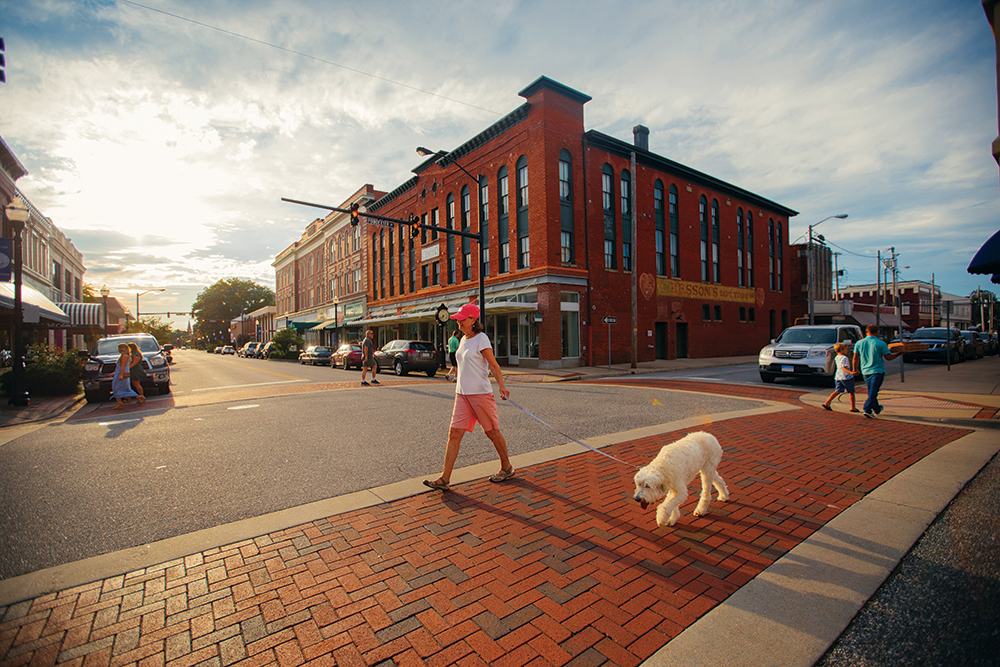
You should absolutely walk a mile in your potential city’s shoes and see where it takes you – and luckily, it’s easy to do this without even having to visit. The ability to walk to restaurants, bars, art exhibits and parks within a matter of minutes from your front door is an extremely valuable item on many people’s checklists for their perfect place because it means the city is lively and easily accessible.
To determine good walkability in a city, you can check out the city’s walk score or you can count how many different core business areas there are within the city – is there only one main walkable area in town, or are there multiple neighborhoods where this is a possibility?
- Walk along Freak Alley in Boise, ID, which is thought to be the largest outdoor art gallery in the Northwest.
- Chattanooga has carved out a reputation as an outdoor adventure hot spot. Still, it deserves points for walkability, too: the city’s downtown and many of its neighborhoods are well-connected and easy to navigate on foot or bike.
Why College Towns Usually Rebound Quickly (And 5 Great Ones to Check Out)
College towns consistently rank among the most economically resilient places in the country. Here’s why.
5. How’s the affordability?
Whether you’re leaving an extremely expensive city you can no longer afford or looking for a place to get more bang for your buck, affordability is one of the most important factors to consider when choosing a new city.
- For affordability, it doesn’t get much better than Meridian, ID , and Pueblo, CO , where you can get 1,800 square feet of house for less than $300,000 .
- Looking for a welcoming, growing city in the South? Check out Warner Robins, GA .
- Grand Forks, ND combines an affordable cost of living with an incredible array of job opportunities and a stable economy. Win-win-win.
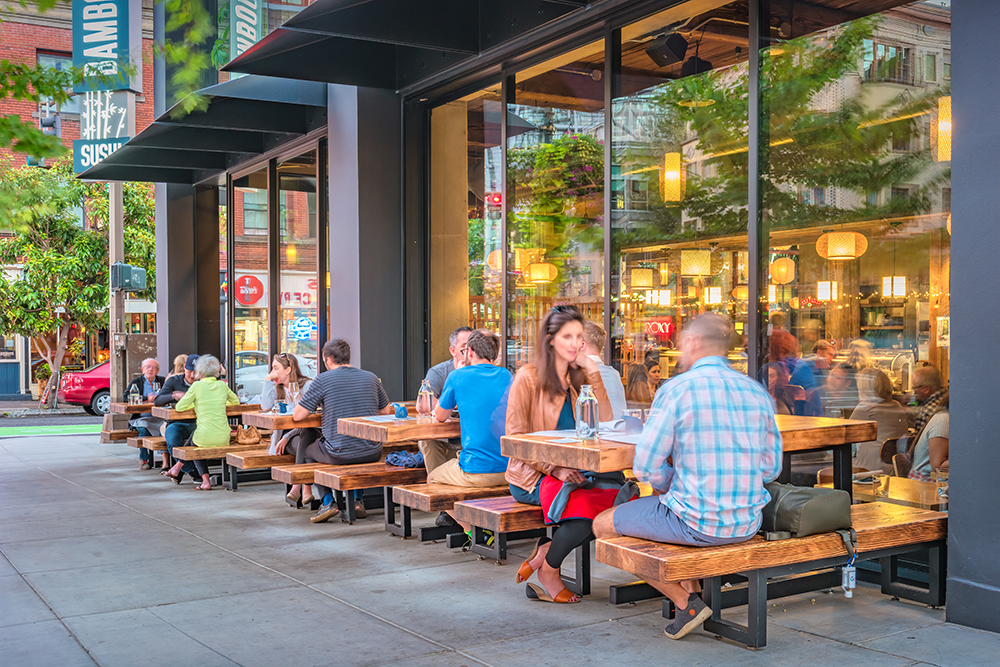
6. What is the city’s economy like?
To get a good idea of what a city has to offer business-wise, head to the respective city’s chamber of commerce page to check out what industries are the most prominent and what kind of Main Street activity it has.
- Interested in tech but not interested in living in Silicon Valley? Atlanta, GA , is the perfect spot for techies, thanks to nearby Georgia Tech and the city’s many startups .
- Nashville, TN , has proven itself to be resilient and creative in the face of turbulent economic times.
- Northern Kentucky’s economy stays strong and stable thanks to its vicinity to Cincinnati and a major airport.
- College towns tend to stay more stable and recover more quickly than other cities during economic downturns. Here are 5 of our favorites to check out.

7. What is the city’s library system like?
Free access to reading materials, entertainment and the internet has never been more important – and libraries are pulling out all the stops to meet the needs of their communities. Whether you like to browse, need help with your taxes or would like to participate in community events, the library in your city is the best place to start.
- Read to your heart’s content in Cincinnati, OH, whose library system has 11.7 million titles and a circulation of 21,226,498.
- Fort Lauderdale, FL not only has an amazing library system but plenty of sunshine and public spaces to lay out and read.
- Dayton, OH , has one of the most progressive, beloved and innovative public libraries in the country.

8. What access does it have to the arts?
Theater, art museums, orchestras and dance troupes take a city from a stack of concrete buildings to a place that feels very much alive with all the best things that we human beings have to offer. While scoping out towns, take a peek at the city’s art commissions, museums, historical centers and performance halls. Chat with locals about their favorite creative outlets or quirky subcultures.
- Though you might never have guessed, Oklahoma City’s art scene is dynamic, vibrant and, best of all, very weird.
- Muskegon, MI , has a creative energy that is inspiring, collaborative and fun.
- Pueblo, CO’s semi-secret neon museum is indicative of the city’s quirky, creative culture.
- Discover the diverse arts scene in Advantage Valley, WV – and thank us later!
- These seven cities have amazing public art for all to enjoy.

9. How are the schools?
If you have little ones (or plan on having them in the not-so-distant future), it makes sense to see what the public school system is like before you commit. Although many sites rank schools, it almost always makes more sense to have a personal conversation with local school principals and teachers, who could give you a complete picture of the school system. School rankings are based on achievement tests, which are correlated with poverty rates (or lack thereof) and not the students’ ability or the quality of the instruction.
- Franklin, TN , has one of the best school systems in the country.
- Iowa has long prioritized and funded public education, and the results speak for themselves .
How Far Should You Live From Your Family?
Determined to find an answer to this eternal question, we asked a group of experts to weigh in.
10. Is it near friends and family?
Sometimes, it just makes sense to go home again. Being near the support of friends and family can often make more sense than living thousands of miles away.

11. What are your hobbies? (And are there fellow hobbyists in the city?)
Whether you’ve picked up a new hobby or are strengthening an old one, being in a city with fellow knitting nerds or amateur ukulele players can feel more welcoming. Getting the scoop on the local groups is easy to do with sites like Meetup.com or even just browsing Facebook groups to see what’s available. Don’t see your particular hobby represented? An excellent way to make new friends is to start your own.
- Are you a history buff? Charleston, SC – and The Preservation Society of Charleston’s “Seven to Save” program – may just be the right fit for you.
- Into extreme sports? Southern Idaho ’s adrenaline-fueled outdoor scene is calling your name.
- East Central Indiana’s antique trails give pickers a packed itinerary every weekend.
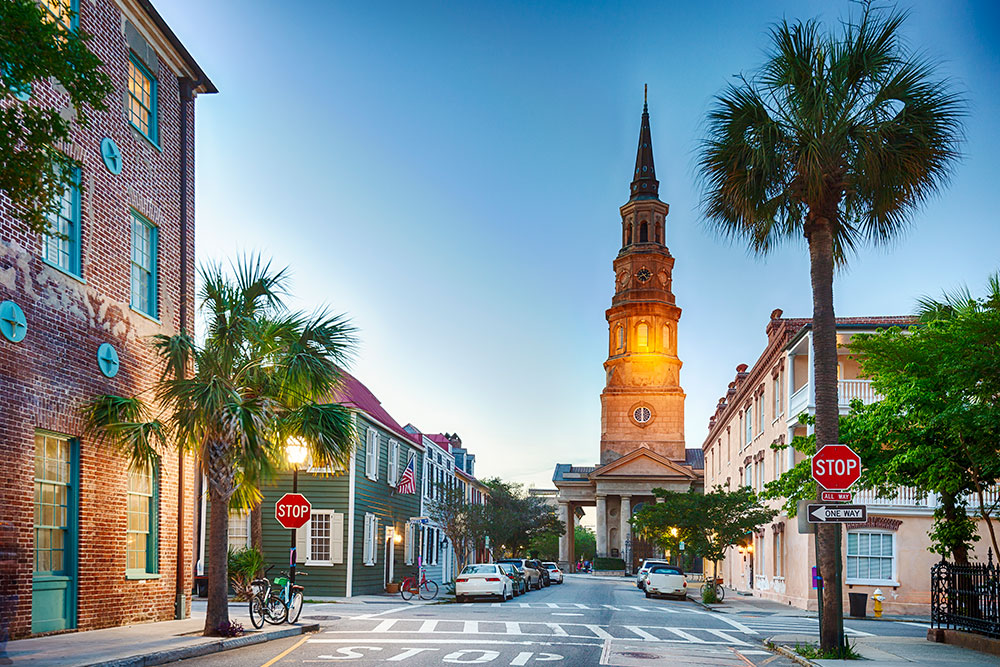
12. Is it easy to find a spiritual home?
For many, finding a new home means finding a new spiritual home in the community where they can worship or meet like-minded folks. Whether you’re looking for a place to take communion every Sunday or looking for a Mosque to pray in, the best way to seek a new spiritual home is to do a quick internet search for your chosen denomination or religion and then reach out to the ecclesiastical leaders of the place of faith.
13. Do you have any special health issues? Can the hospitals/providers support them?
If you’re planning a move, one thing you shouldn’t overlook is the number and quality of healthcare facilities in the area, especially if you have any particular health issues that need regular attention. Though it’s wise to ask your current doctor for a recommendation of a specialist in a new city if you have specific needs, a good way to get a sense of the overall healthcare offerings is to do a quick search on the American Hospital Directory , which will list all of the hospital systems in town and what facility type they are.
- With 15% of the population employed in the healthcare industry, the Dallas-Fort Worth metro area is a good bet if you have any highly specialized medical needs or if you’re interested in getting into the healthcare field yourself.
- Daytona’s Advent Health provides top-quality care to patients (and top-quality career opportunities to healthcare professionals).
- Rochester, MN is a diverse, welcoming community that has been shaped and bolstered by the legendary Mayo Clinic.

14. What kinds of foods do you like? Are there good restaurants/grocers for that?
What would Pittsburgh be without its pierogies and Austin without its queso? Part of the fun of exploring a new city is to try all of the new foods that come along with it, but checking out the local restaurant/specialty grocery scene can also make you feel more comfortable diving into the foodie scene headfirst. Looking to see if your prospective city has good vegan dining options? The best place to check out first is Instagram, which will provide a breadth of appetizing photos and locations for you to try.
- With locally sourced ingredients and a healthy community to serve, Castle Rock, CO’s food scene is burgeoning.
- Iowa City, IA is worth checking out for many reasons, but we wouldn’t judge you for moving there just for its breakfast scene .
- The Tex Mex in McAllen, TX , is hard to beat, and the city’s incubator kitchen helps new restaurant concepts grow and expand.

15. How is the coffee scene?
Would Lorelai Gilmore have stayed in Stars Hollow if not for Luke’s famous diner coffee? We’re not betting on it. Before you move, you should check to see how much of a caffeine buzz you can get in your potential new city – scouring sites like Yelp, Google and doing a deep dive on Instagram to see which coffee shop has the best latte art.
- Although you might not have guessed, Tampa, FL , is a coffee lover’s haven, which has an abundance of local roasters.
- These 10 Unexpectedly Awesome Coffee Cities won’t disappoint.
6 Questions to Answer Before Moving to a New City
Thinking about relocating? Here’s all the info you need to make your decision — and where to find it.
16. How does the city work to show empathy towards its citizens?
We’ve all gone through some unprecedented events since 2020, but it’s also shown us the resilience and kindness of the human spirit. When searching for a new place to live, don’t forget to look at the heart of its citizens – whether they are caring for the sick in the hospital, volunteering for local causes or just finding creative ways to entertain neighbors.
- The Iowa City Errand-ers proved that with just a tweet and some hand sanitizer, they could come together to help the most vulnerable populations in their city during the pandemic.
- Residents and newcomers find fulfilling connections in Elizabeth City, NC , thanks to people’s willingness to help their neighbors.
- Tennessee’s Williamson Inc held frequent webinars during the pandemic to help small businesses navigate PPP loans and other resources.
More To Read

Farmington, NM, Is Leading the Charge in the Future of Energy

10 Fun Things To Do Between Orlando and Daytona Beach

Something for Everyone in Northern Kentucky
Newsletter sign up.
Keep up to date with our latest rankings and articles! Enter your email to be added to our mailing list.
- Entertainment
- Newsletters
Coyotes' move to Salt Lake City elicits opposing responses in 2 cities
John Marshall
Associated Press
Copyright 2024 The Associated Press. All rights reserved
Arizona Coyotes Chairman and Governor Alex Meruelo, left, speaks as NHL Commissioner Gary Bettman, right, listens as they hold a news conference regarding a provision for Arizona to get an expansion team if a new arena is built within the next five years with the announcement of the current team relocating to Salt Lake City, Friday, April 19, 2024, in Phoenix. The Coyotes are officially headed to Salt Lake City after NHL Board of Governors voted Thursday to approve a $1.2 billion sale from Meruelo to Utah Jazz owner Ryan Smith, with Meruelo retaining the Coyotes' name, logo and trademark. (AP Photo/Ross D. Franklin)
PHOENIX – NHL Commissioner Gary Bettman sat next to the former Arizona Coyotes owner in a downtown Phoenix hotel meeting room, trying to put a positive spin on the funeral for a franchise.
Later Friday, Bettman sat next to the new Coyotes owner in Salt Lake City to bask in the excitement of the league's newest city and a fan base that had been itching for another team to join the NBA's Utah Jazz.
Recommended Videos
One day, two drastically different news conferences for the same hockey team.
"If you look back from the perspective over the last three decades, the NHL support for hockey in Arizona has been unwavering, to say the least,” Bettman said Friday in Phoenix. “And for anybody who’s been on that journey with us, there have been countless times when we could have made another decision and we didn’t. And so I hope everybody understands that this is a place that we believe hockey works.”
But only under the right circumstances.
Hockey worked in the desert for 27 years, albeit with some major potholes along the way.
In the Coyotes' 28th year since moving from Winnipeg, those ruts derailed the franchise and sent it to Utah.
His hand forced by self-inflicted and out-of-his-control circumstances, Alex Meruelo sold the Coyotes to the Smith Entertainment Group on Thursday, a deal approved unanimously by the NHL Board of Governors. The $1.2 billion deal gives SEG owner Ryan Smith control of the franchise's hockey operations, while Meruelo will keep the name and maintain business operations as he tries to build a long-awaited new hockey arena in Arizona.
Bettman approached Meruelo with a proposal to sell them team so it could play in an arena up to NHL standards — the 4,500-seat Mullett Arena is not — on March 6 and, despite initial hesitations, pulled off the deal in six weeks.
“We focused on the fact that these are the types of owners that we want, and this is the type of community we’d like to be a part of,” Bettman said. “For us, when the opportunity to come to Salt Lake City came, it was something we were very strongly focused on and something we wanted to accomplish — and to accomplish it was not easy.”
The deal elicited opposite responses in two states.
Utah fans have been expectedly excited, snapping up 11,000 season ticket deposits in the first few hours after the sale. Smith said that number had risen to 22,700 by Friday.
The yet-to-be-named team will already have a solid foundation in place, one poured by Coyotes general manager Bill Armstrong through an aggressive rebuild started three years ago. The team has a talented core, players like Clayton Keller, Logan Cooley and Dylan Guenther, pushing to get the franchise back to the playoffs — outside of the 2020 pandemic bubble — for the first time since the 2012 Western Conference Finals.
Utah fans met Bettman with roaring applause in Salt Lake City on Friday — a rarity for the commissioner — as clusters of people gathered outside the Delta Center to take pictures in front of new “NHL in Utah” signage.
“For Utah, I hope we carry the same strut in our step and the trust in ourselves that they (the NHL) have in us,” Smith said while seated next Bettman and his wife, Ashley. “It’s a big bet on us and I’m incredibly amazed but not surprised on how we show up. I've never seen so many Republicans and Democrats, religious leaders and education leaders all on the same page like this.”
Arizona fans were decidedly dejected and accusatory , claiming Meruelo and the rest of the Coyotes' management were deceitful about the team's yearly proclamations that it will remain in Arizona for the long haul.
The flickering light down at the end of the long tunnel is a promise the Coyotes franchise will be “reactivated” if a new arena is built within five years. Meruelo's group has its sights set on a June land auction for a tract of land in north Phoenix valued at $68.5 million, one they hope to develop into an entertainment district that will include a new arena.
“You have my commitment to do everything in my power to keep the Coyotes in the Valley. one of the few communities in the country with four professional sports teams,” Meruelo said. “This is a global sports market.”
One without a hockey team for the foreseeable future.
Associated Press writer Hannah Schoenbaum in Salt Lake City contributed to this report.
AP NHL: https://apnews.com/hub/nhl
Copyright 2024 The Associated Press. All rights reserved. This material may not be published, broadcast, rewritten or redistributed without permission.
‘Criminal Conspiracy’ Alleged as Jury Starts Hearing Trump Trial
Court adjourned for the day after opening statements from both sides and the start of testimony from the longtime publisher of The National Enquirer. A lawyer for Donald Trump told jurors the former president did nothing illegal.
- Share full article

Follow our live coverage of Trump’s hush money trial in Manhattan.
Jesse McKinley and Kate Christobek
Five takeaways from the fifth day of Trump’s criminal trial.
Monday marked another key moment in the criminal trial of Donald J. Trump: opening statements, during which the former president listened quietly to the prosecution’s allegations of crimes, and the defense’s counterargument that he was a simple man, wrongly accused.
The jury that will decide Mr. Trump’s case concentrated intently on the statements, which began the presentation of what will be weeks of testimony and other evidence, all in a tense courtroom in Lower Manhattan.
The presumptive Republican presidential nominee once more, Mr. Trump, 77, is charged with falsifying 34 business records in an attempt to cover up a payment to a porn star, Stormy Daniels, in the days before the 2016 election. Ms. Daniels, who may testify, says that she and Mr. Trump had a sexual encounter in 2006, a claim the former president denies.
Mr. Trump has also denied the 34 felony charges, calling them orchestrated by Democrats; if convicted, the former president could face probation or up to four years in prison.
Here are five takeaways from Mr. Trump’s fifth day on trial:
The prosecution has a big story to tell.
The charges faced by Mr. Trump may sound bland — “falsifying business records” doesn’t really set the heart racing — but the prosecution made clear on Monday that it plans on painting a much broader picture.
Matthew Colangelo, a prosecutor, laid out in his opening statement a tale that touched on tabloid journalism , tawdry affairs and covertly recorded phone calls . Jurors will likely be told about events inside fancy hotel rooms, Trump Tower and even the Oval Office. And the stakes? The presidency.
All that suggests that the case will keep jurors wide-awake during the six or so weeks it is projected to take. Indeed, when asked if they wanted paper and pens to take notes, more than half of the people in the jury box (12 jurors and six alternates) raised their hands.

Who Are Key Players in the Trump Manhattan Criminal Trial?
The first criminal trial of former President Donald J. Trump is underway. Take a closer look at central figures related to the case.
The defense wants to destroy prosecution witnesses.
Mr. Trump’s lead lawyer, Todd Blanche, used his opening statement to cast Mr. Trump’s actions leading to this case as run-of-the-mill business, and said that Mr. Trump is defending himself at trial, just as “any of us would do.”
He argued that the use of a nondisclosure agreement — the document Ms. Daniels signed after receiving the payment — was typical among the wealthy and the famous and “nothing illegal.” He continued that there was nothing wrong with trying to influence an election, adding: “It’s called democracy.”
Mr. Blanche also attacked Mr. Cohen, a former lawyer and fixer for Mr. Trump. He said Mr. Cohen, who pleaded guilty to federal campaign finance crimes in 2018, was a “criminal” who “can’t be trusted.” He added that Ms. Daniels was “biased” against Mr. Trump and made a living off her story about the sexual encounter.
He called the heart of the prosecution case just “34 pieces of paper” that don’t involve Mr. Trump.
Trump was muted during the abbreviated day in court.
On Mr. Trump’s way into the courtroom on Monday, he addressed reporters for about three minutes and blasted a range of perceived enemies, including New York’s attorney general, Letitia James, and the judge in a recent civil fraud case that resulted in a $454 million judgment against him.
But Mr. Trump’s behavior during opening statements reflected that he understood the gravity of the moment.
Mr. Trump made no outbursts during the prosecution’s opening statement, although he occasionally showed displeasure: He shook his head slightly at arguments that he orchestrated a scheme to corrupt the presidential election and then more strenuously when prosecutors said he was guilty of felonies.
During his own side’s opening statement, Mr. Trump sat largely motionless and expressionless watching his lawyer Mr. Blanche. Mr. Trump’s behavior was muted compared with his volatility during past Manhattan court appearances.
But at the conclusion of the trial day, Mr. Trump took his preferred spot in front of a television camera in the hallway, and spoke for more than nine minutes, attacking the prosecutor’s case — once again — as unfair.
David Pecker used to live on celebrity news. Now, he is the news.
Prosecutors’ first witness was David Pecker, the longtime publisher of The National Enquirer . He ambled to the stand and promptly gave a lesson in the ways of tabloid journalism, including the purchasing of articles — anything more than $10,000, he had to approve — and the significance of putting a famous face right out front.
“The only thing that was important is the cover of a magazine,” Mr. Pecker testified.
In about 30 minutes of testimony, Mr. Pecker also laid out trade secrets on sourcing, saying hotel workers and limo drivers could be a font of information on the rich and famous.
He seemed at ease: laughing at a prosecutor’s jokes, and sometimes directly addressing the jury just a few feet away.
We’re moving right along.
Over the past five trial days, the judge overseeing the case, Juan M. Merchan, has shown that he is eager to keep this trial on schedule. He seems serious about keeping his word to the jurors that the trial will last six weeks.
On Monday, truncated by a juror’s dental emergency and the Passover holiday, he decided to start with the first witness — Mr. Pecker — despite having only half an hour left on his schedule.
On Tuesday, the court will first consider a prosecution motion to hold Mr. Trump in contempt over recent comments that they say violated a gag order meant to keep him from attacking participants in the trial and their families.
Then, Mr. Pecker will continue on the stand, probably diving deeper into the “catch-and-kill” scheme used to buy up — and cover up — unflattering stories, a central element of the prosecution’s narrative.
Court will end early again, at 2 p.m., for further observance of Passover and then will have its weekly Wednesday break.
But there is little indication that as the weeks pass, Justice Merchan will let the pace slacken.
Jonah E. Bromwich and Kate Christobek
The opening statements gave a preview of how the two sides will present the case.
The Manhattan district attorney’s office and lawyers for Donald J. Trump presented opening statements to jurors on Monday, with prosecutors accusing the former president of entering a criminal conspiracy while the defense sought to discredit two key witnesses.
A prosecutor, Matthew Colangelo, began by telling jurors that Mr. Trump had conspired with his former fixer, Michael D. Cohen, and the publisher of The National Enquirer, David Pecker, to conceal damaging stories during his 2016 campaign.
“This case is about a criminal conspiracy and a cover-up,” Mr. Colangelo said, telling a story about a hush-money payment to a porn star and insisting that the former president was ultimately responsible.
In the end, Mr. Colangelo said, there would be “only one conclusion: Donald Trump is guilty of 34 counts of falsifying business records in the first degree.”
Immediately after Mr. Colangelo’s presentation, Mr. Trump’s lead lawyer, Todd Blanche, directly disagreed, insisting that the jury acquit the former president. Mr. Trump, he said, had engaged in actions that were legal and normal.
“President Trump did not commit any crimes,” Mr. Blanche told the jury, using the former president’s preferred form of address. The lawyer told jurors that Mr. Trump had earned the right to be referred to as “president” and reminded them that he was the presumptive Republican nominee.
Mr. Blanche argued that there was nothing illegal about nondisclosure agreements, which he said companies, the wealthy and the famous all use frequently. And, he said, prosecutors were wrong to suggest something criminal about Mr. Trump’s efforts to win the White House.
“I have a spoiler alert: There’s nothing wrong with trying to influence an election,” Mr. Blanche said. “It’s called democracy.”
Mr. Blanche asserted that Mr. Cohen, a key prosecution witness, was paid for legal services, and he attempted to undermine Mr. Cohen’s credibility. Mr. Blanche called Mr. Cohen a “criminal” who “can’t be trusted” and suggested that he was testifying only because he didn’t get a job in the Trump administration.
He also took aim at Stormy Daniels, the former porn star who claimed she had sex with Mr. Trump, characterizing her as an opportunist who had used a brief encounter with Mr. Trump related to his reality show, “The Apprentice,” to make huge sums of money.
He added that Ms. Daniels was “biased” against the former president and made a living off her story about the sexual encounter.
Mr. Blanche also sought to minimize the charges, saying the records at the heart of the case were just “34 pieces of paper” that the former president had nothing to do with.
Mr. Trump is accused of falsifying business records — which is a felony if prosecutors can show the records were altered with an intent to commit or conceal a second crime.
A year ago, when the former president was formally charged with 34 felonies, the district attorney, Alvin L. Bragg, told reporters that he did not have to specify what the second crime was, and listed three options. During opening statements, Mr. Colangelo made it clear he believed that the strongest case relied on one of those options: convincing jurors that Mr. Trump concealed the violation of a state law that forbids “conspiracy to promote or prevent an election.”

Justice Juan M. Merchan
Presiding Judge

Joshua Steinglass

Todd Blanche
Trump Lawyer

David Pecker
Former Publisher of The National Enquirer

Michael Cohen
Former Trump Lawyer and “Fixer”

Stormy Daniels
Porn Director, Producer and Actress
Advertisement
There’s some good news for people who want to follow the Trump trial in detail, but can’t make it to the courthouse. The New York state court system has just agreed to publish a transcript of each day’s proceeding by the end of the following day on its website. You can find the daily transcripts here .
Olivia Bensimon
Trump’s motorcade left the courthouse just after 1:05 p.m., wrapping up the trial’s first day of testimony. The view was blocked by an N.Y.P.D. dump truck, to many reporters’ great frustration. Inside Collect Pond Park, across from the courthouse, a lone pro-Trump protester’s “Trump for President ’24” banner flaps meekly in the light breeze.
Jonah Bromwich
The charges against Trump, which accuse him of falsifying records, are felonies because prosecutors say he sought to conceal another crime. Prosecutors had said before the trial that they had a menu of three crimes to choose from. The one they emphasized most strongly today is a violation of state election law: “conspiracy to promote election.” It’s not one of the actual charges, but they say it was baked into the overall crime.
And its worth emphasizing that when the district attorney, Alvin L. Bragg, was first asked about this, at a news conference directly after Trump was formally charged, he said that prosecutors did not have to specify which crime they were alleging Trump concealed. But today, Colangelo took the opposite tack: hitting the word “conspiracy” again and again.
William Rashbaum
With the trial now underway, here’s the People of the State of New York v. Donald J. Trump by the numbers: The case was born as “Investigation No. 2018-00403803 – Investigation Into the Business Affairs of John Doe.” That’s how the Manhattan district attorney’s office identified the six-year inquiry that led to today’s proceedings, with the number and name appearing on subpoenas and the correspondence case. Arrest No. M23613757 was given to Mr. Trump when he surrendered last year on April 4. And when the former president was arraigned later that day, his indictment was given a Docket Number, IND-71543-23, which the court system uses to track the case.
Nate Schweber
A courthouse park becomes a stage, and a sideshow, outside Trump’s trial.
Andrew Giuliani, the son of Donald J. Trump’s former lawyer and a regular strutting presence on the periphery of the courthouse where the former president is on trial, posed for photos inside Collect Pond Park.
Grinning and wearing a campaign jacket, Mr. Giuliani, who has made a career as a right-wing media figure, hugged supporters of Mr. Trump on Monday. From one, he borrowed a flag with Mr. Trump’s face that promotes him for president in 2024.
“Two-thousand twenty-four years in prison!” taunted Ricky Caballero, 56, from Brooklyn. “He owes your dad money. Why you out here supporting him?”
Mr. Caballero wore a tank top with a Puerto Rican flag. He said that was his heritage, and that he remembers watching Mr. Trump lob paper towels at survivors of Hurricane Maria in 2017. Mr. Caballero said he was still furious.
Mr. Giuliani circulated like a celebrity among Mr. Trump’s supporters and ignored Mr. Caballero.
It was one of a number of loud exchanges between supporters and detractors of Mr. Trump that were noticeably monitored by the police. There were no police in the park on Friday, when a man amid a mental health crisis burned himself to death in an anti-government protest.
On Monday, there were six community affairs officers and six regular uniformed officers watching closely for trouble.
At one point, the sound of the national anthem wafted through the park, courtesy of the flute-playing activist Marc Crawford Leavitt.
“I’m just playing and no one can argue with my playing patriotic songs,” he said, a sign decrying Trump as a liar hanging around his neck.
Anusha Bayya contributed reporting.
The judge leaves the stand. We are done with the jurors’ first day of trial.
Trump looks angry as he leaves the courtroom, again patting the bench behind him on the way out. His eyes scan over the reporters seated in the gallery as he goes.
The defense just told us that they did not learn who would be testifying first for the prosecution until about 3 p.m. yesterday. Prosecutors had declined to tell them earlier, given that Trump has made something of a habit of attacking witnesses.
I’m again struck at just how quickly we went today. We started late, and by the end of a very short day had finished both opening statements and started in on our first witness. This trial was expected to last six weeks. It may end even more quickly.
Jesse McKinley
A short day, but we got a sense of the details that the prosecution intends to offer in its case, and the contours of the defense. David Pecker was just starting, and will continue tomorrow at 11 a.m. There’s a hearing on possible gag order violations by Trump tomorrow morning at 9:30 a.m.
Maggie Haberman
Pecker is dismissed from the stand. We expect him back tomorrow.
Justice Merchan tells the jurors about the schedule and asks them, as he will before they leave the courtroom each time, not to discuss the case with anyone and not to read about it. He asks them to put it out of their minds.
Pecker greets someone at the defense table politely as he leaves the room. It’s not clear who.
As he answers Steinglass's questions, Pecker sometimes speaks directly to him, but other times he directs his comments to the jurors. Right now he's describing the types of people tabloids typically use as sources: hotel workers, limo drivers, lawyers.
Trump’s lawyers have sought to cast the tabloid that Pecker presided over as a media company like any other. But Pecker’s comment that they practiced “checkbook journalism,” and his description of their editorial practices, may undermine that argument, as we continue to hear about how the publication operated.
Checkbook journalism is one of the things that sets supermarket tabloids apart from more traditional news outlets.
Kate Christobek
Trump is leaning on the defense table as he listens to Pecker’s testimony. As Pecker talks about the editor meetings, Trump passes notes to two of his lawyers before glaring up at Pecker on the witness stand.
Steinglass has a banter going with Pecker as he asks Pecker to recount his work cell phone number at the time.
That may seem small but it’s important — it’s a good bet that those numbers will come up when evidence is presented.
Steinglass gets a loud cackle from Pecker while asking him his phone numbers. “This isn’t a quiz,” Steinglass says.
As Pecker begins to describe The National Enquirer's editor meetings, it again strikes me that these jurors have a really entertaining case before them. They will be taken into a lot of different environments — these editorial meetings, the Trump campaign and the Trump White House, and small meetings of New York operators in which, prosecutors will argue, the history of the country was shaped.
Jurors appear to be taking copious notes.
“We used checkbook journalism, and we paid for stories,” Pecker says of his time at The National Enquirer. Steinglass, the prosecutor, asks him whether he had "final say" over editorial decisions. Anything over $10,000 for a story, Pecker says, had to be approved by him.
Pecker says in his experience, the only thing that’s important “is the cover” of a magazine.
Michael Rothfeld
A look at how tabloids used ‘catch-and-kill’ to trade on the secrets of celebrities.
“Catch-and-kill” is a term coined by old-time tabloid editors for buying the exclusive rights to stories, or “catching” them, for the specific purpose of ensuring the information never becomes public. That’s the “killing” part.
Why would anyone want to spend money on a story that it never intends to publish? In the world of tabloid journalism, where ethical lines are blurry, deciding what to publish and why is often a calculus that covers favors doled out and chits called in.
David Pecker, the former publisher of The National Enquirer, who also oversaw other tabloids such as Star and lifestyle publications such as Men’s Fitness, was a master of the technique , according to people who have worked for him.
In 2003, Mr. Pecker’s company, American Media Inc., bought several muscle magazines founded by a mentor of Arnold Schwarzenegger, the bodybuilding legend and movie star. When Mr. Schwarzenegger, who was often featured in those magazines, jumped into the recall election to replace California’s governor, Mr. Pecker ordered his staff to buy up negative stories about him in order to protect his investment, former employees said.
Staff members called it “the David Pecker Project.” American Media paid $20,000 to a former mistress of Mr. Schwarzenegger so that she would not speak about their affair — though news of it had previously been published. The company paid another $1,000 to her friend and $2,000 to a man who had a video of Mr. Schwarzenegger dancing lewdly in Rio de Janeiro 20 years earlier. Mr. Schwarzenegger was elected governor.
Mr. Pecker’s publications made deals with other celebrities as well, though not always for money. He traded away dirt about the golfer Tiger Woods in exchange for an exclusive interview in Men’s Fitness in 2007, according to people with knowledge of that episode.
And, according to the prosecutors in the Manhattan trial of Donald J. Trump, Mr. Pecker employed “catch-and-kill” tactics in the 2016 presidential election, paying a doorman and a Playboy model to suppress negative stories about Mr. Trump and boost the candidacy of his longtime associate.
Justice Merchan has shown so far that he is eager to keep this trial on schedule. Court will be adjourned for the day in less than a half an hour, but yet the judge has chosen to start the first witness. He seems serious about keeping his word to the jurors that the trial will last six weeks.
What will be interesting about Pecker’s testimony, if it goes as opening statements suggested it would, is that he won’t really be describing Trump’s involvement in any actual criminal activity. Rather, he will serve as a tour guide to the seamy way in which Trump used The National Enquirer to his political advantage — a storytelling point on the way to alleged criminal activity.
And yet, prosecutors have framed Pecker’s involvement here as part of a “conspiracy.” This could be a risk for them — conspiracy is not one of the charged crimes. And this jury has at least two lawyers.
Who is David Pecker, the trial’s first witness?
The first witness in Donald J. Trump’s criminal trial is David Pecker, who was the publisher of The National Enquirer, and had traded favors with Mr. Trump since the 1990s.
Mr. Pecker, who was sometimes referred to as the “tabloid king,” had long used his publications to curry favor with Mr. Trump and other celebrities, in exchange for tips or for business reasons. Staff members called Mr. Trump, like other favored stars who were off limits, an “F.O.P.” — “Friend of Pecker.”
Mr. Trump and Mr. Pecker, along with Mr. Trump’s former fixer Michael D. Cohen, hatched a plan in August 2015 to boost his upstart presidential campaign, prosecutors say. The former Trump allies are each expected to take a turn on the witness stand, giving testimony that could help make him the first president convicted of a felony.
Prosecutors for Alvin L. Bragg , the Manhattan district attorney, will try to show that the hush money payment to a porn star at the center of the trial was part of a larger effort to suppress negative news about Mr. Trump to sway the election. That scheme, they will contend, includes two other deals, both involving Mr. Pecker.
Mr. Trump had announced his presidential campaign in June 2015. The plan the men laid out two months later was simple, according to court documents, interviews with people involved in the events or familiar with them, private communications and other records.
Mr. Pecker would use The Enquirer to publish positive stories about Mr. Trump’s campaign and negative stories about his rivals. He would alert Mr. Trump, through Mr. Cohen, when The Enquirer learned of stories that might threaten Mr. Trump. The Enquirer could buy the rights to those stories in order to suppress them, a practice known in the tabloid world as “catch and kill.”
In late 2015, Mr. Pecker’s company paid $30,000 to suppress a claim by a former doorman at a Trump building who said he had heard Mr. Trump fathered a child out of wedlock — a rumor that was apparently untrue.
Then in August 2016, The Enquirer’s parent company paid $150,000 to a former Playboy model, Karen McDougal, to keep her account of an affair with Mr. Trump quiet. Two months later, Mr. Pecker and The Enquirer’s editor helped Mr. Cohen negotiate a $130,000 hush-money payment to Stormy Daniels, the former porn star who also said she had sex with Mr. Trump. He has denied both women’s claims.
Mr. Cohen pleaded guilty to federal campaign finance crimes in 2018.
The Enquirer’s parent company, American Media Inc., made a deal that year to avoid federal prosecution, acknowledging that it had illegally tried to influence the election .
Merchan stops testimony, says he realizes jurors weren’t given writing materials to take notes. At least 10 raise their hands when asked if they’d like some.
This jury is an attentive crew, if the number of note-takers is any indication.
Joshua Steinglass, a prosecutor, will question Pecker. He begins by asking him how old he is, apologizing for asking the question. Pecker is 72, married for 36 years. He begins to talk about his biography, starting with his educational background.
David Pecker is the first witness for the prosecution, and their choice looks to be a good one for them. The National Enquirer’s master of “Catch and Kill,” he was part of the conspiracy that Colangelo described in his opening statement, working with Trump and Cohen to bury negative stories about Trump and publish negative ones about his rivals. He’s expected to tell the jury about his conversations with Trump and Cohen about killing the bad stories, including the one about Stormy Daniels. And he’ll provide much of the broad arc of the case – and the motive — corroborating elements of Cohen’s expected testimony along the way.
The judge instructs the people to call their first witness and as expected, they call David Pecker.
With opening statements and a witness, we are squeezing a full day into this half day. Pecker enters. He’s got a trim white mustache and is wearing a grey suit. His grey hair hits his collar. He heads to the witness stand and is sworn in with his hand raised.
Pecker has aged considerably over the last several years. He spells his name and gives his place of residence.
Trump has some support from a group of his lawyers — Alan Garten, the Trump Organization general counsel is here, and the pool reporters saw Alina Habba and Chris Kise in the hallway.
Meet the team defending Donald J. Trump in his criminal trial.
Donald J. Trump has assembled a team of defense lawyers with extensive experience representing people charged with white-collar crimes to defend him against the charges filed by the Manhattan district attorney’s office. Some have worked for Mr. Trump for years. Others are more recent additions, but are involved in the former president’s broader legal defense, also representing him in other criminal cases.
Here’s a look at Mr. Trump’s defense team:
Mr. Blanche started representing Mr. Trump last year, leaving a prestigious position as a partner at Wall Street’s oldest law firm to take him on as a client. He is also representing Mr. Trump in his federal classified documents case in Florida and his federal election interference case in Washington.
Mr. Blanche has also represented Paul Manafort, Mr. Trump’s former campaign chairman, as well as Boris Epshteyn, an adviser to Mr. Trump. Before turning to private practice, Mr. Blanche was a federal prosecutor in the Southern District of New York, where he supervised violent-crime cases.
Susan Necheles
Ms. Necheles has been a lawyer for Mr. Trump since 2021 and represented the Trump Organization during its criminal tax fraud trial in Manhattan. The business was convicted of 17 felonies and ordered by Justice Juan M. Merchan to pay the maximum penalty of $1.6 million.
Ms. Necheles previously represented defendants in major organized-crime and public-corruption cases, including Venero Mangano, the Genovese crime family underboss who was known as Benny Eggs.
Mr. Bove, the newest addition to Mr. Trump’s legal team, is a legal partner to Mr. Blanche. He is a former federal prosecutor for the Southern District of New York who turned to private practice and now represents defendants charged with white-collar crimes.
Gedalia Stern
Mr. Stern is a law partner to Ms. Necheles and also defended the Trump Organization in its criminal tax-fraud trial. He has previous experience representing clients charged with bribery, fraud and conspiracy.
If Trump testifies, he can be grilled about cases he lost and gag order violations.
The judge in Donald J. Trump’s criminal trial ruled on Monday morning that prosecutors could ask the former president about a range of previous cases that he has lost, as well as past violations of gag orders, in the event that he decides to testify in his defense.
Among other cases, the ruling by the judge, Juan M. Merchan, would allow prosecutors to question Mr. Trump about the civil fraud case brought by the New York attorney general, Letitia James, in which the former president was found to have inflated his net worth to obtain favorable loans. That case resulted in a $454 million judgment against Mr. Trump .
Justice Merchan will also allow the Manhattan district attorney’s office — which brought the case against Mr. Trump — to question him about civil cases brought by the writer E. Jean Carroll. Those cases found that Mr. Trump was liable for sexually abusing and defaming Ms. Carroll in the first instance and for defamation in the second. (Justice Merchan did not mention the sexual abuse finding, only the defamation, in his ruling regarding the Carroll cases on Monday.)
Justice Merchan will also let prosecutors ask about Mr. Trump’s attack on a law clerk in a civil fraud case , in violation of a gag order, as well as a 2018 decision that led to the dissolution of the Donald J. Trump Foundation to resolve a case brought by the New York attorney general at the time , Barbara Underwood, over financial irregularities.
The former president suggested in early April that he would testify in the criminal trial , saying that prosecutors “have no case.” That said, Mr. Trump has promised to testify in previous cases only to back out, and Justice Merchan’s decision could change his thinking on such a maneuver.
Justice Merchan said that, in the event that Mr. Trump did testify, he would give jurors “careful and specific” instructions about the scope of prosecutors’ queries, adding that he had “greatly curtailed” what specifics could be the target of questions.
However, Justice Merchan warned Mr. Trump that his ruling was “a shield and not a sword” and that the former president’s testimony could open “the door to questioning that has otherwise been excluded.”
Mr. Trump is being tried on charges that he falsified business records to cover up a hush-money payment to a porn star ahead of the 2016 election. He has denied the charges.
Meet the team prosecuting Donald J. Trump.
The Manhattan district attorney, Alvin L. Bragg, has assembled an accomplished team to take on perhaps the most high-profile case in his office’s history: the first criminal trial against former President Donald J. Trump. The group includes veteran prosecutors and former white-collar criminal defense lawyers who have extensive experience going up against Mr. Trump.
Here’s a look at the prosecution team:
Joshua Steinglass, Senior Trial Counsel
Mr. Steinglass, who has served as an assistant district attorney since 1998, is a recent addition to this case; in 2022 he helped lead the team that secured a conviction against the Trump Organization for conspiracy, criminal tax fraud and falsifying business records. He typically prosecutes significant violent crimes, such as a violent brawl on the Upper East Side that led to the conviction of two Proud Boy extremists in 2019.
Susan Hoffinger, Chief of the Investigations Division
After starting her career at the Manhattan district attorney’s office, Ms. Hoffinger founded her own firm and spent 20 years as a defense lawyer focusing on white-collar criminal defense. She rejoined the district attorney’s office in 2022 and worked with Mr. Steinglass to obtain the conviction of the Trump Organization in its criminal tax fraud trial.
Christopher Conroy, Senior Adviser to Investigations Division
A prosecutor for 28 years, Mr. Conroy previously led the Manhattan district attorney’s office’s major economic crimes unit, where he was involved in the prosecution of the bankrupt law firm Dewey & LeBoeuf and supervised investigations into multinational financial institutions for falsification of business records. Mr. Conroy is the longest serving member of this trial team.
Matthew Colangelo, Senior Counsel to the District Attorney
Mr. Colangelo joined the district attorney’s office in 2022 after serving for two years as a senior official at the U.S. Department of Justice. He previously worked for the New York attorney general’s office, where he oversaw the investigation into the Trump Foundation, which led to its dissolution . He was also, for a time, one of the lead lawyers on the civil fraud inquiry into Mr. Trump.
Rebecca Mangold, Assistant District Attorney
Before joining Mr. Bragg’s major economic crimes unit in 2022, Ms. Mangold clerked for a U.S. District Court judge in New Jersey and worked in private practice for over 10 years. As a partner at the law firm Kobre & Kim, Ms. Mangold focused on criminal and regulatory investigations related to financial misconduct.
Katherine Ellis, Assistant District Attorney
Ms. Ellis joined the Manhattan district attorney’s office in 2018 after working as an associate at Cleary Gottlieb Steen & Hamilton. Before becoming a lawyer, Ms. Ellis worked as a legal analyst at Goldman Sachs, the investment bank.
Ben Protess and Alan Feuer
The landmark case won’t play out in front of TV cameras.
The Manhattan criminal trial of Donald J. Trump will be closely followed around the world. But you will not be able to watch the proceedings on TV.
There will be no video feed aired live from the courtroom. Nor will there be an audio feed, as some federal courts allow.
New York courts generally do not permit video to be broadcast from courtrooms, although a feed is being transmitted into an overflow room for the reporters covering the trial. And cameras will be stationed in the hallway outside the courtroom to capture Mr. Trump’s remarks as he enters and leaves.
Shortly after court adjourned on Monday, the state’s chief administrative judge, Joseph A. Zayas, issued a statement saying that transcripts of each day of the trial would be published online by the end of the following day on the court system’s website .
Judge Zayas was responding to a request for public transcripts filed last week by a New York lawyer, Jim Walden, on behalf of a civic group and the news website New York Focus.
“With current law restricting the broadcasting of trial proceedings and courtroom space for public spectators very limited, the release of the daily transcripts on the court system’s website is the best way to provide the public a direct view of the proceedings in this historic trial,” Judge Zayas wrote in his statement.
Court will be in session, for the most part, every weekday except Wednesdays, from 9:30 a.m. to 4:30 p.m., until the trial ends.
Jonah E. Bromwich and Ben Protess
Here’s the latest in the trial.
Prosecutors in the first criminal trial of an American president began laying out their case for a jury of 12 New Yorkers on Monday, saying Donald J. Trump engaged in a conspiracy to cover up a sex scandal in order to get elected president in 2016.
The first witness called was the tabloid publisher David Pecker, whom prosecutors described as one member of a three-man plot to conceal damaging stories — including a porn star’s account of a sexual tryst — as Mr. Trump mounted his bid for the presidency.
Mr. Pecker was on the stand for only a few minutes in the afternoon before court adjourned for the day. He described how his publication, The National Enquirer, paid for stories, a practice he called “checkbook journalism.” He is expected to return to the stand on Tuesday.
Matthew Colangelo, one of the prosecutors for the Manhattan district attorney’s office, told the jury in his opening statement that the case was about “a criminal conspiracy and a coverup,” describing how Mr. Trump, his longtime counsel Michael D. Cohen, and Mr. Pecker engaged in a strategy to “catch and kill” negative stories.
The lead lawyer for Mr. Trump, Todd Blanche, insisted in his opening statement that the former president had done nothing wrong. “President Trump is innocent,” he told the jury. “President Trump did not commit any crimes.”
The case centers on a $130,000 hush-money payment that Mr. Cohen made to a porn star, Stormy Daniels, to buy her silence as the 2016 campaign was winding down. Prosecutors say he was reimbursed by Mr. Trump, and Mr. Trump falsified business records to conceal his conduct.
Mr. Colangelo said the payment to Ms. Daniels came on the heels of another scandal — the “Access Hollywood” tape, on which Mr. Trump bragged about groping women. Ms. Daniels’s account, he said, “could have been devastating to his campaign.”
He added, “With pressure mounting and Election Day fast approaching, Donald Trump agreed to the payoff and directed Cohen to proceed.”
Mr. Cohen, who was an executive vice president at the Trump Organization and counsel to Mr. Trump, and Mr. Pecker are expected to be central witnesses.
Mr. Blanche attacked Mr. Cohen’s credibility, saying that his livelihood hinges on attacking the former president, and insisted that prosecutors were attempting to present perfectly legal activities, such as entering into nondisclosure agreements, in a negative light.
He continued: “They put something sinister on this idea as if it were a crime. You’ll learn it’s not.”
Here’s what else to know about the trial:
The Manhattan criminal case against Mr. Trump was unveiled a year ago by the district attorney, Alvin L. Bragg. Mr. Trump was charged with 34 felony counts of falsifying business records and if convicted could face up to four years in prison . Those are felonies because prosecutors say Mr. Trump sought to conceal another crime. On Monday, they strongly emphasized a violation of state election law — conspiracy to promote election — that is not one of the actual charges, but they say is baked into the overall crime.
The case is the former president’s first criminal trial, although he has been indicted three other times in three other cities. With those other cases tied up in appeals and other delays, the Manhattan case may be the only one he faces before the 2024 presidential election. The trial is expected to last six weeks.
Before opening statements, the judge overseeing the case delivered a crucial ruling that determined what prosecutors can question Mr. Trump about should he decide to take the stand in his own defense. The ruling, a significant victory for prosecutors that might prompt Mr. Trump to decide not to testify, allows them to question him about several recent losses he suffered in unrelated civil trials, including a fraud case this year in which the former president was found liable for conspiring to manipulate his net worth and was penalized $454 million.
The jury was drawn from a pool of residents of Manhattan, where Mr. Trump is deeply unpopular; during jury selection, dozens of prospective jurors were excused because they said they could not be impartial. But the jurors who were selected each pledged to decide the case based only on the facts. Read more about them.
The case will receive vast media attention, but the proceedings won’t be shown on television .
Dismissed prospective jurors describe intense days in a glaring spotlight.
The two Manhattan residents were led into the courtroom to fulfill a foundational civic duty: to be interviewed as prospective jurors.
But in the room when they arrived was a defendant, Donald J. Trump, unlike any in American history.
Both would-be jurors, a man and a woman, were eventually excused. But the experience thrust them into the spotlight in a way they never had imagined.
One was challenged by Mr. Trump’s lawyers over his past social media posts relating to the former president. The other has a medical practice that she could not shut for six weeks while serving on the jury.
While they were not chosen as jurors, their experiences illustrate the intensity of the attention focused on Mr. Trump’s trial — and on the first jury to ever weigh the fate of a former United States president in a criminal proceeding.
Both contacted The New York Times only after they were excused from serving. Though the court’s rules protecting prospective jurors’ identities end when they are dismissed from serving, The Times is withholding their names and most identifying characteristics about them.
Like the other prospective jurors who were considered, both included detailed personal information on the juror questionnaires they filled out, including where they work.
They were made to answer those questions by speaking into a microphone in open court; soon, both were blindsided as details of their lives ricocheted around the internet. They said they were frustrated that so much attention was devoted to prospective jurors and ascertaining information about them.
While they later learned that the judge in the case, Justice Juan M. Merchan, had ordered the redaction of some of the information jurors were ordered to reveal publicly, they felt that he had acted too late. As with many things connected to the trial, the rhythms and even some of the parameters are being written in real time.
Their experiences mirrored some that other prospective jurors who were dismissed have described. One, a man who gave his name as Mark to NBC News, said he had “satirized Mr. Trump often in my artwork,” and because of that, he had expected not to be chosen.
A woman who gave her name as Kara, who said the nature of her job made serving extremely difficult, told NBC News that she realized the gravity of serving on any criminal jury, but particularly this one.
Seeing Mr. Trump in person, she said, was “very jarring.” He was, she realized, just “another guy.”
One of the prospective jurors who spoke with The Times, the man, did not immediately realize what case he was involved in when he was led into the courtroom on the 15th floor of the Manhattan criminal courthouse. The woman had a sense a week earlier, having read a news story about the trial beginning the week she was supposed to respond to a juror summons.
The man, sitting a few rows behind the prosecutors’ table when the two were part of the first panel of 96 prospective jurors brought into the courtroom Monday afternoon, felt a sense of calm about five minutes into being there. Trump was simply a defendant, he thought. It was a business-records trial. Prosecutors were on one side, the defense lawyers on the other.
The woman was struck by the fact that Mr. Trump stood and waved to prospective jurors, she said, as he and his lawyers were introduced to the group. It felt more to her like the behavior of a campaigning candidate than of a criminal defendant. (Mr. Trump, of course, is both.)
Both were put off by efforts by Mr. Trump’s lead lawyer, Todd Blanche, to assess prospective jurors’ views of Mr. Trump. The man said Mr. Blanche seemed “folksy” in a way he found disingenuous, while the woman was sharper, describing a “witch hunt” to root out people sympathetic to Democrats on the panel — a phrase Mr. Trump uses often to criticize the various prosecutors investigating his conduct.
The man in particular was frustrated that he was asked about past social media posts in which he had been critical of Mr. Trump, which Mr. Blanche’s team raised and which Justice Merchan ultimately agreed meant the man should be excused.
The man believed he could have been fair and resented the implication that he could not have been. Both he and the woman, who said they believed in the system of jury service, noted that they had begun the day taking sworn oaths vowing to render a fair and impartial judgment on the evidence. The man believed his own views — especially views from years ago — had no bearing on his ability to judge the evidence. If anything, he said, he would have been hyper-conscious in doing so.
Both had realized the magnitude of what serving on that jury would mean.
But they were also conscious of the threats and blowback that could come with weighing evidence against Mr. Trump — particularly with their personal details traceable in public. And both had concerns about being chosen because of that; the man in particular said his spouse had been worried.
Both would have valued being part of the historic trial. But both also had a sense of relief that they were not picked.
Dear Annie: My sons treat me like I don’t exist, therefore, I never see my grandchildren
- Published: Apr. 24, 2024, 5:30 p.m.

Annie Lane writes the Dear Annie advice column. Creators.com
DEAR ANNIE: I am a grandma, mammaw and granny to six amazing grandchildren. Two of my three sons have these children. My sons are constantly ignoring me. They treat me like I do not exist.
I raised them by myself after their father tragically passed away. I did my best to give them a great life. They all mean the world to me. I just need a little advice from you on how to find a way to see my grandchildren.
Any suggestions would be greatly appreciated. -- Heartbroken Mammaw.
DEAR HEART BROKEN MAMMAW: Be patient and continue to reach out to your sons and find out what their needs are. Do they need help with the kids, or are there sporting events you could attend? Tell your sons how much you desire a relationship with your grandchildren.
Grandparents can be a very positive influence on grandchildren’s lives, but the parents have to allow it. Grandparents tend to be more patient and have a little more life experience than parents who are with their children every day.
Send your questions for Annie Lane to [email protected] .
Latest Advice Columns
- Miss Manners: They talked about a friend who annoys them. Later, I realized they were talking about me!
- 1 in 5 Newark youths is ‘disconnected’ from work and school, report says
- Ask Amy: Should we take a flight with our 1-year-old or miss a family function to avoid the travel headache?
- Dear Abby: Spouse says husband leaves passive aggressive notes whenever she ‘does something wrong’
- Dear Annie: Stay off the grass ... our property is not a public walkway!
If you purchase a product or register for an account through a link on our site, we may receive compensation. By using this site, you consent to our User Agreement and agree that your clicks, interactions, and personal information may be collected, recorded, and/or stored by us and social media and other third-party partners in accordance with our Privacy Policy.

7 movies you'll want to see at this year's Dallas International Film Festival

The Dallas International Film Festival kicks off its 8-day run on Thursday.
The annual festival showcases screenings from some of the world's biggest film festivals. It also includes filmmaker panels, nightly red carpets and opportunities for filmmakers and audiences to gather and discuss film.
More than 140 films and shorts are on this year's schedule, including a number of documentary films.
Here are our can't miss picks.
BASTARDS OF SOUL (2023)
What it’s about: In 2020 the Dallas band, Bastards of Soul, was on the cusp of international stardom. It all came crashing down when the group was hit with the sudden death of their frontman, Chadwick Murray. Having made his mark primarily as a bass player, Chadwick's transition to lead singer was captivating, revealing a dynamism that few could have predicted. This film provides an intimate behind-the-scenes look at the band's final recording sessions, their lives, and their resilience through loss.
When to see it: Saturday, April 27, 7 p.m. - Downstairs at the Texas Theatre Q&A with members of the band follows the screening
Why you should see it: The concert footage and recording sessions are riveting, while the sequence of Chadwick Murray expressing his happiness at “finally getting it all" is absolutely heartbreaking. It all comes together to tell the perfect and tragic story of what might have been.
Water Wars (2024)
What it’s about: Nestled in the 'Valley of Hidden Waters' within the West Texas desert, Dell City thrives as a remote oasis. Yet, turmoil strikes as El Paso offers lucrative water deals to neighboring landowners. Dell City's close-knit community faces division due to new water board rules, alleged to be influenced by billionaires, locking them out of these opportunities. Dell City's ranchers embark on a legal battle against the influential water board, ultimately reaching the Texas Supreme Court. Water Wars narrates this small-town strife with statewide implications, prompting contemplation on the equitable sharing of life's most precious resource: water.
When to see it: Sunday, April 28 at 12:15 p.m. at Violet Crown Theater - Auditorium 1
Why you should see it: If you thought a stressed power grid is the biggest challenge facing Texans in the coming years, you’d be wrong. Having enough water to meet future supply needs, and where to find it, is actually at the top of the list. This pressing issue sets the stage for this David and Goliath story that poses the question – who really owns the water? It features the late Laura Lynch, founder of The Chicks, who's one of the ranchers at the center of the legal battle between ranchers, farmers and billionaires that went all the way to the Texas Supreme Court.
CITY OF HATE: DALLAS AND THE ASSASINATION 60 YEARS LATER (2023)
What it’s about: City of Hate reveals what Dallas was like 60 years ago when President Kennedy was about to visit the city. It's told by people who lived through it, including the filmmaker, who saw Kennedy just before the assassination, a documentary 60 years in the making.
When to see it: Friday, April 26, 5 p.m. at Violet Crown Theater - Auditorium 2 Q&A with the filmmaker follows the screening.
Why you should see it: There are many documentaries, feature films and books about the assassination of President Kennedy but few address how Dallas became known as the “city of hate,” a moniker that would take decades to shake. Filmmaker Quin Mathews chronicles the acrimonious atmosphere in Dallas leading up to the President’s visit here and how the city healed after his death.

PORCELAIN WAR (2024)
What it’s about: Under roaring fighter jets and missile strikes, Ukrainian artists Slava, Anya, and Andrey choose to stay behind and fight, contending with the soldiers they have become. Defiantly finding beauty amid destruction, they show that although it’s easy to make people afraid, it’s hard to destroy their passion for living.
When to see it: Saturday, April 27, 2:15 p.m. and Monday, April 29, 1 p.m. at Violet Crown Theater - Auditorium 2
Why you should see it: This Sundance Grand Jury Prize winner metaphorically uses porcelain to represent the Ukrainian people. As Slava points out, "Porcelain is fragile, yet everlasting. It can withstand extreme heat and even after thousands of years of being buried it can be restored." The delicate porcelain animals Slava and Anya create are part of their resistance against their oppressors because the stories they tell through their artwork ensure their culture will live on.

INHERITANCE (2024)
What it’s about: Explores the underlying causes of the opioid epidemic in America through the life of one boy and five generations of his extended family over 11 years. Curtis, a bright and hopeful boy, grows up from age 12 to 18 surrounded by love and struggle while every adult in his family - parents, grandparents, aunts, uncles, and cousins -- battles addiction. Curtis' America is an America where people and communities are struggling with an epidemic of substance abuse, joblessness and a deteriorating sense of belonging.
When to see it: Sunday, April 28 at 3:30 p.m. at Violet Crown Theater - Auditorium 3 and Monday, April 29 at 9:15 p.m. at Violet Crown Theater - Auditorium 4
Why you should see it: In this direct cinema view of the opioid epidemic, filmmakers Matt Moyer and Amy Toensing explore whether it's inevitable that a child growing up in an environment of the poverty, trauma and mental health issues will ultimately be an addict himself. Moyer and Toensing both have backgrounds in photojournalism having worked for National Geographic and other outlets. They're able to capture intimate and often heartbreaking scenes with the family that make you feel empathy instead of judgement.

PRINT IT BLACK (2024)
What it’s about: After the Robb Elementary school shooting in Texas, journalists from the local Uvalde Leader-News are the first on the scene to report the story. One of their own, reporter Kimberly Rubio, rises to national prominence as an advocate for gun reform after her ten-year-old daughter, Lexi, is killed in the shooting. Through the journalists’ reporting, we witness the social fabric of this small Texas town unravel as Kimberly and other victims’ families search for accountability from law enforcement and local leaders.
When to see it: Sunday, April 28 at 1 p.m. at Violet Crown Theater - Auditorium 5 and Monday, April 29 at 4:30 p.m. at Violet Crown Theater - Auditorium 4 - Q&A with filmmakers following the screening
Why you should see it: This film shines a light on the critical role local journalism plays. At a time when an average of 2.5 newspapers across the country go out of business each week, it’s important to remember that local newspapers are created by and for the people in your community.
SHAKING IT UP: THE LIFE AND TIMES OF LIZ CARPENTER (2024)
What it’s about: Over her 89 years, Liz Carpenter was often front and center where history was unfolding, leaving her own indelible mark on some of the most vivid moments and movements that shaped the twentieth century. Journalist, vice-presidential advisor, White House official, author, humorist, political activist, and feminist leader—hers is the story of blazing professional trails while pushing forward an agenda for women’s rights, political engagement, and the environment that remains highly relevant today.
When it’s showing: Friday, April 26 at 4:30 p.m. at Violet Crown Theater - Auditorium 1 - Q&A with filmmakers following screening.
Why you should see it: This documentary is a great reminder that opportunities for women didn’t just magically happen. Trailblazers like Liz Carpenter made them happen. Archival film, photos and interviews with journalists and scholars not only tell Liz’s story but also document the climb for women’s equal rights.
Visit Go See DFW to find even more events.
The Go See DFW calendar is a partnership between KERA and The Dallas Morning News.
Got a tip? Email Therese Powell at [email protected].
KERA Arts is made possible through the generosity of our members. If you find this reporting valuable, consider making a tax-deductible gift today. Thank you.
- Anniston/Gadsden
Kendra Scott x LoveShackFancy drops all-new line for preorder today only
- Updated: Apr. 24, 2024, 12:15 p.m. |
- Published: Apr. 24, 2024, 12:15 p.m.

The mega-hot collaboration between Kendra Scott and LoveShackFancy is open for pre-orders today only. But you will need to move fast because the line will see out fast. Kendra Scott/Canva
- Leada Gore | [email protected]
The mega-hot collaboration between Kendra Scott and LoveShackFancy is open for pre-orders today only. But you will need to move fast because the line will sell out fast.
Pre-orders are open until 9 p.m. CST or while supplies last. Items will be shipped in August.
Here are some of the favorites we found:
Bow Stud Earring – These Gold Stud Earrings with white crystals embody the fun, feminine aesthetic created by both brands. They add a feminine flourish to your spring outfit. $65
Gold Statement Earrings in Light Pink Iridescent Abalone – Turn up the drama with these head-turning pieces. - $150
Gold Elisa Necklace in Marie Pink Blooming Heirloom Illusion – This one is bound to be a hit. Hand-illustrated patterns from LoveShackFance decorate Kendra Scott’s iconic pendant shape with a mini bow dressing up the gold chain. Flip the pendant over to see an adorable bow. - $90
Kendra Scott x LoveShackFancy Gold Bow Necklace in White Crystal - A textured gold bow picks up extra sparkle with white crystal embellishments. Perfect for layering! - $90
Kendra Scott x LoveShackFancy Locket Necklace in Gold – More of the vintage vibe with this sweet locket in gold. Wear along with the Gold Bow Necklace for a classic yet fun look. - $90
Kendra Scott x LoveShackFancy Gold Charm Bracelet in Pink Mix - The Kendra Scott x LoveShackFancy Gold Charm Bracelet in Pink Mix features bow, heart, teacup, and locket-inspired charms on a gorgeous gold chain. - $98
If you purchase a product or register for an account through a link on our site, we may receive compensation. By using this site, you consent to our User Agreement and agree that your clicks, interactions, and personal information may be collected, recorded, and/or stored by us and social media and other third-party partners in accordance with our Privacy Policy.

COMMENTS
6. Take note of social interactions. Even if you're making a move that keeps you in the same state, the way people engage with each other can vary greatly from one place to another. There are cities known for being polite, some for being relaxed, others for being aloof, and even a couple known for being direct.
4. Ask Locals Questions. The best way for potential buyers to get a true feel for a new area before purchasing is to visit the neighborhood on various days and at various times. Shop at the local ...
2. Talk to locals. Before you make any plans, it can be extremely helpful to talk to people who live (or have lived) in that city. Ask them about the different neighborhoods, what people do on the weekends, etc. Get recommendations for restaurants, coffee shops, markets, etc. — and ask for them as if you're a resident, not a tourist. 3.
Moving to a new city can go one of two ways: You can either take a risk, throw everything to the wind, and see where you end up, or you can do your homework ahead of time, consider your options ...
I'll start with choosing a neighborhood, move on to finding an apartment, and then end with getting yourself set up in your new place. 1. Pick a Neighborhood. Your first task after you've decided where to move is to pick the neighborhood you want to live in.
4. Reach out to the experts for help. 5. Get lost. 1. Explore like a local. While downtowns and tourist-y areas can certainly tell you a lot about the vibe of a city, to truly get a feel for a place, you've got to venture beyond the shiny main streets and into the areas where residents actually live, work and play.
Read 6 simple steps to making friends in a new city. Making the move to a new home means meeting new neighbors and settling into a new community. Follow our checklist to help you plan for a visit around the neighborhood, research the schools, figure out the local transportation, and get involved and meet the neighbors.
9. MAKE A LIST OF GOALS. Make sure you know exactly why you're moving and what you're hoping to achieve. It's easy to lose focus in the chaos and excitement of setting up a new life once you ...
The fact is, moving is hard, and feeling at home in a new city can take a long time. Give yourself permission to ease into your new spot, and acknowledge any feelings of loneliness or homesickness ...
Liz Coughlin decided to make her "next big life move" a few years earlier than she originally planned. Living in Santa Monica and co-owning a real estate brokerage, she suddenly began doing more business in the Palm Springs area as a growing number of clients were looking to trade big cities for more peaceful retreats.. So, Coughlin made her own move to Palm Desert, where the real estate ...
5. "How easy is it to get around?". 6. "What outdoor recreation is available, and how easy is it to access?". 1. "What's the cost of living?". Knowing just how far your hard-earned dollar will go in a new city is a top priority when you're looking to relocate.
9. Family and friends. How to Choose a City to Move To. Whether you're looking for a more rewarding job, lower cost of living, better educational opportunities, or just a fresh start, there may come a time in your life when you're eager to move someplace new. You may be ready for new adventures and new experiences, willing to take on new ...
Before moving to a new city it's important to research the city you want to move to, visit before moving, and check out a few apartments before signing a lease. Hiring a moving company can help easy any stress of moving. After you move, you should find out about your new neighborhood and get out of your comfort zone and try new things.
10. Get ready for moving day. Confirm the date with your moving company, and make sure they have your contact information and any special directions. Figure out how you will pay the movers, including a tip. Gather your valuable items and make sure they don't get lost in the shuffle.
You complain all the time. Constant complaining about your living situation, your surroundings, your neighbors, and just about everything is one of the clearest signs you need to move to a new city. If you're always dissatisfied with something and every little thing about where you live seems to be bothering you, if you can't stand the ...
Cost of Living. A city's cost of living is an extremely important factor when choosing a city to call home. The cost of living should include everything from real estate prices and transportation to the average cost of groceries and dining out. The higher the cost of living, the more money you're going to need to earn in order to live ...
Initiate the packing project early, really early, and begin from the rooms that are the hardest ones to sort and pack (storage areas such as basement, attic, garage, spare rooms) due to the large number of items found in them. Top 20 packing tips for moving. 9. CHANGE your address.
The summer heat and humidity is no joke so you'll want to budget for an AC before moving to New York City. Air conditioners range between $300 to $1,000 depending on the model you get, so make sure you're aware of the expense. If helpful, here's the brand we use at home.
Making New Friends. 9. New city exploration. 10. Relocation Depression. Frequently Asked Questions (FAQ) Moving to a new city will always be a big step in a person's life - an adventure of some sort with an open ending where each decision - good or bad - will have a direct impact on how the relocation story ends.
Organize yourself with a moving spreadsheet. Moving involves multiple steps, including finding accommodations, packing your belongings, setting up utilities, and having your mail forwarded to your new place. Your first step when moving to a new location should be creating a comprehensive checklist that can be your source of truth as you ...
It's crucial to conduct an extensive study and develop a thorough plan before visiting a new city. Start by learning about the neighborhoods, cost of living, travel choices, and amenities of the city. To learn more about the personality, culture, and opportunities of the place, consult internet sources such as city guides, forums, and websites.
Drop those bags for a second and read on! 1. Proximity to Family. Even the most cynical person can agree that family and friends make life worthwhile. The backyard barbeques, movie nights, cross ...
Top 5 Best Cities to Move to in 2024 #1 Omaha, Nebraska. Score: 100 out of 100 According to our research, the overall best city to move to in 2024 is Omaha, Nebraska, which scored a perfect 100 ...
Want the best of city apartment living but without all of the expense? Cleveland's median rent for a one-bedroom is just $611. ... Before you move, you should check to see how much of a caffeine buzz you can get in your potential new city - scouring sites like Yelp, Google and doing a deep dive on Instagram to see which coffee shop has the ...
Los Angeles, California. Income needed: $111,659. Hourly wage needed: $53.68. Median rent per month: $2,791.48. While rent in the City of Angels is surprisingly more affordable than other major ...
The $1.2 billion deal gives SEG owner Ryan Smith control of the franchise's hockey operations, while Meruelo will keep the name and maintain business operations as he tries to build a long-awaited ...
You'll learn it's not." Here's what else to know about the trial: The Manhattan criminal case against Mr. Trump was unveiled a year ago by the district attorney, Alvin L. Bragg.
By. Annie Lane. DEAR ANNIE: I am a grandma, mammaw and granny to six amazing grandchildren. Two of my three sons have these children. My sons are constantly ignoring me. They treat me like I do ...
Published April 24, 2024 at 12:00 PM CDT. 7:37 Films, LLC. Screen shot of the 2024 documentary film Bastards of Soul, featuring the late Chadwick Boseman, lead singer of the band. The Dallas ...
The mega-hot collaboration between Kendra Scott and LoveShackFancy is open for pre-orders today only. But you will need to move fast because the line will sell out fast. Pre-orders are open until ...